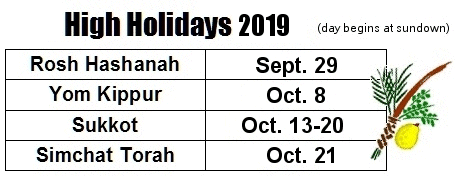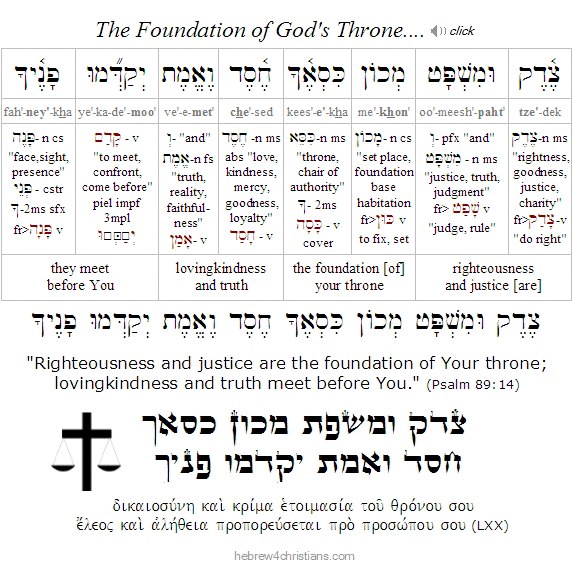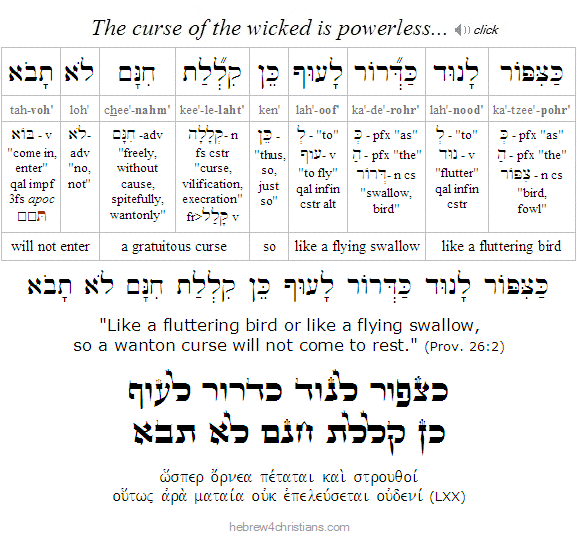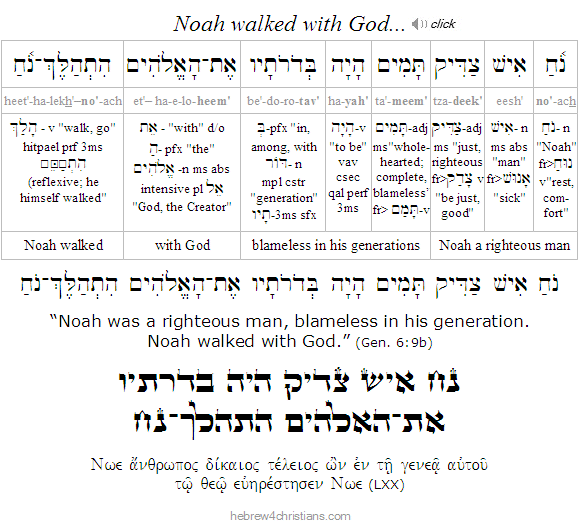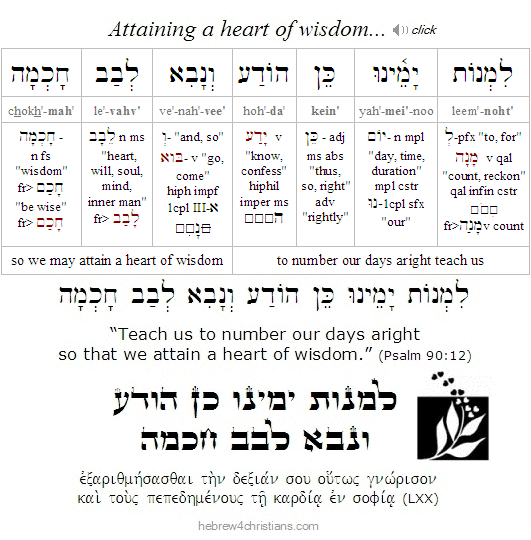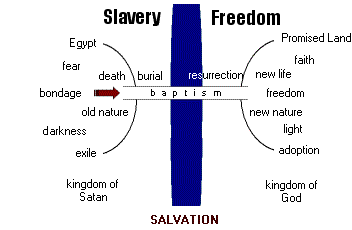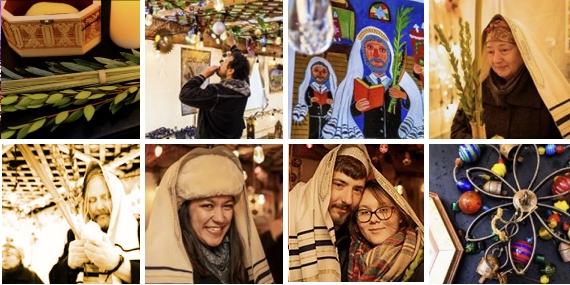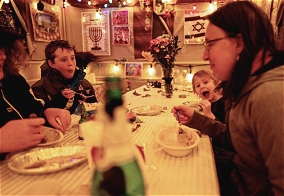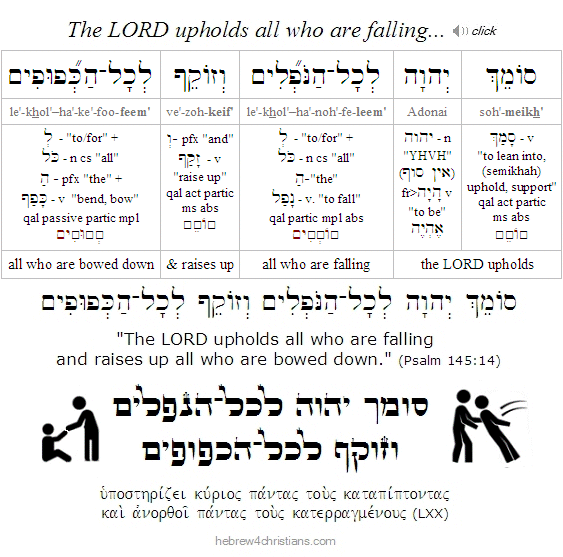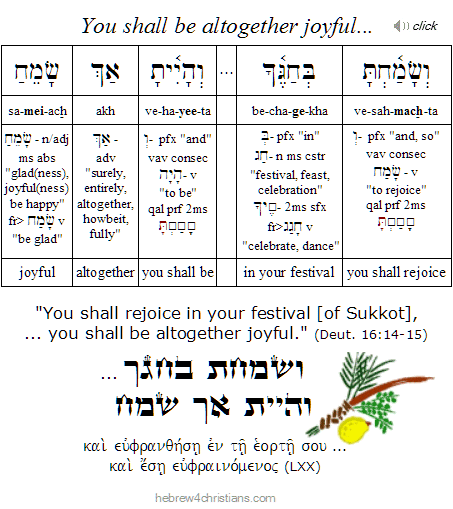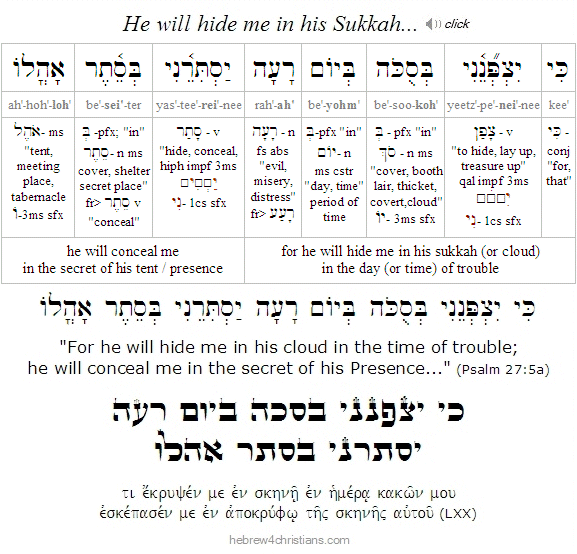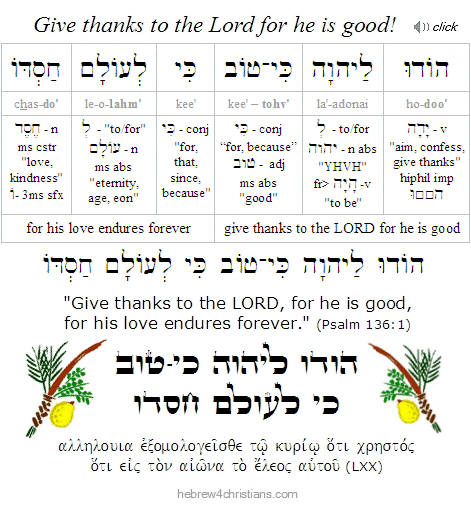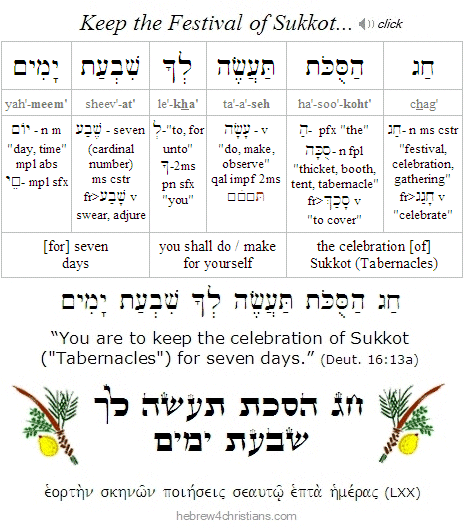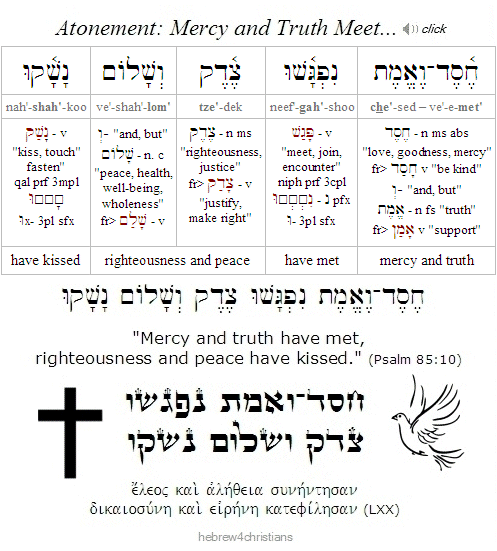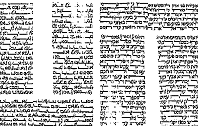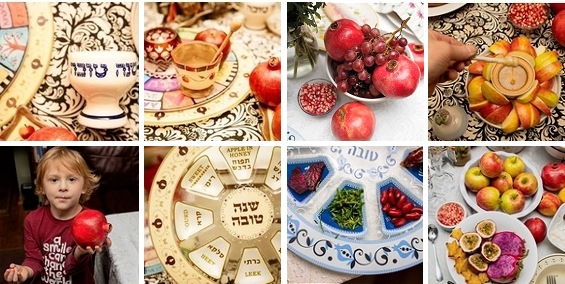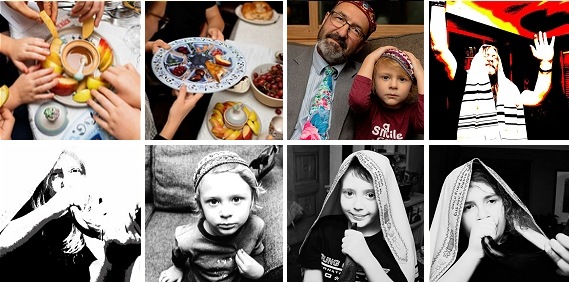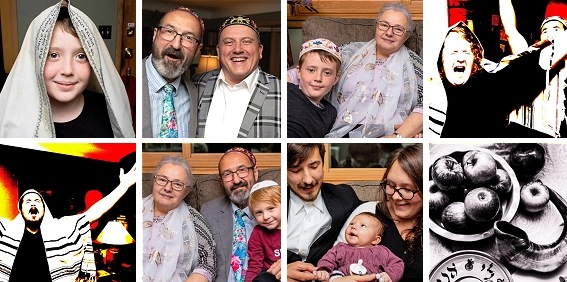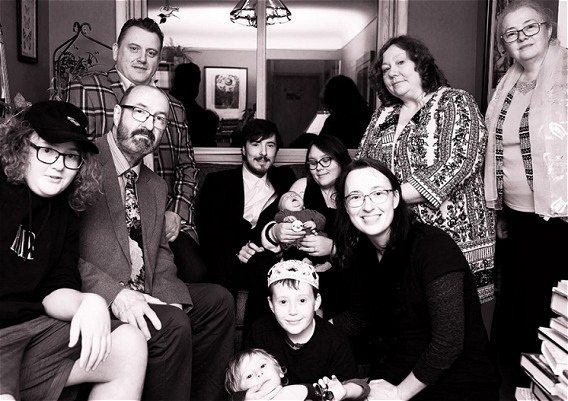|
Jewish Holiday Calendar
October 2019 site updates, please scroll past this entry....
The Torah divides the calendar into two symmetrical halves: the Spring and the Fall, indicating the two advents of Messiah. The Biblical year officially begins during the month of the Passover from Egypt (called Rosh Chodashim, see Exod. 12:2), and the spring holidays of Passover, Unleavened Bread, and Firstfruits both recall our deliverance from Egypt and also our greater deliverance given by means of the death, burial, and resurrection of the Messiah, the great Passover Lamb of God. Yeshua was crucified on erev Pesach, buried during Unleavened Bread, and was resurrected on Yom Habikkurim (Firstfruits). The holiday of Shavuot (i.e., "Pentecost") both commemorates the revelation of the Torah at Sinai as well as the revelation of the Ruach HaKodesh (Holy Spirit) at Zion, in fulfillment of the promise given by our Lord....
The intermediate months of summer end with the advent of the sixth month of the calendar, called the month of Elul, which recalls the time Moses interceded on behalf of Israel after the sin of the Golden Calf. To commemorate this time of our history, we likewise focus on teshuvah (repentance) in anticipation of Rosh Hashanah and especially in anticipation of Yom Kippur, the great "Day of Atonement." In Jewish tradition the 30 days of Elul are combined with the first ten days of the seventh month (called the "Days of Awe") to set apart "Forty Days of Teshuvah" leading up to the Day of Forgiveness for Israel. Immediately following Yom Kippur, the mood changes as we begin preparing for a joyous week-long celebration called Sukkot (i.e., "Tabernacles") that concludes with the holiday of Simchat Torah.
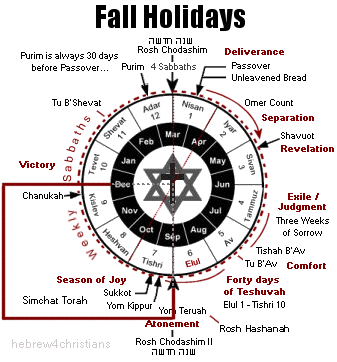 |
The Fall Holidays:

The fall festivals prophetically indicate the Day of the LORD, the second coming of Yeshua, the great national turning of the Jewish people, and the establishment of the reign of the Messiah upon the earth during the Millennial Kingdom in the world to come.
Note that in accordance with tradition, holiday dates begin at sundown. Moreover, some holidays may be postponed one day if they happen to fall on the weekly Sabbath:
1. Month of Elul (Fri. Aug. 30th [eve] - Sun. Sept. 29th [day])
2. Month of Tishri (Sun. Sept. 29th [eve] - Mon. Oct. 28th [day]) - Fall holidays begin
3. Month of Cheshvan (Mon. Oct. 29th [eve] - Wed. Nov. 27th [day])
- Four Sabbaths: Noach, Lekh-Lekha, Vayera, Chayei Sarah
- Yom Ha'Aliyah - Honoring Israel's immigrants (Mon. Nov. 5th; Cheshvan 7)
- Sigd - 50th day after Yom Kippur; Ethiopian Jewish holiday (Tues. Nov. 26th)
4. Month of Kislev (Wed. Nov. 27th [eve] - Fri. Dec. 27th [day])
- Four Sabbaths: Toldot, Vayetzei, Vayishlach, Vayeshev
- Winter Solstice: Fri. Dec. 21st Kislev 23)
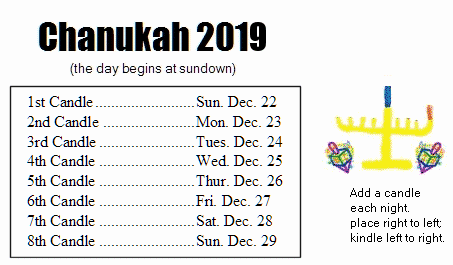
- Dates for Chanukah 2019 (5780):
- 1st Chanukah candle - Sun. Dec. 22nd [i.e., Kislev 25]
- 2nd Chanukah candle - Mon. Dec. 23rd [i.e., Kislev 26]
- 3rd Chanukah candle: Teus. Dec. 24th [i.e., Kislev 27]
- 4th Chanukah candle: Wed. Dec. 25th [i.e., Kislev 28]
Christmas: Wed. Dec. 25th (Kislev 28, 5780)
- 5th Chanukah candle: Thurs. Dec. 26th [i.e., Kislev 29]
5. Month of Tevet (Fri., Dec. 27th [eve] - Sun. Jan. 26th [day])
- Four Sabbaths: Miketz, Vayigash, Vayechi, Shemot
- Dates for Chanukah (continued):
- 6th Chanukah candle: Fri. Dec. 27th [i.e., Kislev 30] (Chodesh Chanukah)
- 7th Chanukah candle: Sat. Dec. 28th [i.e., Tevet 1]
- 8th Chanukah candle: Sun. Dec. 29th [Tevet 2] Zot Chanukah
- Asarah B'Tevet - Tues. Jan. 7th (dawn), 2020; fast over the seige of Jerusalem
- Secular New Year: Wed. Jan. 1st, 2020 (Tevet 4, 5780)
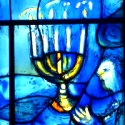 |
Note: For more about the dates of these holidays see the Calendar pages....
October 2019 Updates
Wholehearted with God...
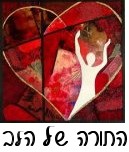
10.31.19 (Cheshvan 2, 5780) In the Torah we read, "Keep yourselves away from a false matter" (Exod. 23:7). In this connection note that the Hebrew word for falsehood (or lie) is sheker (שֶׁקֶר), which can be rearranged to spell kesher (קֶשֶׁר), meaning a band, gang, or group of people... The power of the lie is often found in the "group" rather than in the individual, and if enough people in a group repeat something untrue, eventually the individual's conscience will be overruled and the truth will be lost... This is a common methodology regularly employed by mass media for purposes of political propaganda.
Regarding this commandment Abraham Twerski comments that it means we should act in a way that will not move us to "hide," and that includes hiding within the anonymity of the crowd. "Think about what you are about to do. Is there a possibility that you may at some time have to deny that you did it? If so, then do not do it" (Twerski on Chumash).
Each of us must individually strive to be yashar (יָשָׁר) - upright and honest, and free from the complications and devious speech that attends to lies. We are to be "simple" (תָּמִים) with the LORD our God (Deut. 18:13), which requires that we are first willing to be rigorously honest with ourselves. A favorite quote of mine: "No person is saved except by grace; but there is one sin that makes grace impossible, and that is dishonesty; and there is one thing God must forever and unconditionally require, and that is honesty" (Kierkegaard).
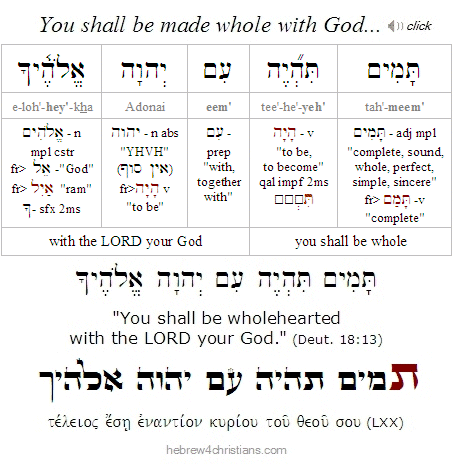 |
Reformation Day...
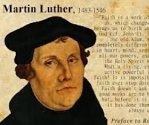
[ October 31st is recognized as "Reformation Day" among many Protestant denominations... ]
10.31.19 (Cheshvan 2, 5780) Though the Protestant Reformation surely did not rectify everything in the institutionalized churches of the medieval West, it did rediscover the central soteriological fact of the Torah that "salvation is from the LORD" (יְשׁוּעָתָה לַיהוָה) and that the righteousness of God is received by faith in his finished work for us, not by religious rituals or acts of personal righteousness (Gen. 15:6; Hab. 2:4; Gal. 3:11; Titus 3:5). As the Apostle Paul explained by citing from the Torah, Abraham "staggered not at the promise of God through unbelief but was strong in faith, giving glory to God; and being fully persuaded that, what He had promised, He was able also to perform: and therefore it was imputed to him for righteousness" (Rom. 4:19-22). The righteousness of God is central (τῇ δικαιοσύνῃ τοῦ θεου). Simply put, we should be grateful for the Protestant Reformation since it was a first step toward the recovery of the Jewish roots of our faith in Yeshua the Messiah...
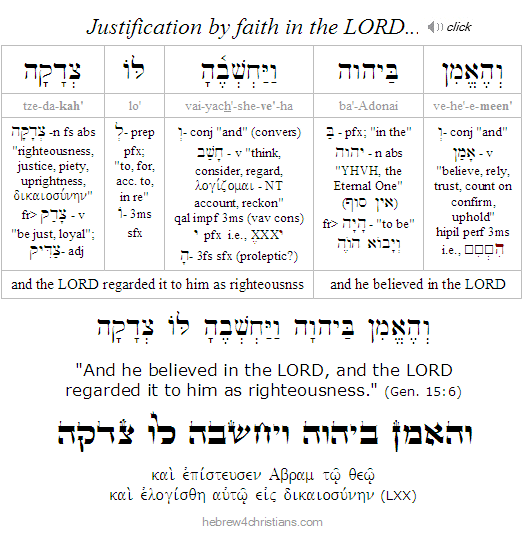 |
 |
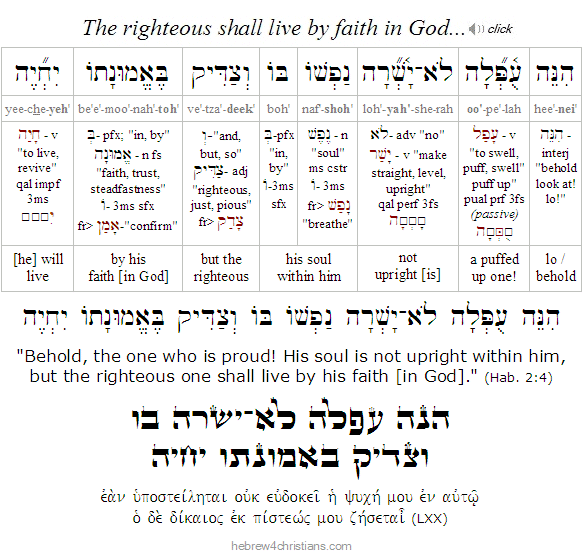 |
Note: As you can see, literally thousands of years before the "Reformation" of the western institutionalized (i.e., "Roman") church, the Torah emphatically taught that people are "justified by faith" in God's promises, as indeed the very First Commandment of the Torah attests (to wit, "I am the LORD your God" - אָנֹכִי יְהוָה אֱלֹהֶיךָ). Shalom, chaverim.
No Other Savior...

10.31.19 (Cheshvan 2, 5780) Philip said to him, "Show us the Father and we will be satisfied." Yeshua replied, "Have I been with you so long, and you still do not know me, Philip? Whoever has seen me has seen the Father. How then can you ask, 'Show us the Father'? (John 14:8-9). Yeshua – and Yeshua alone – reveals the heart and truth of God to us, and looking for God "beyond" Him – up in heaven, across the sea, or in the mysteries of unfathomable forces that pervade reality – is ultimately a sign of unbelief and a denial of God Himself. The Father and the Son are of one essence and trying to separate them vitiates the message of Yeshua and makes it appear unfinished....
On the contrary, the work of salvation is indeed finished, and "Whoever has the Son has the life (החיים); but whoever does not have the Son of God does not have the life" (1 John 5:12). There is no other way to access the heart of the Father than through Yeshua, and Yeshua is the Name above all other names for salvation (John 14:6; Acts 4:12; Phil. 2:9-11; John 17:3). Every knee shall bow to Him, and there is no other Savior (Isa. 45:21-24; Rom. 14:11). Those who honor the Son also honor the Father and understand the heart of creation (John 5:23).
To know God is to know the revelation given in the Son, for the Son is God clothed in human skin, reaching out in compassion to heal the trusting sinner from eternal alienation. Just as the Angel of the LORD is the "King of Angels," the manifestation of God in angelic form, so the Son of Man is the manifestation of the LORD in human form. Yeshua is the language of God to humanity (Heb. 1:2). There is no other Savior; there is no further place to ascend or to seek: Yeshua is the Beginning and End of the Truth of the Compassion of the Eternal God. Let us resolve, then, that with all our heart, with all our soul, and with all that is within us, we shall express the truth of God's kingdom and the truth of His salvation. Amen.
"Many people love falsehood and only a few love truth. For it is possible to love falsehood truly, but it is impossible to love truth falsely" (R' Yaakov of Pshischa). May the LORD God of truth (יהוה אֵל אֱמֶת) help us to love truth truly, then, with all our hearts, since love and truth characterize God's rule: As it is written, "Righteousness and justice are the foundation of your throne; lovingkindess and truth meet before you" (Psalm 89:14).
אֱמֶת מֵאֶרֶץ תִּצְמָח
וְצֶדֶק מִשָּׁמַיִם נִשְׁקָף
e·met · me·e·retz · teetz·mach
ve·tze·dek · mee·sha·ma·yim · neesh·kaf

"Truth springs up from the ground,
and righteousness looks down from the heavens"
(Psalm 85:11)

Truth springs up everywhere; righteousness shines down over all the earth. This primarily concerns the sacrificial work of the Messiah, of which it is rightly said: "Steadfast love and faithfulness meet; righteousness and peace kiss each other" (Psalm 85:10). Because of the great reconciliation we have through Yeshua, the truth of God shall prevail among men. The "Seed" that was planted in Zion and becomes a Tree of Life throughout all the earth. "Deliverance goes before the LORD, and prepares a pathway for Him" (Psalm 85:13).
We have a moral imperative, given by God Himself, to receive the truth and to live according to the nature of spiritual reality. Those who reject or suppress the truth, however, are responsible for their actions, as it is written, "No one who practices deceit shall dwell in my house; no one who utters lies shall continue before my eyes" (Psalm 101:7).
Turning away from Evil...
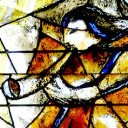
10.31.19 (Cheshvan 2, 5780) Contrary to the vain philosophy of this fallen world, the essence of love hates what is evil; just as it is hateful to be "tolerant" of what is wicked... Followers of Yeshua must love the truth and abhor the lie. Tolerating sin in a world ripe for judgment is a tacit form of "collaboration" with the enemy... Indeed, the only thing regarded as intolerable in the devil's world is the objection that people have a supposed "liberty" to sin. But the LORD is clear on this point: those who call evil good and good evil are subject to divine wrath and judgment. Therefore we are enjoined: "O you who love the LORD, hate evil" (Psalm 97:10). Yes, hate what is evil and love what is good (Amos 5:15). As King David said, "Do I not hate those who hate you, O LORD? And do I not loathe those who rise up against you? I hate them with complete hatred; I count them my enemies" (Psalm 139:21-22). The connection between loving God and hating evil is repeated in the New Testament: "Let your love be genuine (ἀνυπόκριτος, without a "mask" put on): abhor what is evil; cling to what is good (Rom. 12:9). If we truly love the LORD, let us walk in the awe of His great Name by hating what is evil.
Every day we make decisions regarding good and evil, and therefore every day we are deciding (i.e., proclaiming, teaching, attesting) what we love and what we hate. Choosing not to chose is itself a choice.... The issue is not whether we love or whether we hate, but what we love and what we hate.
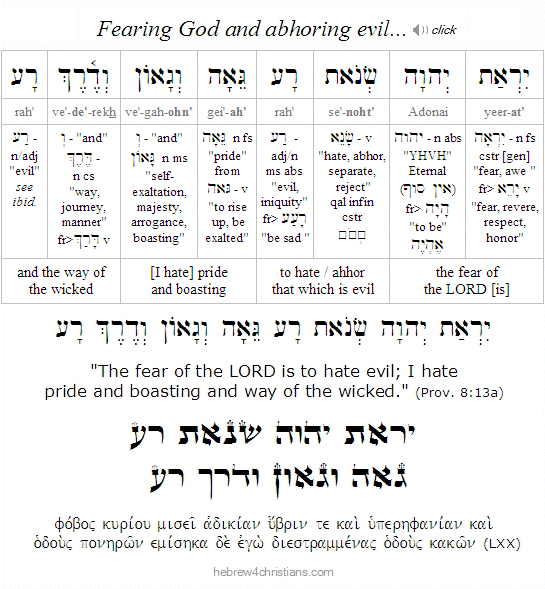 |
The Scriptures do not mince words with this issue. "There are six things that the LORD hates, seven that are an abomination to him: haughty eyes, a lying tongue, and hands that shed innocent blood, a heart that devises wicked plans, feet that make haste to run to evil, a false witness who breathes out lies, and one who sows discord among brothers" (Prov. 6:16-19). "I hate and abhor lying, but I love Your law" (Psalm 119:163). "Take no part in the works of darkness, but instead expose them" (Eph. 5:11). The cross of Messiah is meaningless if God does not really hate sin, violence, and evil... The heartcry of the tzaddik adjures: "O you who love the LORD, hate evil" (Psalm 97:10).
Flee from the Wrath to Come...
Any culture that glorifies violence, despises moral authority and spiritual truth, and that tolerates injustice is under divine judgment. Indeed, throughout the Scriptures "Sodom" symbolically represents gross immorality, depravity, and therefore ineluctable self-destruction. For example, the prophet Ezekiel later wrote of Judah: "Behold, this was the guilt of your sister Sodom: she and her daughters had arrogance, abundant food, and careless ease, but she did not help the poor and needy. Thus they were haughty and committed abomination (תּוֹעֵבָה) before me; therefore I removed them when I saw it" (Ezek. 16:49-50). The New Testament refers to the fate of Sodom as "a fearful example of the everlasting fire of retribution" (Jude 1:7) -- the destructive result of spiritual anarchy, lawlessness, sexual perversion, and trauma (2 Pet. 2:6-10). Thankfully there is real hope for those who seek to escape from the wrath to come by turning to God and trusting in his healing power of salvation, though it is only a "remnant" that find true deliverance (Matt. 7:14). Speaking of the final salvation of Israel, the Apostle Paul quotes Isaiah: "If the LORD of Hosts hadn't left us a few survivors, we'd be as desolate as Sodom, doomed just like Gomorrah" (Isa 1:9; Rom. 9:29). Flee from the wrath to come; find your refuge in Yeshua the LORD!
Wantoness of the Wicked...

10.31.19 (Cheshvan 2, 5780) Regarding the pagan holiday of "Halloween," remember that there is no "spell" or evil incantation (i.e., nachash: נַחַשׁ) effective against Jacob, there is no sorcery (i.e., kesem: קֶסֶם) against Israel. At this time it must be said of Jacob and of Israel, 'Look at what God has done (מַה־פָּעַל אֵל)' [Num. 23:23]. No weapon formed against God's people shall prosper (Isa. 54:17), and the curse of the wicked is powerless against the tzaddikim (Prov. 26:2). Ein od milvado (אֵין עוֹד מִלְבַדּו) - God is the only true Power (Deut. 4:35; 1 Chron. 29:11; Rev. 4:11). Satan is an impostor and a foiled usurper. As Yeshua told his followers, "Behold I give to you authority (ἐξουσία) to tread on serpents and scorpions and over all the power of the enemy (καὶ ἐπὶ πᾶσαν τὴν δύναμιν τοῦ ἐχθροῦ), and nothing shall by any means hurt you" (Luke 10:19). Like Balaam and Haman, all who curse God's people or attempt to foil His plans will be upended... Hallelujah and Amen.
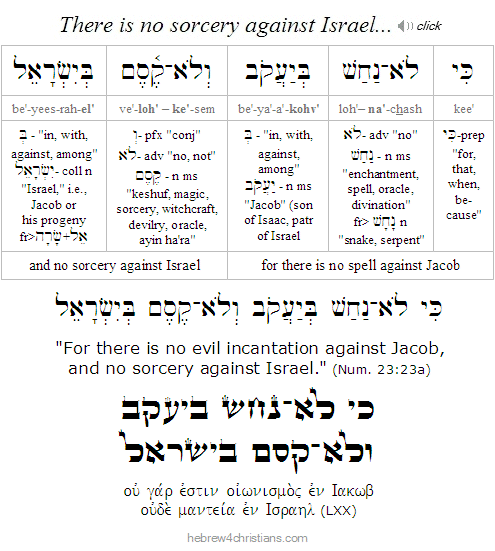 |
"No weapon that is formed against you shall prosper; And every tongue that accuses you in judgment you will condemn. This is the heritage of the servants of the LORD, And their vindication is from Me," declares the LORD (Isa. 54:17). The wicked gnash their teeth and accuse the godly, but their words are vain and their end is certain... "Like a fluttering bird or like a flying swallow, so a wanton curse does not come to rest" (Prov. 26:2).
As in the days of Noah...

10.30.19 (Cheshvan 1, 5780) "For as were the Days of Noah (ימֵי נחַ), so will be the coming of the Son of Man. For as in those days before the flood they were eating and drinking, marrying and giving in marriage, until the day when Noah entered the ark, and they were unaware until the flood came and swept them all away (οὐκ ἔγνωσαν ἕως ἦλθεν ὁ κατακλυσμὸς καὶ ἦρεν ἅπαντας). Likewise, just as it was in the days of Lot - they were eating and drinking, buying and selling, planting and building, but on the day when Lot went out from Sodom, fire and sulfur rained from heaven and destroyed them all - so will it be on the day when the Son of Man is revealed" (Matt. 24:38-9; Luke 17:28-30).
So what were these "Days of Noah" like? What can we say about dor Ha-Mabul, the "Generation of the Flood"? Yeshua explained that the "days of Noah" were marked by people who were asleep, blind, and unaware (ἔγνωσαν, "agnostic"). They went about their business willfully ignorant of the spiritual reality around them. For ten consecutive generations -- from the creation of Adam until the generation of Noah -- people progressively became more and more ignorant of spiritual reality and truth. Eating and drinking, romantic intrigue and marriage, buying and selling, and other worldly affairs were the preoccupations of the day. In short, people lived their lives oblivious to the spiritual reality all around them. They "forgot" who God was, who they were, why they existed, and where they were going. In short, they were "unaware."
The deadening effects of sin leads to moral and spiritual blindness that leads to corruption and unthinking brutality and violence. Of Noah's generation it was written that "the whole earth was corrupt before God, and filled with violence" (Gen. 6:11). Rashi understood the word "corruption" (shachat) to primarily refer to sexual immorality (i.e., idolatry) and "violence" (chamas) to primarily refer to theft and robbery. In general, however, the sages regarded the word chamas to refer to lawlessness, that is the denial of Torah, and consequently the benighted condition of living without yirat ha-shamayim (awe of heaven). When people are spiritually dead, they are unconscious of the wonder of God; oblivious to what is real; and they are consequently debased into animals...
Some of the sages think that God's judgment came in stages. The Great Flood was preceded by four successive generations of prophets that warned of the coming cataclysmic judgment: Enoch, Methuselah, Lamech, and finally Noah. It is fascinating to understand that Adam himself was alive when Noah's grandfather Methuselah was born, so the original message of teshuvah (repentance) was an echo that came from Eden itself; moreover, consider that Abraham personally knew of Noah (Abraham was 58 years old when Noah died), and undoubtedly Noah's son Shem told him of his grandfather Lamech, who had seen and spoken with Adam who was directly created by God alone. Later, Abraham's son Isaac also came to know Shem, Noah's firstborn son, and the legacy of the "gospel of the garden" was thereby passed on...
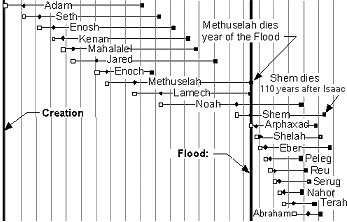 |
The first stage was the abandonment of the inherent dignity of others as people created in the image and likeness of God. This negation of the divine characteristics of people led to sexual promiscuity that became rampant upon the earth: "The sons of God saw the daughters of man that they were fair, and they took for themselves wives, whomsoever they chose" (one midrash claims that the Dor HaMabul, the generation of the flood, would regularly exchange marital partners). God then gave mankind 120 years to repent from his sexual corruption or be faced with apocalyptic destruction (Gen. 6:3). Despite Noah's 120 year public building project and the preaching of his grandfather Methuselah, God's patience finally ran out (1 Pet. 3:20). God then "saw that the wickedness of man was great in the earth and that every imagination of the thoughts of his heart was only evil continually" (Gen. 6:5). Mankind refused to repent and turn to God....
There is a tragic progression at work here. The practice of "casual" acts of lawlessness eventually led to the acceptance and practice of sexual promiscuity. This, in turn, resulted in the loss of mankind's sanctity (kedushah), since this comes from man's ability to subordinate his instinctual/emotional desires to his intellectual/spiritual life. Genuine sanctity refuses to exploit others as means to an end. Disregarding truth cheapens and impairs a sense of self, causing disintegration of spiritual life and depersonalization of others. As humanity became more and more fractured and stupefied, God's "like for like" judgment resulted in "giving them over" (paradidomi) to the lusts of their hearts (Rom. 1:26). (In our culture of unbridled pornographic expression and sexual immorality, we mirror such an antediluvian world view. Indeed, it is a mark of our age to be enamored with "degrading passions," with gender confusion and regularly practiced idolatry (i.e., fornication, adultery, homosexual relationships, and so on)). The final verdict of this practiced chamas (lawlessness) was the bestowal of a "depraved mind" (αδοκιμον νουν), a condition of being unable to reason properly at all. Since truth is essentially (and necessarily) grounded in a sense of value, and value is a function of conscience, a depraved mind is literally insane from a spiritual perspective... People who are devoid of conscience are unable to reason along the lines of ethical truth at all. This promoted a cultural collusion to suppress the truth, to silence the truth-tellers, to kill the prophets, and to gag advocates for justice. Lawlessness squelches the inward voice of right and wrong within the human heart.
For more on this see, "The Days of Noah: Further thoughts on parashat Noach."
Noach and Yeshua...
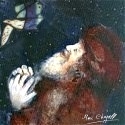
[ The following entry concerns this week's Torah reading, parashat Noach... ]
10.30.19 (Cheshvan 1, 5780) The name Noah (Noach) comes from the shoresh (root) nacham (נָחַם), meaning to comfort. Other Hebrew words that use this root include nichum (compassion), nuach (rest), and menuchah (rest from work). Noach's very name foreshadowed the coming of Yeshua. His father Lamech (meaning "powerful one") regarded Noach as a deliverer who would comfort us from the ravages of the curse (Gen. 3). In like manner it was prophesied that Yeshua would give us everlasting rest: "His rest shall be glorious" (Isa. 11:10), and He offers rest to the weary (Matt. 11:28, Heb. 4:9). His sacrifice on the Cross at Moriah undoes the kelalah (curse) over the children of Adam. Indeed, His life, sacrifice, and resurrection was like a "magic spell" that "spoke backwards" the sin of the "First Adam" - and by means of His deliverance the power of the curse was forever broken (Gal. 3:13, John 3:14, 2 Tim.1:10; Heb. 2:14; Heb. 9:27-28; 1 John 3:8, Rev. 22:3). By means of His Spirit we are given an everlasting comfort (John 14:16).
In the days of Noach "all flesh had corrupted his way upon the earth" (Gen. 6:5, 11), but Noach "found grace in the eyes of the Lord" (Gen. 6:8). This is yet another foreshadowing of the Father's choice of Yeshua as the uniquely Righteous Deliverer of the world (Matt. 3:17). Noach was from the godly line of Seth of whom would descend the Promised Seed of the Woman (see the Gospel in the Garden and the Seed of Abraham). Of Noach it was said that he was ish tzaddik (a righteous man) who was tamim (blameless) in his generation: Et-haElohim hithalekh-noach - "Noah walked with God" (Gen. 6:9). Likewise Yeshua was entirely tzaddik (Rom. 5:19, Heb. 4:15, 1 Pet. 3:18; 1 John 2:1), blameless (Heb. 4:15, 1 Pet. 3:18), and One who walked with God (John 5:19, John 8:28, etc.). For this reason the New Testament calls Noah a "herald of righteousness" (2 Pet. 2:5).
Just as Noach's obedience to God saved a remnant from all the earth, so did Yeshua's obedience result in "the saving of his house" (Heb. 11:7). And just as God "blessed Noach and his sons" (Gen. 9:1) and with them established His covenant, so in greater measure was this fulfilled in the Person of Yeshua, who provides all spiritual blessings to those whom He calls his brethren (Eph. 1:3, Heb. 13:20; Heb 2:11). Yeshua is indeed the "righteous man" who saves us in the true teivah (ark), the shelter of God's grace.
Eschatologically, the "days of Noach" are a picture of the idolatrous conditions of the world that prevail just before the calling up of the followers of the Mashiach Yeshua before the time of Great Tribulation upon the earth: "As were the days of Noah, so will be the coming of the Son of Man" (Matt. 24:37). The seven day warning given to Noach suggests the seven year tribulation period to come (Daniel's 70th week). The Spirit of God will be removed from the earth (Gen. 6:3, 2 Thess. 2:7) before the great and terrible "Day of the LORD." But please note that "the LORD shut him in" (Gen. 7:16).
"Everyone then who hears these words of mine and does them will be like a wise man who built his house on the rock. And the rain fell, and the floods came, and the winds blew and beat on that house, but it did not fall, because it had been founded on the rock. And everyone who hears these words of mine and does not do them will be like a foolish man who built his house on the sand. And the rain fell, and the floods came, and the winds blew and beat against that house, and it fell, and great was the fall of it." - Yeshua (Matthew. 7:24-27)
Noach's teivah ("ark") had God Himself as its designer (Gen. 6:15f), and salvation in Yeshua is by God's design (Jonah 2:9; Eph. 1:9, 1:11). Noach's ark contained only one door (Gen. 6:16), just as Yeshua is the only door to salvation (John 10:9). Noach's ark contained three levels (Gen. 6:16) and salvation has three own experiential levels (2 Cor. 1:10): past, present, and future. In the past (at Moriah) Yeshua delivered us from the penalty of sin; in the present, He is delivering us from the power of sin; and in the future He will deliver us from the very presence of sin. From Noach's hand was given the sign of the dove, a symbol of peace and the abiding presence of the Spirit of God.
Seeing the Invisible...
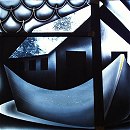
[ The following entry concerns this week's Torah reading, parashat Noach... ]
10.29.19 (Tishri 30, 5780) Just as Noah foresaw the great cataclysm to come, so we are to understand that the world above our heads and under our feet is destined to destruction, as we likewise await the promised world to come: "Lift up your eyes to the heavens, and look at the earth beneath; for the heavens vanish like smoke, the earth will wear out like a garment, and they who dwell in it will die in like manner; but my salvation will be forever (וישׁוּעָתִי לְעוֹלָם תִּהְיֶה), and my righteousness will never be dismayed" (Isa. 51:6).
This idea is repeated in the New Testament: "For as were the days of Noah, so will be the coming of the Son of Man" (Matt. 24:37). "But the Day of the LORD will come like a thief, and then the heavens will pass away with a roar, and the heavenly bodies will be burned up and dissolved, and the earth and the works that are done on it will be exposed. Since all these things are thus to be dissolved, what sort of people ought you to be in lives of holiness and godliness, waiting for and hastening the coming of the Day of God, because of which the heavens will be set on fire and dissolved, and the heavenly bodies will melt as they burn? But according to his promise we are waiting for new heavens and a new earth in which righteousness dwells. Therefore, beloved, since you are waiting for these, be diligent to be found by him without spot or blemish and at peace" (2 Pet. 3:10-14).
In light of all this, we look not to the things that are seen but to the things that are unseen. "For the things that are seen are transient, but the things that are unseen are eternal... For the invisible things of Him from the creation of the world are clearly seen, being understood by the things that are made, even his eternal power and Godhead. Therefore we are strangers and exiles on the earth, looking forward to the city that has foundations, whose designer and builder is God" (2 Cor. 4:18; Rom. 1:20; Heb. 11:10,13).
Faith sees the invisible... Our father Abraham was promised descendants as numerous as the stars in the sky or sand on the seashore, despite the fact that he was an old man and his wife had long past the age of bearing children. Abraham believed in the One who gives life to the dead and - καλοῦντος τὰ μὴ ὄντα ὡς ὄντα - "calls into existence the things that do not exist as existing" (Rom. 4:17). "He staggered not at the promise of God through unbelief but was strong in faith, giving glory to God; and being fully persuaded that, what He had promised, He was able also to perform: And therefore it was imputed to him for righteousness" (Rom. 4:19-22).
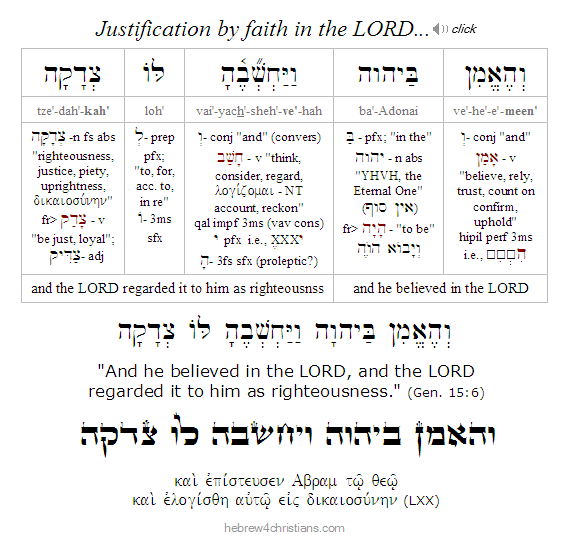 |
Our Daily Deliverance...
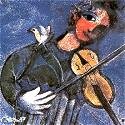
10.29.19 (Tishri 30, 5780) Just as we are to ask God for daily bread (לֶחֶם חֻקֵּנוּ), so we are to ask for daily deliverance: "Lead us not into temptation, but deliver us (חַלְּצֵנוּ) from evil" (Matt 6:13). Note that the term translated "evil" in many translations ("deliver us from evil") is a substantive rather than an adjective: τοῦ πονηροῦ, the evil one... "Give us this day our daily deliverance from the evil one...." Our daily bread and our daily deliverance are connected with our decision to "choose life" (בַּחַרְתָּ בַּחַיִּים) -- and to always choose life -- even in moments we find difficult, distressing, and even when we might wish that we were no longer living... Choosing life means refusing to escape reality by evading the significance of our choices; it means finding the will to regard life as worthy; it implies that we will eat our bread in trust that the Lord is at work even in the darkest of hours (Passover occurred at midnight)... Choosing life means refusing to eat the fruit of death and to seek Yeshua, the Tree of Life. We live one day at a time; we only have today. We are given daily bread for this hour of our need. Today is the day of your deliverance - if you are willing to walk in it. Therefore, the Spirit of the Living God cries out, "Choose life and live!"
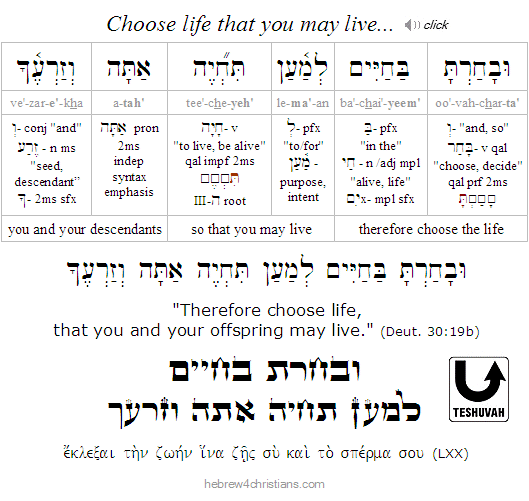 |
The Call of Loneliness...

10.28.19 (Tishri 29, 5780) Sometimes we may experience painful loneliness -- a desperate feeling that love is for other people, that we are unlovable, unwanted, unseen... We struggle between the extremes, at once lamenting our very existence while hungering for connection. We feel abandoned, hopeless, and shrouded in gloom: "darkness, my one companion left..." (Psalm 88:18). We then may attempt to suppress or avoid the pain through obsessions of various kinds, but doing so will only temporarily hide the truth of our inner emptiness and sadness. Deep down we are profoundly afraid that we will never feel comforted, that love is not possible for us, and therefore we are trapped, bound to sorrow, made captive to a relentless inner grieving of heart. "Not being welcome is your greatest fear. It connects with your birth fear, your fear of not being welcome in this life, and your death fear, your fear of not being welcome in the life after this. It is the deep-seated fear that it would have been better if you had not lived" (Nouwen). It takes courage to face ourselves, but it is only when we go "through the wound" that we discover who we really are -- and how our loneliness teaches us our desperate need for God's love. Only when we accept our loneliness and understand it as an invitation to turn away from the world and its illusions will we be able to seek God alone, in our solitude, and there find healing for our broken hearts (Psalm 147:3). It is in the seclusion of the desert when we discover yesh ohev davek me'ach, "there is a Beloved one who sticks closer than a brother" (Prov. 18:24). In the desert, in the waste places of the hurting soul, in the mourning over your life, you learn that you are never really alone, that you are not forgotten, that God sees you and wants you to feel accepted, chosen, esteemed, beloved, wanted... In the desert your Beloved one speaks and says to you: "Arise, my love, my beautiful one, and come away" (Song 2:10).
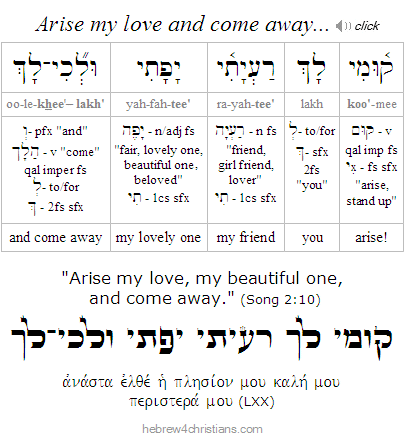 |
The core of the struggle is here - whether you will decide to trust in God's personal love for you or whether you will shrink back into the places of darkness, isolation, and pain. Yeshua says, "Come to me; I love you, I accept you; I receive you; please, be welcome with me; I will take your hand, I will be with you..."
Holding Fast to Hope...

10.28.19 (Tishri 29, 5780) There are moments – dark, gnawing, raw – when you may lose sight of hope, when you might even fear that you have lost your faith – not in God or his promises – but rather in yourself, in your own strength to continue, in your own will to stay focused and to keep pressing on "hope against hope..." The remedy here is always the same: to remember that within you – that is, in your flesh - "there is no good thing" and that the miracle of salvation is made secure by God's great passion for you, not your own power or desire. "Not by might, nor by power, but by my Spirit, says the LORD of Hosts" (Zech. 4:6). We don't trust in ourselves nor in the strength of our inner resolve, but solely in the power of God to make the way (Jer. 17:5). We must turn away from ourselves to regain the message of God's unfailing love; only when we lose sight of ourselves do we find ourselves. God redeems you from your lost estate and touches you in your uncleanness; He clothes himself in your pain so that you may be clothed in his love. That never changes, despite dark moments, and to that we must always return...
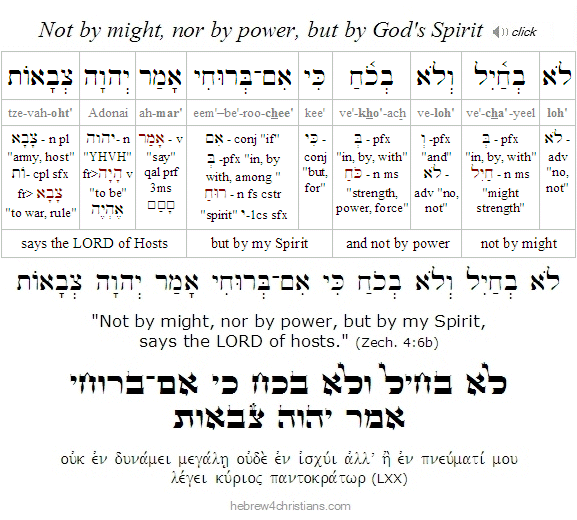 |
Where it is written, "I can do all things through Messiah who strengthens me" (Phil 4:13), that includes enduing protracted suffering, hardship, abandonment, and even abuse suffered from others. It means being set free from disillusionment, despair, and the oppression of relentless fear. "I can do all things through Messiah" also means no longer accepting messages of self-hatred, no longer heeding the malicious whispers that say: "I am of no value," "I am unlovable,"or"my life is hopeless." No, "I can do all things through Messiah" means learning to be accepted, honored, and esteemed by God; it means opening your heart to God's love and blessing for your life; it means allowing your heart to be made right, to have inner peace... After all, Yeshua's great prayer was that we would know the truth of God's love for us (John 17), and this is the central need our lives...
Parashat Noach (פרשת נח)

[ The following entry concerns this week's Torah reading, parashat Noach... ]
10.27.19 (Tishri 28, 5780) Last week's Torah portion (Bereshit) showed how the mutiny of Adam and Eve caused humanity to plunge into idolatrous chaos. The subsequent generations lost sight of the LORD and became progressively steeped in moral anarchy and bloodlust, so that "every intention of the thoughts of man's heart was only evil continually" (Gen. 6:5). After just nine generations, the LORD had grown so weary of humanity that he "regretted" (i.e., yinchem: יִּנָּחֶם) creating man and "his heart was grieved" (Gen. 6:6). However, God recognized Noach (from the godly line of Seth) as a tzaddik (צַדִּיק), a righteous man of faith, and graciously made provision to save him from the wrath to come....
Noah's father Lamech (לֶמֶךְ, "powerful one") regarded his son as a deliverer who would comfort humanity from the ravages of the original curse (Gen. 5:29). Noach would give rest (נוּחַ) from the toil and vexation of life. Symbolically Noah was a "type" of the Savior to come who would rebirth the world by giving lasting comfort and rest (for more on this, see the page "Noah and Jesus"). In like manner it was prophesied that Yeshua would give us everlasting rest: "His rest shall be glorious" (Isa. 11:10), just as He offers rest to the weary (Matt. 11:28, Heb. 4:9). His sacrifice on the Cross at Moriah undoes the kelalah (curse of work) over the children of Adam. Indeed, His life, sacrifice, and resurrection was like a "magic spell" that "spoke backwards" the sin of the "First Adam" - and by means of His deliverance the power of the curse is forever broken (see Gal. 3:13, John 3:14, 2 Tim.1:10; Heb. 2:14; Heb. 9:27-28; 1 John 3:8, Rev. 22:3). Yeshua is Adam ha-Sheni - the "Second Adam" - the promised Son of Man. By means of His Spirit we are given an everlasting comfort (John 14:16).
Eschatologically, the "days of Noah" present a picture of the idolatrous conditions of the world that will prevail just before the calling up of the followers of Yeshua before the time of Great Tribulation upon the earth: "As were the days of Noah, so will be the coming of the Son of Man" (Matt. 24:37). The generation of the Flood was said to be "filled with violence" (Gen. 6:13) caused by ignorance -- literally the "state of ignoring" moral and spiritual truth. Because people willingly disregarded God from their midst, they arrogated to themselves divine prerogatives: "every man did what was right in his own eyes." The resulting moral corruption and anarchy led to divine and catastrophic judgment: the world returned to its primordial state of tohu va'vohu v'choshekh: "confusion and emptiness and darkness" (Gen. 1:2). Notice, however, that despite the godlessness and lawlessness that prevailed, the "days of Noah" were not marked by overt "tribulation," since people were eating and drinking, marrying and giving in marriage, until the day that Noah entered into the ark, "and they were unaware" (καὶ οὐκ ἔγνωσαν) until the flood came and swept them all away -- so will be the coming of the Son of Man (see Matt. 24:38-39). In other words, the "end of the world" judgment fell suddenly and took them by surprise...
The seven day warning given to Noah further suggests the seven year tribulation period to come (Daniel's 70th week), and also the "rapture" of the people of God who will be carried above the prophesied worldwide cataclysm. Just as God protected Israel during the time of judgment upon Egypt, so He will protect His people from the wrath of the "great Day of the LORD." But please note that "the LORD shut him in" (Gen. 7:16). Noah's teivah (ark) had God Himself as its designer (Gen. 6:15f), just as salvation in Messiah is by God's design (Jonah 2:9; Eph. 1:9, 1:11). It contained only one door (Gen. 6:16), just as Yeshua is the only door to salvation (John 10:9; 14:6). Noah's ark contained three levels (Gen. 6:16) and salvation has three own experiential levels (2 Cor. 1:10): past, present, and future. In the past (at Moriah) Yeshua delivered us from the penalty of sin; in the present, He is delivering us from the power of sin; and in the future He will deliver us from the very presence of sin. Baruch Hashem - may that day come soon!
It sometimes surprises me that people who claim to follow the LORD can get so "triggered" (offended) about the timing of Yom Adonai (the Day of the LORD) and chevlei Mashiach (the tribulation) that they choose to hate other followers of Yeshua. What shandeh and chillul HaShem! Look, the "End of the World" is the day you will die to face God to give account of your life. You argue over incidentals and ignore the deeper fact that God will guide his children through whatever comes their way to bring them back home. You may disagree with the timing of the "rapture" or some other matter of eschatology, but you are forbidden to despise your brothers and sisters or to mock them. Be careful not to confuse your pride for the love of the truth; truth used as a weapon is not truth: even the devil quotes Scripture.
Chodesh Cheshvan....

10.27.19 (Tishri 28, 5780) On the Biblical calendar, the month of Cheshvan (חֶשְׁוָן) immediately follows the "holiday month" of Tishri, and begins Friday, October 21st (at sundown) this year. The Torah records that God brought down the Great Flood that destroyed the world on Cheshvan 17 (Gen. 7:10-11), which lasted until Cheshvan 27 (Gen. 8:14) - exactly one calendar year after it began (Rashi notes that the 11-day discrepancy between the 17th and 27th represents the 11-day difference between the solar and lunar calendar year). Because Noah's Flood began and ended during this month, Cheshvan is generally regarded as "mar" - a time of judgment, especially regarding water (rain). Cheshvan always has a two-day Rosh Chodesh. Because rain is central to the health of the spring crops, on the 17th of the month those living in Israel begin requesting rain by adding vetein tal u'matar librakha ("and grant dew and rain for blessing") to the Amidah prayer.
יְהִי רָצוֹן מִלְּפָנֵיךָ יהוה אֱלהֵינוּ
וֵאלהֵי אֲבוֹתֵינוּ שֶׁתְּחַדֵּשׁ עָלֵינוּ חדֶשׁ טוֹב
בַּאֲדנֵינוּ יֵשׁוּעַ הַמָּשִׁיחַ אָמֵן
ye·hee · ra·tzohn · meel·fah·ney·kha · Adonai · E·lo·hey·noo
vei·loh·hey · a·voh·tey·noo · she·te·kha·deish · ah·ley·noo · khoh·desh· tohv
ba'a·doh·ney·noo · Ye·shoo·a' · ha·mah·shee·akh · a·mein

"May it be Your will, LORD our God and God of our fathers,
that you renew for us a good month in our Lord Yeshua the Messiah. Amen."

Download Study Card
Shabbat Shalom...
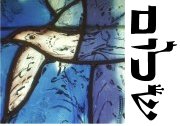
10.25.19 (Tishri 26, 5780) We are people of truth, people of faith in the LORD God of Israel. We share our hope with the great tzaddikim of the ages as we walk through the "valley of the shadow of death" that is this world. We believe in God's mercy and love given in the Messiah; we believe in the resurrection of Yeshua from the dead and hold fast to the promise of an unimaginably wonderful blessing reserved for us in the world to come. Meanwhile we walk by faith, believing that no prayer we utter ever goes unanswered. We trust in our heavenly Father's care as we pour out of hearts to him for the healing of those who are still lost and in despair... We remember that time is a short and soon we will see our great King panim el-panim, "face to face." At any given moment of the day, then, regardless of our present circumstances, we can turn to the secret reality of the Divine Presence and come "boldly before the Throne of Grace." As Yeshua said, "To you it has been given to know the secrets of the kingdom of heaven..." (Matt. 13:11). The Spirit of God always says, "Come, my people, enter your chambers, and shut your doors behind you" (Isa. 26:20). In the secret places of our heart - our "prayer closet" - we appeal to the Hidden Presence to be manifest in the midst of every circumstance of our lives. Our Heavenly Father sees in secret; he knows the groaning of our hearts. Therefore may we never be ashamed; may we never grow bitter; may our sorrows lead us from strength to strength; and may the days of our sojourn yield to us greater wisdom, deeper compassion, and finally return us to the accepting arms of our great God and Savior. By faith let us draw near and call upon the Name of the LORD.
Shabbat Shalom, dear friends...
The War for Truth...

10.25.19 (Tishri 26, 5780) We are in the midst of a great spiritual war -- the war for the truth. This has been the battle from the beginning. The very first words of evil (הַנָּחָשׁ) questioned and garbled God's truth: אַף כִּי־אָמַר אֱלֹהִים לֹא תֹאכְלוּ מִכֹּל עֵץ הַגָּן - "Did God really say you shall not eat from all the trees of the garden?" (Gen. 3:1). The test of the orchard was therefore the test of teshuvah - that is, whether Adam and Eve would turn to God or turn to evil. Satan's deceptive appeal to Eve was that the fruit of the Tree of Knowledge would give her wisdom that would make her "like God," knowing both good and evil. The essence of temptation focused on her pride and her desire to acquire wisdom using her own autonomous reasoning. The fruit represented self-will and the abandonment of God's rule as King of the universe. Eve's sin was ultimately that of unbelief (which is the reason why we must be saved by faith, as a reversal of the original sin). When she ate the forbidden fruit, the body (carnality) became the central focus and shame was the result.
The Hebrew word for truth (i.e., emet: אֱמֶת) implies more that descriptive correspondence to include faithfulness and trust; it is both cognitive (emunah) and emotive (bittachon). In the end there will be found two types of people: those who love the truth and those who love the lie; these are children of light (בְּנֵי הָאוֹר) and children of darkness (בְּנֵי הַחשֶׁךְ), respectively. Followers of Yeshua the Messiah are told to "walk as children of light" / ὡς τέκνα φωτὸς περιπατεῖτε (Eph. 5:8). Children of light are called to be am kadosh - a holy people - separate from the evil engendered by the fallen world and its forces, just as the very first creative expression of God was the separation of light from darkness (Gen. 1:3-4). The children of light "hate evil and love the good," and conversely, the children of darkness "hate the good and love evil" (Psalm 34:21, Prov. 8:13, Amos 5:15, John 3:20-21). Yes, we hate sin, because sin separates people from healing; we hate sin but we love others. We are to walk in the peace and love of God; to do acts of justice and lovingkindness (Psalm 97:10). "No one can serve two masters, for either he will hate the one and love the other, or he will be devoted to the one and despise the other."
In a sense, the history of humanity - especially as it has been expressed philosophically and politically through the centuries -- has been nothing less than the collusion to redefine reality as something that it isn't. "The kings of the earth station themselves, and the dignitaries (רוֹזְנִים) take counsel together against (lit. "over") the LORD and His Mashiach" (Psalm 2:1-3). Spiritual warfare is therefore the fight for sanity and truth in a world that prefers madness and self-deception...
Be vigilant! If the devil can't kill you, he will try to drive you insane... He will lie to you about who you really are... He he will harass you and vex your soul. He will whisper fearful things in your ear... He will make what is small seem big and what is big seem small. He will raise dark suspicion within your soul, causing you to walk in mistrust. He will remind you of your sins to make you feel ashamed and dirty. He will hiss that you are unlovable and unworthy. He will argue on behalf of your flesh that you deserve better than this... He will tempt you to seek relief in cisterns of emptiness and futility. Most of all, he will try to cast a spell to make you forget that you are truly a prince or princess of God Almighty... The devil seeks to drive you into the exile of loneliness and despair. Submit yourself to God and refuse to heed voices of fear or shame. Da lifnei mi attah omed: "Know before whom you stand!"
There are two basic approaches to "spiritual warfare." The first is to discern the presence of evil and then pray for God's intervention, deliverance, protection, and so on. The second is to use ayin tovah and focus on God instead - to "set your thoughts on things above" (Phil. 4:8). Whereas the former approach may at times seem necessary to dissipate encroaching darkness to find inner peace, the latter approach has the decided advantage of trusting in the Divine Presence that pervades and overrules all things (Psalm 16:8). When David was surrounded by the enemy, he kept focused on the glory of the LORD. David knew that God would shelter him and elevate him above the powers of darkness (Psalm 27:1-6). The highest form of spiritual warfare, then, is to consciously turn away from fear by choosing to praise the LORD God, magnifying His Name, and walking before Him in awe...
יהוה אורי וישׁעי ממי אירא
יהוה מעוז־חיי ממי אפחד
Adonai · oh·ree · ve·yeesh·ee · mee·mee · ee·rah
Adonai · ma·ohz · chai·yai · mee·mee · ef·chad

"The LORD is my light and my salvation; whom shall I fear?
The LORD is the strength of my life; of whom shall I be afraid?"
(Psalm 27:1)
Hebrew Study Card

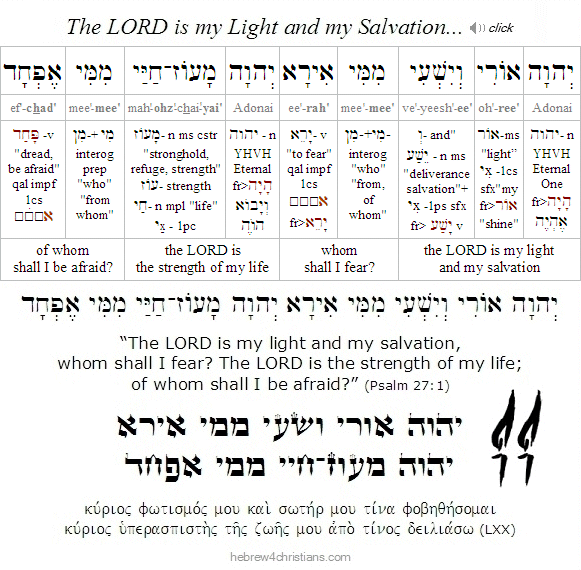
Surely our great need is to have heart, to find strength, resolution, and steadfast determination to walk boldly during these heartless and depraved days (2 Tim. 3:1-5). We are not without God's help, of course. Yeshua told us that the Ruach HaKodesh (רוּחַ הַקּדֶשׁ) would be "called alongside" (παράκλητος) to comfort us on the journey. The English verb "comfort" literally means "to give strength" (from com- ["with"] and fortis ["strong"]), an idea similarly expressed by the verb "encourage," that is, to "put heart [i.e., 'core'] within the soul." In Hebrew, the word courage is expressed by the phrase ometz lev (אמֶץ לֵב), meaning "strong of heart," denoting an inner quality of the will rather than of the intellect. Our faith is the victory that overcomes the world (1 John 4:4, 5:4).
Fear is the primary tool of the devil and the underlying motive behind sin itself (Rom. 14:23). Beloved, "do not be overcome by evil, but overcome evil with good" (Rom 12:21). Always focus on Yeshua, the Light of Torah (האור של תורה) and the true Wisdom of God (חָכְמַת אֱלהִים): "Whoever has My commandments (מִצְוֹתַי) and keeps them, that is the one who loves me. And the one who loves me will be loved by my Father, and I will love him and will manifest (lit., "shine within" from ἐν, "in" + φαίνω, "shine") myself to him" (John 14:21). There it is - the Source of the Light that overcomes all darkness; the Power that is behind the armor of God... Yeshua is the Beginning, the Center, and the End of all true meaning from God. Blessed is His Name forever and ever...
The Gospel in the Garden...
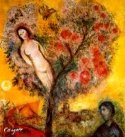
[ We always read parashat Bereshit on the Sabbath following the holiday of Simchat Torah, and therefore it begins Torah reading for the new Jewish year.... Right at the outset of the narrative of the Torah, then, we will read about the "proto-euangelion," or the "first gospel" message of God's redemption given through the Promised Seed of Eve... ]
10.25.19 (Tishri 26, 5780) The very first prophecy of the Torah concerns the promise of the coming "Seed of the woman" who would vanquish the serpent (nachash) that had originally tempted and deceived Eve (Gen. 3:15). This prophecy is sometimes called the proto-euangelion ("first gospel"), since it is the starting point of all subsequent prophecy and redemptive history revealed in the Scriptures. Indeed, since the mystery of the Incarnation of God the Son (the "Son of Man") is foreshadowed here, this prophecy is linked to the original woman, Eve. Just as Eve became a carrier of the corruption of human nature by heeding the voice of the tempter, so she would be the carrier of God Himself for the deliverance of mankind through the advent of the Redeemer. In the tragic aftermath of the transgression of the first man and woman, then, God first announced His unfailing redemptive love for the human race that would culminate in the birth, sacrifice, and resurrection of Yeshua our Savior and Deliverer - "born of a woman, born under the law" (Gal. 4:4).
Our restoration begins with God's love and passion. God's first question to Adam after he broke covenant was: "Where (אַיֶּכָּה) are you?" - the voice of a loving Father in search of his son (Gen. 3:9). Of course God knew exactly how his son was attempting to hide, though He almost acted as if He was unwilling to believe that he would betray his love by disobeying His commandment. Therefore God's poignant question was directed to Adam's heart: "Oh my son, how did you get to this place?" God was giving Adam an opportunity to turn back to Him, to confess the sin, to undergo teshuvah, to become reconciled... This is the necessary prelude to any honest relationship with God.
Recall that the original promise of the coming Savior was given within the context of the curse and judgment upon Satan: "I will put enmity between you and the woman, and between your seed and her seed; he shall crush your head, and you shall crush his heel" (Gen. 3:15). That God's promise was first directed to Satan is surely by design, since he "left his first estate" by becoming the "monster in the garden" and was therefore primarily responsible for the transgression of Adam and Eve in the first place (Ezek. 28:13-15,19). The promise delivered to Satan was therefore one of coming retribution and divine judgment: Evil would not have the last word in the matter of mankind, and therefore Satan's schemes would be avenged by God in the fullness of time (Gal. 4:4-5). Notice, however, that Adam and Eve were not yet judged for their sin when the LORD God gave the promise of the coming of the Redeemer. Before a word of judgment was directed toward them, God's love and light was already revealed. Indeed, immediately after their judgment was pronounced, "the LORD God made tunics of skin for Adam and his wife and clothed them" (Gen. 3:21) - a clear picture of being compassionately "robed in righteousness" imparted by an innocent sacrifice. The very first sacrifice recorded in the Torah - performed by God Himself - prefigured the coming redemption by the "seed of the woman" who would die as a substitutionary sacrifice for their sins, and therefore Yeshua is rightly called "the Lamb slain from the foundation (or beginning) of the world" (Rev. 13:8). This further explains why Eve's son (Abel) offered a blood sacrifice that was accepted by the LORD, whereas Cain's offering the "fruit of the earth" was rejected.
The very first prophecy of Torah therefore describes - in the most succinct form - the coming of the Savior and the great conflict of the ages. First, God declares that He would put enmity (אֵיבָה) between Satan and the woman. This enmity, or "hostile hatred," was based on the memory of Eve's misguided trust she evidenced in the garden. When Eve first sympathetically listened to the lies of the nachash (serpent), she immediately began her descent into exile and became a temptress herself. Her first step toward sin was a gullibility or openness that ultimately resulted in a lack of trust of God (which is part of the reason why we must be saved by trusting, as a "like-for-like" reversal of the original sin). At the very dawn of human history, then, we see that "truth" (אֱמֶת) apart from God (א) leads to death (מֵת). Eve was deceived because of Satan, but Adam deliberately chose to disobey God (2 Cor. 11:3; 1 Tim 2:14). In response to her teshuvah (repentance), God blessed Eve before He judged her by imparting to her a God-given hatred for Satan and his lies, as well as the promise that she would take part in the birth of the Savior of mankind. The first promise of the gospel, then, focused on the woman and her role in the coming redemption. Notice that Adam later renamed his wife Eve (i.e., Chavah: חַוָּה, the "mother of life") as an expression of his faith that the promised seed would come through her.
וְאֵיבָה אָשִׁית בֵּינְךָ וּבֵין הָאִשָּׁה
וּבֵין זַרְעֲךָ וּבֵין זַרְעָהּ
הוּא יְשׁוּפְךָ רֹאשׁ
וְאַתָּה תְּשׁוּפֶנּוּ עָקֵב
ve·ey·vah a·sheet be·ne·kha oo·vein ha·ee·shah
oo-vein zar·a·kha oo-vein zar-ah
hoo ye·shoof-kha rosh
ve·a·tah te·shoo·fen'·noo a·keiv

I will put enmity between you and the woman,
and between your offspring and her offspring;
he shall bruise your head, and you shall bruise his heel."
(Gen. 3:15)
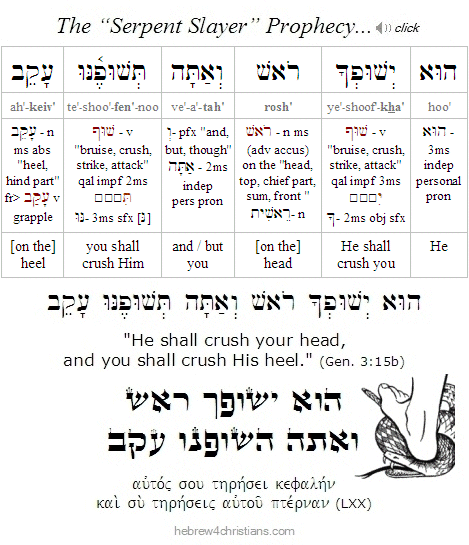
It is likely that Eve initially believed that her firstborn son Cain (קַיִן) was the promised Seed himself. After all, the miracle of birth surely came as a great shock to her, and Eve's faith in God's promise that through her seed would come the deliverer was doubtlessly upon her heart at this time. When Eve called her son "Cain" (wordplay from the verb kana (קָנָה), "to get"), she was expressing her faith in God's promise: קָנִיתִי אִישׁ אֶת־יהוה / kaniti ish et-Adonai, "I have gotten a man - namely, the LORD" (Gen. 4:1). Eve's faith was obscured by the translators, however, who rendered the Hebrew as "I have gotten a man with the help of the LORD" (i.e., they inserted the idea of "help" and translated the particle et (את) as "with" rather than as the direct object marker for the verb). The ancient Jewish targums, however, agree with the original Hebrew. For example, Targum Yonatan reads: "I have gotten a man - the Angel of YHVH." Surely Eve, the first mother of humanity, was endowed with great wisdom from God, especially after she turned to Him in repentance after her disobedience. The straightforward reading of her words, then, expressed her hope that the LORD Himself would be made a man....
Despite her hope that Cain was none other than the God-Man and promised Deliverer, Eve's hopes were dashed when it became clear that her son was of the seed of Satan (1 John 3:12). His younger brother Abel (הֶבֶל) was a shepherd who evidenced faith in the promise of the coming redeemer by offering blood sacrifice (Gen. 4:3-5). Abel was persecuted and finally murdered by his brother Cain "because his own deeds were evil and his brother's righteous." Their spiritual conflict is indicative of the ongoing warfare between the "sons of darkness" and the "sons of light."
The murder of Abel necessitated that the coming seed would descend through another child, and therefore the Torah describes the birth of Seth (שֵׁת, lit. "appointed"), the third son of Adam and Eve. The Scriptures further state that it was the descendants of Seth who "began to call upon the Name of the LORD" (לִקְרא בְּשֵׁם יהוה), indicating that they had faith in God (אֱלהִים) as the Compassionate Covenant Keeper (יהוה) who would redeem humanity by means of the coming seed. Seth called his firstborn son Enosh ("man"), perhaps in the hope that his child would be the promised Savior (interestingly, bar enosh (בַּר אֱנָשׁ), or "Son of Man," is the name for the Savior (Dan 7:13).
To continue reading see: "The Gospel in the Garden: Further thoughts on parashat Bereshit."
The Dust of God....
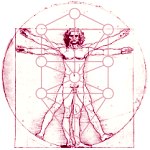
[ The following is related to last week's Torah portion, parashat Bereshit... ]
10.25.19 (Tishri 26, 5780) "Then the LORD God formed the man from dust of the ground and breathed into his nostrils the breath of life, and the man became a living soul" (Gen. 2:7). We tend to think of dust in self-effacing terms; for example, repenting in "dust and ashes" expresses unworthiness and sinfulness. Yet the dust God used to form Adam was not worthless, but instead represented very fine particles of creation, a substance suspended midway between heaven and earth, almost a "spiritual matter." This is suggested by the fact that God first intended man to be his image bearer and only then used dust as the material for that higher end. The sages note that regarding the creation of animals, God said, "Let the earth (eretz) bring forth according to their kinds" (Gen. 1:24), but regarding man he said, "Let us make him be'tzelmeinu - in our image (as a photograph), after our likeness" (Gen. 1:26). Therefore God brought forth the lower animals in groups, but he created Adam as the only one of its kind, the son of God and prince of God's creation. God breathed into Adam nishmat chayim (נִשְׁמַת חַיִּים), "a living soul" (the word neshamah [נשָׁמָה] is used to describe life breathed into humans, not to animals). The LORD breathed "out of himself" to share his own spirit with mankind... Therefore your soul does not come from nature, but from God; your inner essence originates directly from the LORD. Yeshua breathes out and says to you, "Receive the Holy Spirit" (John 20:22).
The very first occurrence of the Name YHVH (יהוה) concerns the creation of Adam. When Adam first opened his eyes and human consciousness was born, he immediately understood that the LORD created all things, including himself. According to midrash, Adam's first words were, יהוה מֶלֶךְ עוֹלָם וָעֶד / Adonai malakh olam va'ed: "The LORD is King for ever and ever" (Exod. 15:18). God then said, "Now the whole world will know that I am King," and He was very pleased. This was the "tov me'od" (טוֹב מְאד) moment of creation, when God saw all that He had made "and found it very good" (Gen. 1:31).
Note: From the statement, "for the LORD God had not caused it to rain on the land, and there was no man to work the ground" (Gen. 2:5), the early sages inferred that without man, the physical world itself would be pointless... Though there was mist physically present, the providential rains of blessing needed for the cultivation of plant and animal life would be given solely for the benefit of man... The LORD God planted the garden in the east for the sake of Adam (Gen. 2:8). From the very beginning the LORD is the Fountain of living water (מְקוֹר מַיִם־חַיִּים) poured out for us.
Alphabet and Creation...
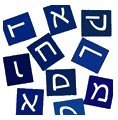
10.25.19 (Tishri 26, 5780) The Torah begins with the letter Bet (בּ) rather than the letter Aleph (א) to denote God's humility. The letter Aleph is the first letter, the king of the alphabet, and the letter that begins "I AM" (i.e., אנכי) - the first word of the Ten Commandments. The letter Bet, on the other hand, is the second letter that means "house" or "home" (בּית). This suggests that the Torah begins with the focus not on the "I" but on creation, the household of God. And though God did not wish to be the center of attention, so to speak, Aleph and Bet together spell the word "father" (אב), that is, the One who oversees the household of the world in love. As it is written, "Every good gift and every perfect gift is from above, coming down from the Father of lights (אֲבִי הַמְּארוֹת) with whom there is no variation or shadow due to change" (James 1:17).
Note: It may be wondered why we would say that God is humble... Well, it is certainly true that the LORD is self-effacing, self-forgetting, utterly unselfish, absolutely noble of heart, and so on. Moreover we are commanded to emulate God, who is merciful, gracious, slow to anger, abounding in steadfast love, etc. (Exod. 34:6-7). Most of all we are to follow the example of Yeshua, YHVH in the flesh, who willingly emptied Himself and took the role of a humble servant (Phil. 2:6-7). Yeshua himself said, "Take my yoke upon you, and learn from me, for I am gentle and lowly in heart, and you will find rest for your souls" (Matt. 11:29).
Creation and Faith...
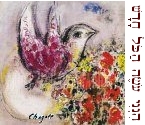
10.25.19 (Tishri 26, 5780) The idea that a personal God created the universe "out of nothing" (i.e., yesh me'ayin: יֵשׁ מֵאַיִן ) is a matter of special revelation that is not directly known through the operation of unaided natural reason. Of course human reason may (rightly) infer that since "every effect requires a cause," and since the universe itself is an effect, there must be a cause sufficient in power and greatness to effect the existence of the universe. Likewise, human reason may again (rightly) infer that the universe itself must have had a beginning, since it is impossible to traverse an infinite number of causes to arrive at a present effect, and therefore there must have been an immensely powerful and transcendental "First Cause" that started the entire chain of causation itself. (This "First Cause" answers the metaphysical question, "Why is there something [at all] rather than nothing?") However, human reason, by itself, can only take us so far, and something more is needed to apprehend the nature of reality.
In philosophical theology, an argument that God is the Cause of the universe is sometimes offered to invoke the possibility that the God of the Jewish Scriptures exists, though strictly speaking this inference is not warranted given the premises and logic of "cosmological" arguments alone. Indeed, the ancient Greek philosophers used this kind of reasoning to justify their own speculations about the cosmos (e.g., Plato's Form of the Good, Aristotle's Unmoved Mover, etc.), and yet their philosophical systems never connected the First Cause with a morally perfect personal Creator (אֱלהִים) who made mankind in His image and who therefore requires loving trust to know Him. The Greek conception of God (θεὸς) was abstract, impersonal, and essentially a theoretical construct employed to make sense of the physical cosmos. Nowhere in their speculations will you find the idea that the First Cause has revealed Himself as the Source of all moral truth in the universe and who therefore functions as mankind's Eternal Judge. And nowhere in their thinking will you find the Covenant-Making God (יהוה) who redeems humanity from sin and judgment by means of the atoning sacrifice of Yeshua on the cross... Beyond the abstract awareness that the universe is the effect of an immensely powerful and transcendental First Cause, unaided human reason has precious little to say. As the French philosopher and mathematician Blaise Pascal once wrote, "The God of the philosophers is not the God of Abraham, Isaac, and Jacob."
To the Hebrew mind, reality is the handiwork of a single all-knowing, all-powerful, and morally perfect Creator who has personally revealed Himself to key individuals in the drama of human history. As such, reality is intensely, overwhelmingly, and even hauntingly personal... Truth therefore is a matter of trust -- not abstract knowledge -- whereas "knowledge" is primarily about practical ethics, moral obligation, and cult practices (i.e., Temple worship). For the Hebrew mind, truth is more akin to moral fidelity than it is to propositional correspondence; it is more a matter of the heart than of the head (for more on this, see "Theology and the Greek Mindset").
A Roman emperor once asked Rabbi Joshua if the universe had a ruler. The sage answered, indeed, the LORD is the Creator of all things, as it is written, "In the beginning, God created the heavens and the earth." The emperor then asked, "Why then is God not like the emperor of Rome, who is seen twice a year so that people may know and worship him?" Rabbi Joshua said that unlike human kings, the LORD was too powerful for people to see; as it is written in the Torah: "No person shall see Me and live." The emperor was skeptical, however, and insisted that unless he could physically see God, he would be unable to believe. Rabbi Joshua then pointed to the sun high in the sky: "Look into the sun and you will see God." The emperor tried to look into the sun, but was forced to cover his eyes to keep them from burning: "I cannot look into the sun," he said. Rabbi Joshua then replied: "Listen to yourself: If you cannot look into the sun which is but one of God's creations, how can you expect to look at God?" (adapted from Sefer HaAggadah)
The New Testament affirms that knowing that the First Cause of the universe is the personal God revealed in the Jewish Scriptures is the result of faith in God's direct revelation: "By faith (בָּאֱמוּנָה) we understand that the universe [lit. "worlds"] were created by the utterance of God (בִּדְבַר אֱלהִים), so that what is seen [i.e., the "effect" of the universe] did not come into being out of existing phenomena [i.e., was made yesh me'ayin - 'out of nothing']" (Heb. 11:3). Again, this is a matter of special revelation directly imparted by God's grace so that the soul may apprehend the Divine Light that preceded the creation of the worlds. Faith "looks not to the things that are seen but to the things that are unseen. For the things that are seen are transient, but the things that are unseen are eternal" (2 Cor. 4:18). This "collision" with the world of everydayness creates a restlessness or homesickness for our true home in heaven... (May God help each of us persevere.)
The very first phrase of the Scriptures, "In the beginning God created..." (Gen. 1:1), is therefore the starting point of all true and right thinking about the universe itself. Everything else follows from this revealed truth which natural (i.e., human) reason can merely approximate. God alone can create yesh me'ayin - "out of nothing" (the Hebrew verb bara (בָּרָא) is used exclusively to refer to God's power in this way), and therefore God stands exaltedly apart from the universe as its unique Creator and personal Master. This is the guiding thought that overshadows all that follows in the pages of Scripture. God is holy - separate - and entirely unique. He is the Personal God who loves, wills, speaks, intends, etc., and to whom human beings owe their allegiance and life. The God of Israel is not some indifferent deity that functions as a theoretical construct to explain the universe: He is the Source of all life, the personal Judge and Redeemer of all people.
Our Creator and Redeemer....

[ The following concerns this week's Torah reading, parashat Bereshit... ]
10.25.19 (Tishri 26, 5780) When Adam first opened his eyes and human consciousness was born, he immediately understood that the LORD created all things, including himself. According to midrash, Adam's first words were, יהוה מֶלֶךְ עוֹלָם וָעֶד / Adonai malakh olam va'ed: "The LORD is King for ever and ever." God then said, "Now the whole world will know that I am King," and He was very pleased. This was the "tov me'od" (טוֹב מְאד) moment of creation, when God saw all that He had made "and found it very good" (Gen. 1:31). The birthday of humanity is therefore the Coronation Day for the King of the Universe...
The implication that God is our Creator is enormous and pervades everything else in our lives. God's creative power is witnessed by all conscious life. The Divine Light that was created before the sun and the stars represents God's immanent presence that "lights up" all of creation - including our minds (Gen. 1:3). Since we were created b'tzelem Elohim, "in the image of God," the witness of God's truth is foundational to all of our thinking as well. The revelation (not the invention) of logical first principles is part of God's "signature," if you will, of how the mind is wired to reality. Likewise we have intuitive awareness regarding the existence of moral truth (i.e., the standard of justice and moral law), aesthetic truth (i.e., ideals of beauty, goodness, worth, and love), and metaphysical truth (i.e., cause and effect relationships). "The heavens are recounting the glory of God, and the expanse is proclaiming his handiwork" (Psalm 19:1). God's power and presence can be clearly inferred from the tremendous effect of the universe itself. As Paul stated, "the invisible things of Him (τά ἀόρατα αὐτοῦ) from the creation of the world are clearly seen (καθοράω), so that people are without excuse" (Rom. 1:19-20). It is the fear of the LORD (יִרְאַת יהוה) that is truly the beginning of wisdom and knowledge (Psalm 111:10; Prov. 1:7; 9:10). The Hebrew word for fearing (ירא) and seeing (ראה) share the same root. We cannot truly see reality apart from reverencing God as the Lord and King of Creation.
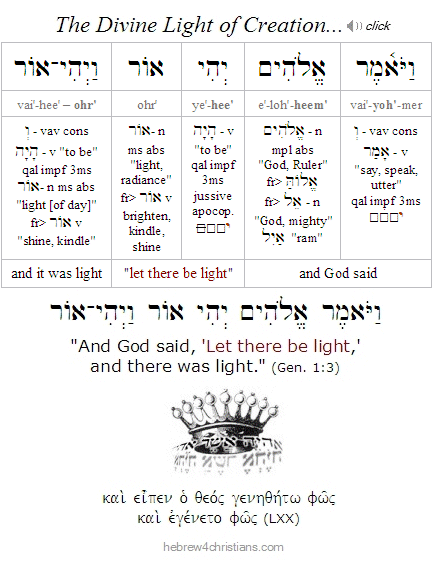 |
It is important to emphasize that God is not some impersonal "First Cause" or "Unmoved Mover" of the universe. He is not some "cosmic big bang" that started the universe only to be indifferent to its functioning, nor is God a "Cosmic Egg" or "Self-Absorbed Mind" that contemplates the navel of reality... No, God is an entirely awake and morally perfect Being who created everything "very good" and who actively engages and sustains His creation. God is a personal Creator and Ruler of all that exists. In theological jargon, God is both "immanent" (sustaining and upholding creation) and "transcendent" (exalted over creation). This God has a Name (YHVH), a mind, and a moral, purposive will that imbues all of creation. God is LORD over all time and space, the King of Glory, who is Master of all possible worlds. He is therefore intimately concerned with the rule of His law, expressed both in the "natural" world (i.e., the laws of physics, chemistry, etc.), the mental world (i.e., the laws of logic, mathematics, etc.), the ethical world (i.e., the laws of morality, ethics, etc.), and the spiritual world (the laws of spirit and of spiritual beings).
Of course the New Testament identifies the "Voice of the Creator" (קוֹל יְהוָה אֱלהִים) as the all-powerful Word of God: בְּרֵאשִׁית הָיָה הַדָּבָר / "in the beginning was the Word" (John 1:1,14). Yeshua is the Source of all life in the universe: כָּל־הַמַּעֲשִׂים נִהְיוּ עַל־יָדוֹ / "All things were made by Him (John 1:3). The "Word made flesh" is the "image of the invisible God" and the "radiance of the glory of God and the exact imprint (χαρακτήρ, 'character') of his nature" (John 1:14, Col. 1:15). All of creation is being constantly upheld by the word of His power (Heb. 1:3): "All things were created by Him (i.e., Yeshua), and for Him" and in Him all things consist (συνεστηκεν, lit. "stick together") (Col. 1:16-17). Creation begins and ends with the redemptive love of God as manifested in the Person of Yeshua our Messiah... He is the Center of Creation - it's beginning and end. As it is written: אָנכִי אָלֶף וְתָו רִאשׁוֹן וְאַחֲרוֹן ראשׁ וָסוֹף / "I am the 'Aleph' and the 'Tav,' the First and the Last, the Beginning and the End" (Rev. 22:13). Every knee shall one day bow before Him (Isa. 45:23; Rom. 14:11; Phil. 2:9-11). Indeed, Yeshua is מֶלֶךְ מַלְכֵי הַמְּלָכִים / Melech Malchei Hamelachim: The "King of kings of kings." He is LORD of all possible worlds -- from the highest celestial glory to the dust of death upon a cross... יְהִי שֵׁם יהוה מְברָךְ / yehi shem Adonai mevorakh: "Let the Name of the LORD be blessed" forever (Psalm 113:2). Amen.
Creation and Rest...

[ The following concerns this week's Torah reading, parashat Bereshit... ]
10.24.19 (Tishri 25, 5780) The general account of creation ends: "So God blessed the seventh day and set it apart as as holy (וַיְבָרֶךְ אֱלֹהִים אֶת־יוֹם הַשְּׁבִיעִי וַיְקַדֵּשׁ אֹתוֹ), because on it God rested (i.e., shavat: שָׁבַת) from all his work that he had created to do" (Gen. 2:3). Here we note that rest (shevat) should not be thought of as idleness, that is, the mere cessation of work, since the divine rest is blessed and introduces a higher-level of existence, above the natural realm. This is likened to the "hidden blessing" that no manna fell on Sabbath so that what had been accrued could be used at that time (Exod. 16:25). The midrash says here that God rested only from the "work of this world," but not from the work of heaven, that is, the ongoing work of sustaining creation by the word of his power, caring for the righteous and judging the wicked, feeding the birds and watering the lilies of the field (Matt. 6:26-29, Heb. 1:3). "Yea, He that keeps Israel shall neither slumber nor sleep" (Psalm 121:4). Therefore it was on the Sabbath day that Yeshua asked the paralytic man, "Do you want to be healed?" and then instructed him to take up his mat and walk (John 5:1-9). To those religious gatekeepers who accused him of "breaking the Sabbath" because he did this, Yeshua said, "My Father is working until now, and I am working too," a statement that enraged them even more, since they understood that Yeshua was making himself equal with the LORD God Himself (John 5:17-18).
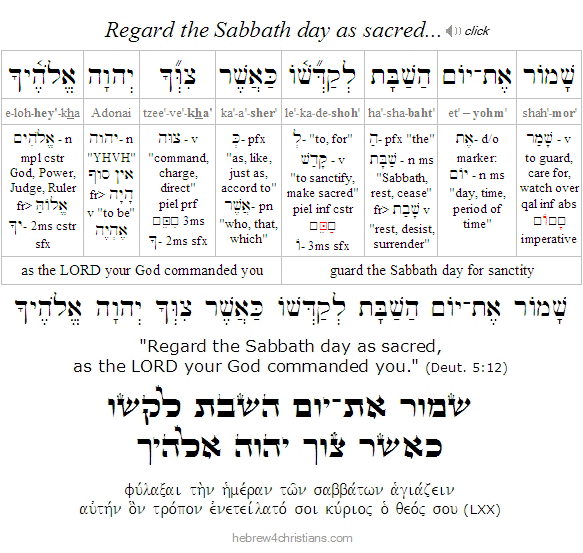 |
But what about the matter of Sabbath observance? Did Yeshua "break the Sabbath" or did he rather have a different understanding of its true meaning? When he was criticized by the Pharisees for allowing his disciples to pick some grain from the fields on the Sabbath, he responded that the Scriptures themselves testified that King David "broke the commandment" by eating the sacred bread reserved for the priests (i.e., the "showbread"), and noted that the priests likewise "profaned" the Sabbath by performing their avodah (service) at the Temple (Matt. 12:1-5). Yeshua then stated that "someone greater than the Temple is here" and went on to chastise his accusers by pointing out that the deeper principle of the Torah is to show mercy before sacrifice (see Hos. 6:6, Psalm 51:16-17, Prov. 15:8, Matt. 9:13, etc.). As the very "Lord of the Sabbath" (i,e., אֲדוֹן הַשַּׁבָּת, Matt. 12:8), Yeshua sanctioned acts of mercy and compassion to be performed on the consecrated day of rest. Indeed, just as the law permitted a male to be circumcised or an animal to be pulled out of a well on this day, for all the more reason should a person be healed on the Sabbath (Matt. 12:11-13). The Sabbath is not a day of (static) rest (or "non-doing") but is a means of providing rest for others by doing gemilut chasadim, that is, acts of chesed and mercy. Again, the Pharisees and religious authorities had confused the "inner" with the "outer" and made a category mistake, and therefore Yeshua said: הַשַּׁבָּת נֶעֶשְׂתָה לְמַעַן הָאָדָם וְלֹא הָאָדָם לְמַעַן הַשַּׁבָּת - "the Sabbath was made for man, and not man made for the Sabbath" (Mark 2:27). Of our Savior it was prophetically said: "Out of the ground that the LORD has cursed, this one shall bring us comfort (נָחַם) from our work and from the painful toil of our hands" (Gen. 5:29).
Design and Substance...
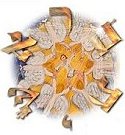
[ The following is related to last week's Torah portion, parashat Bereshit... ]
10.24.19 (Tishri 25, 5780) "In the beginning God created the heavens and the earth, and the earth was tohu va'vohu - without form and empty, and darkness was over the face of the deep..." (Gen. 1:1-2). The sages comment that knowing that God created the heavens and the earth makes us realize that by themselves earthly things are without purpose and substance, since life in the natural world is havel havalim (הֲבֵל הֲבָלִים), "vanity of vanities," apart from the design (form) and the substance of God. Faith in the upper "world" of God, that is, the heavenly realm, therefore evokes a sense of discontent and longing within the soul, and the temporal world and its pleasures will seem distracting and empty. This lack of form and emptiness was part of the original design of creation, however, since it was after God had created the universe that "he saw everything that he had made, and behold, it was very good" (Gen. 1:31).
Just as we cannot see light but by means of it we see other things, so with Yeshua, the Light of Life, the Form and Substance of God... By His illumination we are able to see the spiritual reality of God's Presence and invincible love... Yeshua is "the radiance of the glory of God and the exact imprint of his nature, and he upholds the universe by the word of his power" (Heb. 1:3). He is the Fountain of Life: by his light we see light (Psalm 36:9). Amen, God is light, and in Him is no darkness at all (1 John 1:5).
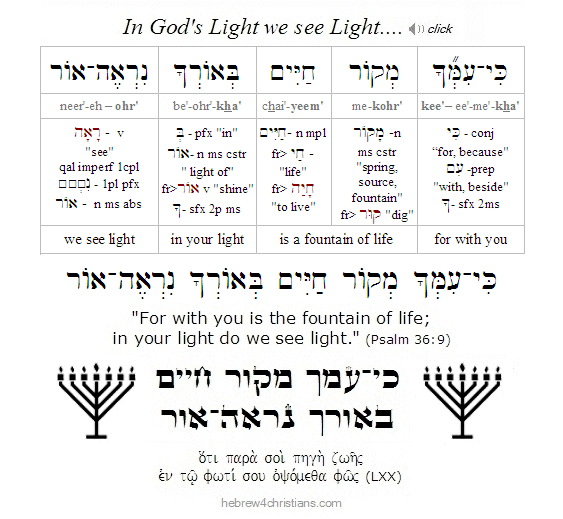 |
Note that some teachers claim that there was a "gap" in time between Gen. 1:1 and 1:2 in which the devil rebelled and a cosmic war between good and evil occurred that resulted in the fall of Satan. According to this view, God "started over" by saying yehi ohr, "Let there be light" (Gen. 1:3). There is no textual evidence for such a gap, however, and indeed there are reasons to reject this view as mistaken. First, the Ten Commandments state that God created all that existed - including time, space, angels - in six days (Exod. 20:11; John 1:3). Second, the devil could not have fallen before the creation since he was created "an anointed covering cherub" while in the original paradise (see Ezek. 28:13-15). Third, the taunt of the fall of the King of Babylon prefigured the fall of Satan, where the pride of the evil one was exposed: "You said in your heart, 'I will ascend to heaven; above the stars of God I will set my throne on high; I will sit on the mount of assembly in the far reaches of the north; I will ascend above the heights of the clouds; I will make myself like the Most High' (Isa. 14:13-14). Notice that the desired ascent was above the stars, above the clouds, etc., all of which were created when God made the expanse (Gen. 1:14-18). Finally, the Scriptures state that there was no sin or death until man brought them into the world (Rom. 5:12), and, since Torah tells us everything was very good at the end of the creation week (Gen. 1:31), Satan must have fallen sometime after Adam and Eve were created...
The Root of Sin and Death...

[ The following is related to last week's Torah portion, parashat Bereshit... ]
10.24.19 (Tishri 25, 5780) The commandment prohibiting eating from the Tree of Knowledge of good and evil (עֵץ הַדַּעַת טוֹב וָרָע) contained all other Torah commandments by implication (Gen. 2:17). The commandments not to worship idols, not to curse God, not to steal, not to kill, not to commit adultery, not to covet, and to enforce justice all derive from this primary commandment given in the garden. After all, Adam lost awareness of God by focusing on himself (idolatry) and failed to express love and reverence for God (profanity); he took from the Tree what was forbidden (coveting/stealing) which led to his own death (killing) and his own inner promiscuity (adultery). He failed to be vigilant and exercise justice by removing the presence of the tempting snake... Notice how these implications form the basic categories of the Ten Commandments, as well as the 613 commandments given later at Sinai. Looked at the other way, all of the commandments of Torah were concentrated into this single prohibition, since had Adam refrained from eating, he likewise would have refrained from all the other sins derived from this first great transgression. Moreover, since the essence of Torah is to trust God (i.e., "the righteous shall live by his faith"), when Adam sinned, he lost faith and the exile began... The Tree of Knowledge of good and evil is really the tree of the knowledge of sin and death. Just as the law defined sin to reveal our lethal spiritual condition, so the Tree of Knowledge led to the consequence of death and the revelation of our need for healing and deliverance given by Yeshua. "The law of the Spirit of life sets you free in Yeshua the Messiah from the law of sin and death" (Rom. 8:2).
The root of sin and death is found in the desire for "the knowledge of good and evil," that is, by seeking that which what defines sin, or that which is not God's will... It is the attempt to transcend God's authority for something beyond his sovereign good for us, and as such it denies reality and leads to exile and death. In this connection we note that the Hebrew phrase that warns of the consequence of eating from the Tree is mot tamut (מוֹת תָּמוּת), meaning "in dying you will die," which both implies the spiritual nature of death as separation from the divine life, but also the repeated experience of death – the ongoing knowledge of decay, dissolution, and loss...
Mystery and Creation...
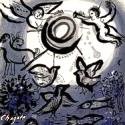
10.24.19 (Tishri 25, 5780) Why is there something rather than nothing? Why does anything exist at all? These are basic questions about the meaning of life. Where do we come from? What are we? Where are we going? "God created the universe," you say, yes, but exactly why did He do so? What purpose did he have in mind? In particular, why were you created? What is the purpose of your life? What do you hope to achieve with the limited amount of time you have on this earth? Such questions brood within the soul, even if they are hidden from consciousness by various forms of busyness and distraction. At the outset of serious thinking about anything at all we are confronted with such ultimate questions. What is real? Why are we here? Where are we going? What does God want from us?
"Where am I? Who am I? How did I come to be here? What is this thing called the world? How did I come into the world? Why was I not consulted? And If I am compelled to take part in it, where is the director? I want to see him." - Soren Kierkegaard
The Torah begins: "In the beginning God created..." (Gen. 1:1). No explanation is given, simply the mysterious declaration that God's eternal power is behind the realm of the world of appearances. We only begin to get some idea of God's hidden purposes as he reveals his design in Scripture. There we learn that God chose to create the universe yesh me'ayin, "out of nothing," in order to share his wisdom, glory, and love with other beings He created. "You created all things, and for Thy pleasure they are and were created" (Rev. 4:11). All this was for the sake of the Messiah, who built the world in chesed (חֶסֶד) and who forever reigns as the King of eternal life and love. "For from him and through him and to him are all things" (Rom. 11:36). The purpose of your life is to learn that you are beloved by God, to know and receive the infinite worth you have in his eyes, and to share that love with others. Indeed, you were created to be made part of God's great family, the Kingdom of Love...
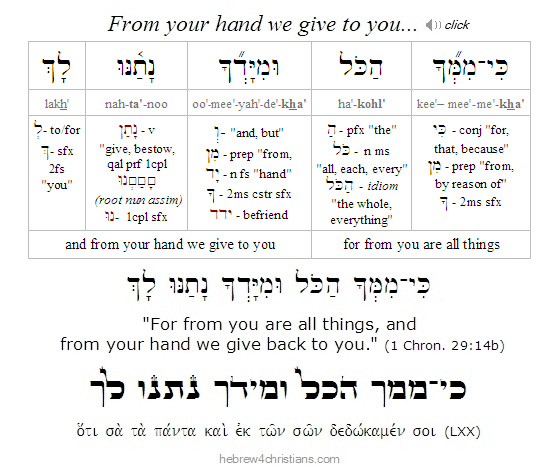 |
For more on this topic see: "Creation and the Kingdom of Love..."
Spelling out "Bereshit"...
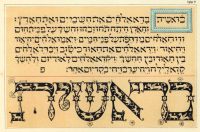
[ The following is related our Torah portion for this week, parashat Bereshit... ]
10.23.19 (Tishri 24, 5780) The 18th century Torah sage Vilna Gaon taught that the Hebrew word "bereshit" (בְּרֵאשִׁית), which is the very first word of the Bible, may be thought of as an acronym for meaningful spiritual life. The first letter, Bet (בּ), stands for bittachon (בִּטָּחוֹן), a word that means complete trust in God's love for your life; the next letter, Resh (ר), stands for ratzon (רָצוֹן), or the desire to live according to God's will; the central letter Aleph (א) stands for ahavah (אַהֲבָה), which is the love for God and for our fellow man (Deut. 6:5; Lev. 19:18); and the letter Shin (שׁ) is for shetikah (שְׁתִיקָה), or "keeping silent," which is the cardinal virtue of godly self-control and wisdom (James 1:26; 3:1-18; Psalm 34:13; Prov. 13:3, etc.). The letter Yod (י) is for yirah (יִרְאָה), or reverence for God's authority and dignity; and finally, the letter Tav (ת) is for Torah (תּוֹרָה), the study of which brings transformation and sanctity to your life (Psalm 19:7; Psalm 119:105; Prov. 6:23; Matt. 5:17-19; 2 Tim. 2:15-16).
Torah begins with the word 'bereshit' (בְּרֵאשִׁית), which may also be understood to say 'God created the world for the sake of the beginning.' All the Creator asks is that you make a beginning, that you turn in the right direction." Repent and believe -- what? Believe that you are loved, you need God's compassion and healing in your life... Indeed, we never really get past the first steps made in earnestness toward God. In that sense we are "always beginning," since we never get beyond the need of the heart to turn to God. We are all incomplete, awaiting the end for which we were created, and therefore we are always calling on the LORD, always abiding in Him, always seeking His face... We begin, we end, and in everything Yeshua is the Center of our hearts...
Shrine of the Heart...
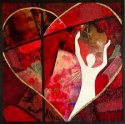
10.23.19 (Tishri 24, 5780) The sages have said that salvation may be likened to rebirth that delivers us from the "narrow places of Egypt" (i.e., from mitzrayim: -מ, "from," and צַר, "narrow") into newness of life... The first step of lasting deliverance (יְשׁוּעָה) is to receive the great revelation: "I AM the Lord your God" (אָנכִי יְהוָה אֱלהֶיךָ) which begins our healing process (Exod. 20:2). We are set free from our bonds to surface appearances when we are made fully conscious of God's Presence, since we then understand everything in holy relationship with Ultimate Reality, the Ground and Source of all life (Acts 17:28). As it says in our Scriptures: "We look not to the things that are seen but to the things that are unseen: For the things that are seen are transient, but the things that are unseen are eternal" (2 Cor. 4:18). Therefore God says in our Torah, "Make for me a sacred place (מִקְדָּשׁ) so I can dwell within you" (Exod. 25:8). Each of us is created to be a "mishkan," that is, a dwelling place for God. Making a sanctuary of the heart means choosing to stay connected with reality, attuning the heart to hear the Voice of the Spirit, and consciously walking before the Divine Presence.
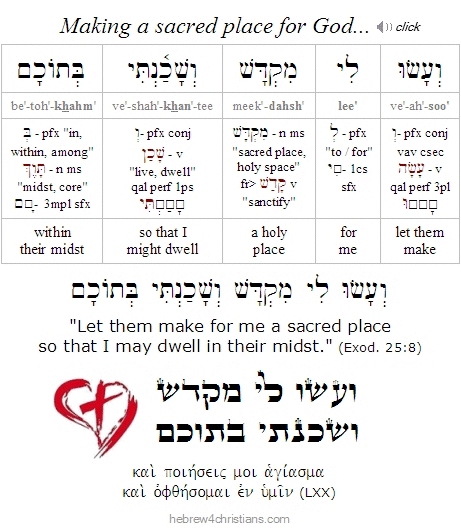 |
King David wrote, עוֹלָם חֶסֶד יִבָּנֶה / olam chesed yibaneh: "The world is built with love" (Psalm 89:2), and so indeed is God's place within our hearts... We esteem God as lovely and beautiful and wonderful and precious to us; we enshrine him and lift up our souls unto him in adoration and thanks. When we are willing to take part in the building of the sanctuary, God reveals to us "the pattern," that is, the inspiration that evidences His presence in our lives. As Yeshua said, "Let your light so shine" (Matt. 5:16).
"Knowing God is the condition for the sanctification of a human being by God's assistance and according to His intention. Wherever God is, there He is always creating... He wants to create a new human being. To need God is to become new. And to know God is the crucial thing." - Kierkegaard
Prayer and Humility...

10.23.19 (Tishri 24, 5780) "Abraham answered and said, "Behold, I have undertaken to speak to the Lord, I who am but dust and ashes" (עָפָר וָאֵפֶר, Gen. 18:27). This teaches that we cannot draw near to God apart from profound humility, since God's truth is revealed to the meek and lowly of heart but remains hidden from the proud (James 4:6). As it is written: "For this is what the high and lifted up One says, the One who abides forever, whose Name is Holy (קָדוֹשׁ): "I dwell in a high and holy place, but also with the broken and lowly of spirit, to revive the spirit of the lowly (i.e., ruach shefalim: רוּחַ שְׁפָלִים), and to revive the heart of the crushed" (i.e., lev nidka'im: לֵב נִדְכָּאִים) [Isa. 57:15]. Here we learn that God gives life (revives) to those who are "lowly in spirit" (שְׁפַל־רוּחַ), that is, to those who understand their own nothingness and complete dependence on Him for life... Indeed, the "heart of the crushed" (לֵב נִדכֶּה) refers to being crushed "to the dust" -- the same word (dakka: דַּכָּא) is used to describe how Yeshua was "crushed for our iniquities" (see Isa. 53:10). William James called this deep work of the spiritual life "Zerrissenheit," a term that can be translated as "torn-to-pieces-hood," or a state of being utterly broken and in disarray... From the point of view of our dependence on God for salvation, "dakka" refers to humility and contrition we express in light of God's unmerited favor and love for our souls. We humbly identify with the death of Messiah offered on our behalf; we find healing and acceptance in the Presence of the One who was torn to pieces and made dust for our merit. Humility (עֲנָוָה) is essential to awareness of God in the truth. Shuvah Yisrael!
כִּי כה אָמַר רָם וְנִשָּׂא שׁכֵן עַד וְקָדוֹשׁ שְׁמוֹ
מָרוֹם וְקָדוֹשׁ אֶשְׁכּוֹן וְאֶת־דַּכָּא וּשְׁפַל־רוּחַ
לְהַחֲיוֹת רוּחַ שְׁפָלִים וּלְהַחֲיוֹת לֵב נִדְכָּאִים
kee · khoh · a·mar · rahm · ve·nee·sah · sho·khen · ahd · ve·ka·dohsh · she·moh
ma·rohm · ve·ka·dosh · esh·kohn · ve·et · da·kah · oosh·fahl · roo·ach
le·ha·cha·yot · roo·ach · she·fa·leem · oo·le·ha·cha·yoht · lev · need·ka·eem

"For this is what the high and lifted up One says, the One who abides forever,
whose Name is Holy: "I dwell in a high and holy place, but also with the broken
and lowly of spirit, to revive the spirit of the lowly and to revive the heart of the crushed."
(Isa. 57:15)

Download Study Card
The Fire of Faith...

10.22.19 (Tishri 23, 5780) "The LORD came from Sinai and dawned from Seir upon us; he shone forth from Mount Paran; he came from myriad of holy ones, with flaming fire at his right hand" (Deut. 33:2). Notice that "flaming fire" is better translated as "fiery truth," from esh (אֵשׁ), meaning "fire," and dat (דָּת), meaning "decree," or "knowledge" (i.e., da'at: דַּעַת). The idea of "fiery truth" is related to the concept of the divine logos (ΛΟΓΟΣ), or the "Word of God," the underlying creative reason for all things in the universe (the Hellenistic idea of the logos, dating from the time of Heraclitus (6th cent. BC), perhaps later influenced the personification of the Word of God called the "memra" [מֵמְרָא] that appeared later in the Aramaic Onkelos). Some have interpreted the phrase as "fiery faith," since the revelation of the truth (i.e., Torah) was always meant to serve that greater end... In the Torah scroll, esh and dat are joined together, appearing as one word (i.e., eshdat: אֵשְׁדָּת), a word that otherwise is translated "foundation." In other words, the foundation of God's kingdom is revealed in the passion to do his will, to honor the LORD as King by exercising a "fiery faith" that is aligned with the revelation of divine truth...
יְהוָה מִסִּינַי בָּא וְזָרַח מִשֵּׂעִיר לָמוֹ
הוֹפִיעַ מֵהַר פָּארָן וְאָתָה מֵרִבְבת קדֶשׁ
מֵימִינוֹ אֵשְׁדָּת לָמוֹ
Adonai mee·see·nai bah, ve·za·rach mee·se'eer lah·mo
ho·fee·a me·har pa·rahn ve·a·tah me·ree·ve·voht koh·desh
me·mee·noh esh·dat lah·mo


"The LORD came from Sinai and dawned from Seir upon us;
he shone forth from Mount Paran; he came from myriad of holy ones,
with flaming fire at his right hand."
(Deut. 33:2)
The midrash Tanchuma states that the phrase esh dat (אֵשׁ דָּת) is actually a description of the Torah itself: "The Torah is written black fire on white fire," which is interpreted to mean that both the letters and spaces between them constitute the "whole" of the Torah. Another way to say this is that the "white fire" represents God's Spirit, who gives the black fire its foundation (אֵשְׁדָּת) and "breath." For more on this see: "A Fiery Faith..."
The Word of Creation...

10.22.19 (Tishri 23, 5780) The Torah begins with the declaration, "In the beginning Elohim (God) created" (בְּרֵאשִׁית בָּרָא אֱלהִים), where the Hebrew word "Elohim" is written in the grammatical plural form (i.e., אֱלהִים, derived from the singular form אֵל, God), not because there is more than one Creator, of course, since the Hebrew verb bara (בָּרָא) used in this declaration is grammatically singular, that is, "He created." Moreover the Torah clearly affirms that "God is one" (יְהוָה אֶחָד), though note that the word "one" (i.e., echad: אֶחָד) means something more than mere numerical identity (i.e., yachid: יָחִיד) but instead unity in plurality, a "transcendental" oneness that points to the unfathomable mystery of the Name YHVH (יהוה) and the unity of the Godhead (אֵין סוֹף). Therefore the plural name Elohim is sometimes called "pluralis intensitatis" which denotes in one Person all the powers and influences by which the universe was first created and now is governed and sustained, though its grammatical form is consonant with the triune oneness of hashilush ha'kodesh (השילוש הקדוש).
שְׁמַע אֵלַי יַעֲקב וְיִשְׂרָאֵל מְקרָאִי
אֲנִי־הוּא אֲנִי רִאשׁוֹן אַף אֲנִי אַחֲרוֹן
she-ma · ei-lai - ya-a-kohv · ve-yees-ra-el · me-koh-rah-ee
a-nee-hoo · a-nee · ree-shohn · af · a-nee · a-cha-rohn

"Listen to me, O Jacob, and Israel, whom I called.
I AM he; I AM the first, and I AM the last."
(Isa. 48:12; cp. Rev. 22:13)

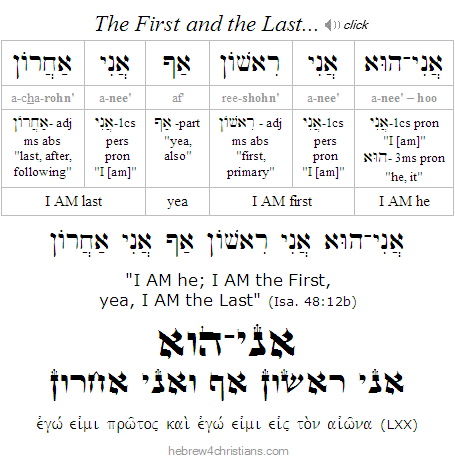
Personal Update: Please remember me in your prayers, friends. I am under constant attack it seems, and my health is a challenge. My eyes, in particular, have been causing me much suffering lately. Thank you for your concern and prayers for this ministry. Shalom. - John
The Song of Desire...

[ The following is related to our Torah portion for this week, parashat Bereshit... ]
10.22.19 (Tishri 23, 5780) The midrash says that the word "bereshit" (בְּרֵאשִׁית) can be arranged to spell shir te'ev (שִׁיר תְּאֵב), meaning the "song of desire." This is the holy plea sounded by all of creation to be made whole, healed, and ultimately perfected. As it says in our Scriptures: "For the creation was subjected to futility, not willingly, but because of him who subjected it in hope" (Rom. 8:20). Therefore when we take hold of Yeshua's heart, vision, and mission, we partake in the repair of the world (תיקון עולם) by testifying of God's healing love given in Messiah. We begin and end our journey to life with the "song of desire" on our lips – that is, with our heart awakened to its need for God. As it says: "The LORD is near to all who call on him, to all who call on him in truth. He fulfills the desire of those who fear him; he also hears their cry and saves them" (Psalm 145:18-19).
אֲנִי לְדוֹדִי וְעָלַי תְּשׁוּקָתוֹ
a·nee · le'doh·dee · ve·ah·lai · te·shoo·ka·toh

"I am my beloved's, and his desire is upon me."
(Song 7:10)


Seeing the Unseen...

[ The holiday of Simchat Torah begins this evening at sundown... ]
10.22.19 (Tishri 23, 5780) The Torah begins with the Hebrew letter Bet (בּ), representing the number two, because God created not one world, but two. There is the realm of this world, called olam ha-zeh (עוֹלָם הַזֶּה), and there is the realm of the world to come, called olam ha-ba (עוֹלָם הַבָּא). The letter Bet therefore represents a two-fold house (בַּיִת) - the "house" of physical creation and the "house" of spiritual reality. The letter itself is formed from three Vavs (ו), which add up to 18, the same value for the word chai (חי), or "alive." We are strangers and sojourners here. Life is this present world is likened to a walking a corridor that leads to the next world. Awaken to your eternal end in the world to come: "Know whence you came and to where you are going and before Whom you are destined to give a final accounting" (Pirkei Avot 3:1). Learn to discern "the invisible things of Him from the creation of the world" (Rom. 1:20). "So do not lose heart. Though our outer self is wasting away, our inner self is being renewed day by day. For this light momentary affliction is preparing for us an eternal weight of glory beyond all comparison, as we look not to the things that are seen but to the things that are unseen. For the things that are seen are transient, but the things that are unseen are eternal" (2 Cor. 4:16-18). Press on toward the goal for the prize of the upward call of God in Yeshua our Messiah (Phil. 3:14).
 |
Sunset Sukkot Day 1
In the Beginning (בְּרֵאשִׁית)

10.21.19 (Tishri 22, 5780) Our Torah reading for this week (i.e., parashat Bereshit) commences the Bible with these famous words: "In the beginning, God created the heavens and the earth" (בְּרֵאשִׁית בָּרָא אֱלהִים אֵת הַשָּׁמַיִם וְאֵת הָאָרֶץ, Gen. 1:1). Notice, however, that the Hebrew word translated as "beginning" (i.e., bereshit: בְּרֵאשִׁיתּ) means "with wisdom," since the word is based on the root idea of rosh (ראשׁ, "head," or "chief"), which suggests what is most important, i.e., "at the head of (all things)," "bechor," etc. Notice further the direct object "marker" (i.e., אֵת) of the verb bara (בָּרָא) in this opening verse. Read literally, it would say "With wisdom (or "within his own mind [i.e., rosh: ראשׁ] or counsel") God created all things - Aleph through Tav (אֵת) - namely, the heavens and the earth." Some have said the direct object marker here refers to Yeshua, and while it is indeed true that He is the "Aleph and Tav" (Rev 1:8), the Direct Object of the Universe -- "the One who is and who was and who is to come, the Almighty" -- in this verse he is Elohim (אֱלהִים), our Creator, which agrees with many other Scriptures such as Col. 1:15-17, Heb. 1:1-3; John 1:1-14; Eph 1:21; Phil. 2:9-11, Rom. 14:11 (with Isa. 45:22-24); Rom. 11:36, etc. Others have said "Aleph-Tav" here refers to the holy alphabet, or the power coming from the Word of God.
 |
Shabbat Bereshit...
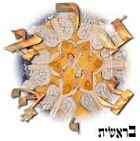
[ The Sabbath that immediately follows Simchat Torah is called Shabbat Bereshit... ]
10.21.19 (Tishri 22, 5780) In Jewish tradition, the word "Bereshit" can refer to either the first Torah portion of the Bible (i.e., Gen. 1:1-6:8) or to the first book of the Torah itself. When it is used to refer to the Torah portion, it is called "parashat Bereshit," and the text covers the creation of the universe, including Adam and Eve, the subsequent transgression of Adam and Eve, the murder of Abel by humanity's firstborn son Cain, and the increasing depravity of the generations until the time of the calling of Noah. When it is used to refer to the book, however, it is called "sefer Bereshit," or the "Book of Bereshit," and the text covers everything from the creation of the universe to the descent of Jacob's son Joseph into Egypt in anticipation of the great Exodus. Note that the ancient Greek translation of the Bible (i.e., the Septuagint) called this book "Genesis," (Γένεσις: "birth", "origin"), a name that was carried over in subsequent Latin and English translations.
The first Torah portion of Bereshit opens with this succinct statement about the creative activity of God: "In the beginning (i.e., "bereshit") God (i.e., Elohim) created the heavens and the earth." Note immediately that the Scriptures therefore begin - not from the first person perspective of some man's understanding of God - but from an omniscient third person perspective, a Voice that reveals the Glorious Power that created the entire cosmos by means of His Word. The very first verse of the Bible, then, alludes to the triune nature of God, as further indicated by the use of the plural form of the name Elohim with the singular verb bara (he created). Indeed, the word bereshit itself includes the root idea of "head" (i.e., rosh), which suggests the "head of all things," that is, to the Messiah, the Creative Word of God who is the "head of all beginning and authority" and through Whom and for Whom all things were created (Col. 1:16; 2:10).
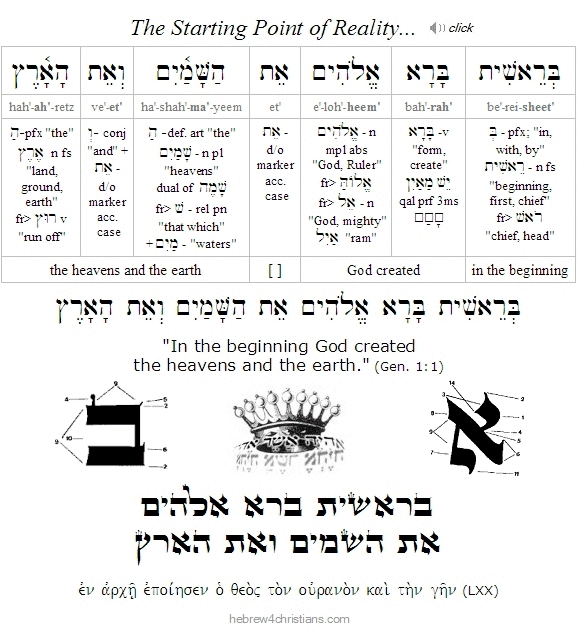 |
After this breathtaking opening line, shrouded as it is in mystery, the Torah describes how God created the universe yesh me'ayin - out of nothing (Heb. 1:3) over a six "day" period. On the first day God created darkness and light; on the second day He created the atmosphere, dividing the "upper" from the "lower" waters. On the third day He set the boundaries of land and sea and seeded the earth with trees and vegetation. On the fourth day He fixed the position of the sun, moon and stars as timekeepers and illuminators of the earth. Fish, birds and reptiles were created on the fifth day; and land animals, and finally the human being, on the sixth. God ceased from His creative work on the seventh day, and sanctified it as a day of rest: the very first Shabbat...
 |
In addition to this general, "day by day" account of the creation of the universe by God, the Torah provides a more focused account about how God formed Adam's body from the dust of the earth and blew into his nostrils the "breath of life" so that he became a "living soul." Notice that the more detailed account includes reference to the LORD God, the first time the name YHVH is used in the Scriptures. Interestingly, in this second account the earth is described as a sort of "desert." The earth was barren of vegetation, no rain had yet fallen upon the earth, and the LORD formed the man from the "dust from the ground." After breathing into him so that he became a living soul, God planted a garden in Eden, "in the east," and there caused every tree that was pleasant to the sight and good for food to spring up from the ground. In the very midst of this orchard were two special trees: the "Tree of Life" and the "Tree of the knowledge of good and evil" (עֵץ הַדַּעַת טוֹב וָרָע). God then instructed the man to tend the orchard and to eat from whatsoever tree he desired, though he was warned not to eat from the tree of knowledge of good and evil, "for in the day that you eat of it you shall surely die" (Gen. 2:17).
 |
The Circle of Torah...
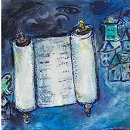
10.21.19 (Tishri 22, 5780) Each week in synagogues across the world a portion from the Torah (called a parashah) is studied, discussed, and chanted. Jewish tradition has divided the Torah into 54 of these portions - roughly one for each week of the year - so that in the course of a year the entire Torah has been recited during services. The final reading of this cycle occurs on the holiday of Simchat Torah ("Joy of the Torah"), which immediately follows the holiday week of Sukkot. On Simchat Torah, we celebrate both the completion of the year's Torah Reading cycle as well as the start of a brand new cycle. Each Jewish year, then, we "rewind" the scroll and begin again. The sages have wisely said that you cannot compare studying Torah for the 49th time to studying it for the 50th time....
Our spiritual inheritance is bound up with the Torah: it is part of our story, our history, our heritage (Gal. 3:7; Rom. 4:16; Luke 24:27). The stories of Torah serve as parables and allegories that inform the deeper meaning of the ministry of Messiah: "Now these things happened to them as an example, but they were written down for our instruction, on whom the end of the ages has come (1 Cor. 10:11). "For whatever was written in former days was written for our instruction, that through endurance and through the encouragement of the Scriptures we might have hope" (Rom.15:4). "All Scripture is inspired by God..." which refers first of all to the Torah, the Writings, and the Prophets which attest to the Messiah (2 Tim. 3:16-17). You are therefore no longer a stranger or outsider to the heritage of the LORD but a partaker of the covenantal blessings (Eph. 2:12,19). Disciples of Yeshua are called talmidim (תַּלְמִידִים) -- a word that comes from lamad (לָמַד) meaning "to learn." Among other things, then, following the Messiah means becoming a student of the Scriptures He loved and fulfilled (Matt. 5:17-18; Luke 24:44-45). Only after learning from Yeshua as your Teacher will you be equipped to "go to all the nations and teach" others (Matt. 28:19).
We read V'zot HaBerakhah ("this is the blessing") at the end of Simchat Torah, which is the final portion of the entire Torah itself... After reading this portion, we "rewind the scroll" back to the beginning to begin reading parashat Bereshit. We do this every year because Talmud Torah - the study of Torah - is an ongoing venture in the life of a Jew. In this connection, it is interesting to note that the very first letter of the Torah is the Bet (בּ) in the word bereshit (בְּרֵאשִׁית), and the very last letter of the Torah is the Lamed (ל) in the word Israel (יִשְׂרָאֵל). Putting these letters together we get the word lev (לֵב), "heart," suggesting that the entire Torah - from the first letter to the last - reveals the heart and love of God for us... Moreover, the first letter of Scripture is a Bet (בּ), as explained above, and the last letter is a Nun (ן) in the word "Amen" (אָמֵן), so the whole Bible - from beginning to end - reveals the Person of God the Son (בֶּן) for us...
Since we begin the Torah again for a new year, it is worthwhile to remind ourselves that the Scriptures speaks from an omniscient, "third person" perspective. When we read, "In the beginning, God (אֱלהִים) created the heavens and the earth," we must ask who exactly is speaking? Who is the narrator of the Torah? The very next verse states that the Spirit of God (רוּחַ אֱלהִים) was hovering over the face of the waters (Gen. 1:2), followed by the first "direct quote" of God Himself: i.e., "Let there be light" (Gen. 1:3). The creative activity of Elohim (God) and the presence of Ruach Elohim (the Spirit of God) are therefore narrated by an omniscient Voice or "Word of God." Obviously the Spirit of God is God Himself (who else?), just as the Word of God is likewise God Himself, and therefore the first verses of the Torah reveal the nature of the Godhead. God is One in the sense of echdut, "unity," "oneness," and and so on, though not "one" in the monistic sense of a solipsistic mind (νοῦς). God is beyond all theological predications: there can be no sense of "person" apart from relationship, and therefore God's Personhood entirely transcends all our finite conceptions - and yet God forever is One...
Note: The holiday of Simchat Torah has its precedent in the Hak'hel (הקהל) ceremony where the people were assembled to hear the reading of the Torah by the king of Israel once every seven years just after the holiday of Sukkot (see Deut. 31:10:13).
Vapors of Time...
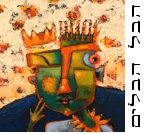
10.20.19 (Tishri 21, 5780) The book of Ecclesiastes (megillat Kohelet) is always read during the festive holiday of Sukkot, though you might be surprised to learn that many of the early sages did not want it included as part of the Jewish Scriptures. After all, the philosophy of Kohelet - that we are incapable of fully understanding the purposes of the world, and therefore much of what we think is important is really havel havalim (הֲבֵל הֲבָלִים), "vanity of vanities" - is contrary to the theology of reward and punishment found in the writings of Moses. This question is not unlike the Book of Job and the mysterious question as to why the righteous suffer.... It is to their credit that the Jewish sages finally decided to include Ecclesiastes as part of the accepted canon, however, since it takes humility to admit that we must continue to seek God, despite uncertainty in this world. As mentioned the other day, King Solomon concludes his reflection as follows: "Fear God and keep his commandments: ki zeh kol-ha'adam (כִּי־זֶה כָּל־הָאָדָם), "for this is the whole man" (Eccl. 12:13).
For more on this subject, see Sukkot and Vanity...
With blessing on your lips...
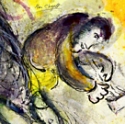
10.20.19 (Tishri 21, 5780) The concluding portion of the Torah -- the very last section of the Book of Deuteronomy -- is called "V'zot Haberakhah" (וְזאת הַבְּרָכָה) which records Moses' last words to the people just before his death. It is always read just after the festival of Sukkot on the holiday called "Simchat Torah" (i.e., "Celebration of the Torah"). After reading this portion, we will "rewind the scroll" back to Parashat Bereshit to begin reading the Torah all over again. We do this every year because Talmud Torah - the study of Torah - never ends! A true student of Scripture cannot claim to have completed the study of the Torah, for the implications of such study extend forever. And so the cycle continues, over and over in a continuous chain of study, ever widening, and all encompassing.
The phrase v'zot haberakhah (וְזאת הַבְּרָכָה) means "this is the blessing," and it seems fitting that Moses concluded his life with a blessing of the people. The patriarchal practice of a father imparting his blessing before departing from this world goes back to Noah (Gen. 9:25-27), Isaac (Gen. 27:4) and Jacob (Gen. 49), and many of the sages note that Moses' blessing here extends or complements Jacob's earlier blessing given in Egypt (may we likewise finish our lives with blessing on our lips, friends).
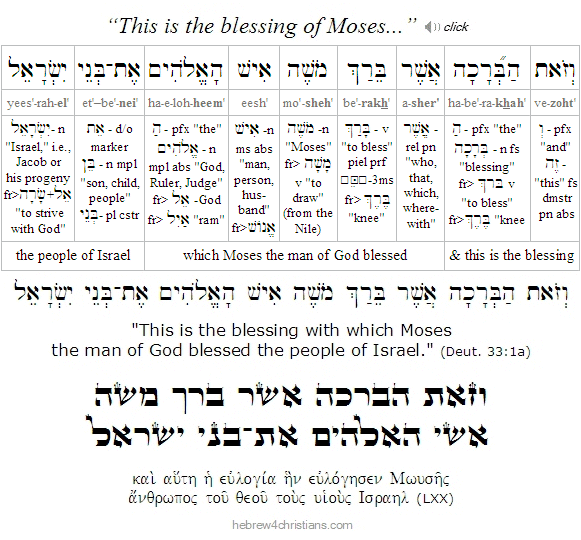 |
Moses' blessing is especially significant in light of the prophetic song (i.e., the "Ha'azinu") which foretold of Israel's future sins and terrible punishments. Unlike the harshness of that prophecy, the message of this portion is entirely one of blessing - without correction or warning directed to the tribes (though the tribe of Simeon is oddly omitted from the blessing)... It is as if all sins are forgotten and all is now forgiven. Moses wanted to leave the people with a positive memory of him. There is a closing benediction for all the tribes in which Moses reminds them of the abundance they are to enjoy and the goodness that God has bestowed upon them.
At the end of the Torah portion Moses was instructed to ascend Mount Nebo where God revealed to him all of the Promised Land – from the territory of Dan in the north to the Negev in the south. After receiving this great vision, Moses died on Adar 7 (his birthday) at the age of 120, at an unknown burial site. After a 30 day period of national mourning, Joshua assumed leadership over the people of Israel.
The portion (as well as the Torah itself) ends with the statement that no prophet ever again arose in Israel like Moses, "who knew the LORD panim el-panim, "face to face." He did all the signs and wonders the LORD had sent him to do in the land of Egypt, to Pharaoh, all his servants, and the whole land, and he displayed great power and awesome might in view of all Israel" (Deut. 34:10-12). Chazak, chazak chaverim!
What God Asks of You...
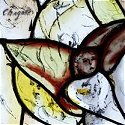
10.18.19 (Tishri 19, 5780) In the Scriptures it is written: "And now, Israel, what does the LORD your God ask of you, but to revere the LORD your God, to walk in all his ways, to love him, to serve the LORD your God with all your heart and with all your soul" (Deut. 10:12). Abraham Heschel wrote, "Awe is an intuition for the dignity of all things, a realization that things not only are what they are but also stand, however remotely, for something supreme. Awe is a sense for transcendence, for the mystery beyond all things. It is "the beginning of wisdom" (Psalm 111:10). We start with awe and that leads us to wisdom. First we must learn to properly revere the LORD and only then will we be able to walk (לָלֶכֶת) in His ways, to love (לְאַהֲבָה) Him, and to serve (לַעֲבד) Him with all our heart and soul. The awesome love of God for us is the end or goal of Torah as revealed in our Messiah. We were both created and redeemed in order to know, love, and worship God forever.
In another place it is written: "He has told you, O man, what is good; and what does the LORD ask of you but to do justice, and to love kindness, and to walk humbly with your God?" (Micah 6:8), which again presupposes that we fear the LORD. Indeed, "the fear of the LORD is the beginning of wisdom (רֵאשִׁית חָכְמָה)." Without awe of God, you will walk in darkness and be unable to turn away from evil (Psalm 111:10; Prov. 1:7; 9:10; 10:27; etc.), as it says: "the fear of the LORD leads to life" (יִרְאַת יְהוָה לְחַיִּים, lit. "is for life"). Shabbat Shalom, friends...
Sukkot and Salvation...
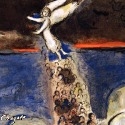
10.18.19 (Tishri 19, 5780) The holiday of Sukkot remembers the journey of the redeemed people of God - first from Egypt, then to Sinai, and then into the void of the desert places.... The repeated failures of the Israelites in the wilderness was meant to reveal the insufficiency of "Egyptian thinking" by demonstrating God's faithful love and ongoing care. The entire ordeal in the desert was a "Sukkot experience" that pointed beyond Sinai....
Sukkot symbolizes the journey of faith by means of erecting a sukkah - a flimsy shelter that we are to "live in" for seven days. The sukkah is meant to help us ask ourselves: Where is the true home we seek? Where is the true shelter of our lives? The first Jew (Abram) was called ha-ivri (הָעִבְרִי) - "the Hebrew," a term that means "one who has crossed over" (עָבַר) from another place. When he heeded the call Lekh lekha (לך־לך), "go for yourself," it was Abram's walk of faith that made him into a Jew.... He left the comforts of Ur to become a tent dweller who became a "stranger and sojourner" with God. Similarly, the Jewish people as a whole were forced to leave the "security" of Egypt and journey into the unknown in order to realize the promises of God. Sukkot reminds us that our security is neither found in political power structures nor in the concrete walls of our homes, but solely in the Presence of God. Our freedom as God's children is at stake in the matter of redemption, and God takes it very seriously when we exchange a supposed source of security for the venture of true faith....
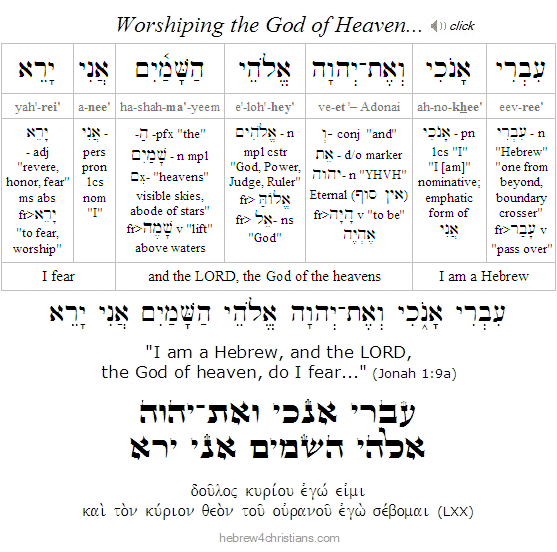 |
So where is the true home you seek? Are you clinging to hope in this world and its counterfeit security? Are you willing to sacrifice your dignity as a child of God for the protection of the "State"? When God redeemed Israel from Egypt, it was a rebirth experience. Passover represented the means of redemption (the blood of the lamb), Shavuot represented the revelation of the holiness of God (the Sinai experience), and Sukkot represented the walk of faith as reborn and redeemed children. God took Israel out of Egypt (i.e., out of the world) in order to reveal to them who He is -- and who they were in relationship with Him.... The pattern remains the same. The world system is a form of slavery, and Sukkot reveals how God bypasses the world to care for His people...
For more on this topic, see "Sukkot and Freedom." Chag Sukkot Sameach friends!
Some Sukkot Family Photos...

10.18.19 (Tishri 19, 5780) During the holiday of Sukkot we construct a sukkah, a "booth" or temporary structure, that we will "live in" for the holiday week. Among other things, living in a sukkah is meant to recall God's surrounding love and care for us as we make our journey through the desert of this world on our way to Zion... It is an attempt to make visible the invisible, to catch a glimpse of God's abiding glory. On a spiritual level, however, the essence of Sukkot is "dwelling" or "abiding" in the "cloud" of the Divine Presence. And though the LORD is forever enthroned in heaven as our Creator, our King, and our loving Deliverer, and though indeed the heavens shout out his praise and the whole earth is filled with His glory (Isa. 6:3), nevertheless we must make a dwelling within our hearts. In great humility the LORD stands at the door and knocks (Rev. 3:20). "Where does God dwell," it is asked, "but where He is given a place, a sanctuary, a throne within the heart."
 |
Left-to-right (top): 1. Olga lights yom tov candles; 2. Josiah waves lulav; 3. flowers on the table;
4. Sabba Vadim enjoying the holiday
(bottom): 1. Emanuel waves the lulav; 2. Judah reciting the lulav blessing; 3. Sukkot decorations;
4) Olga waves the lulav
Left-to-right (top): 1. lulav etrog; 2. Peter adding lights; 3. Sukkah poster;
4. Savta Irina waves the lulav bouquet
(bottom): 1. John waves the lulav; 2. Ushpiz Soana; 3. Yasha and Veronica;
4) hanging ornaments for the sukah schach (i.e., roof)
There are two great questions God always is asking us. The first is "who do you say that I am?" and the second is "will you make a place for me?" Being in a love relationship with God is the goal of life, the "end of the law," and the reason we were created. But we cannot love God apart from understanding his passion for us. The LORD is the "Jealous God," a Consuming Fire, the One who desires all of our heart on the altar (Luke 9:23). Therefore the very first commandment is simply אָנכִי יְהוָה אֱלהֶיךָ, "I AM the LORD your God" (Exod. 20:2), because without "making a place" God's love within your heart, nothing else will follow.
Note: To see larger pictures of our Sukkot celebrations, click here.
Yeshua the Hidden Guest...
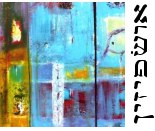
[ The following is related to the holiday of Sukkot, or the Feast of Tabernacles... ]
10.17.19 (Tishri 18, 5780) The Aramaic word "ushpizin" (אוּשְׁפִּיזִין) refers to the seven "guests" whom we remember and honor during the weeklong festival of Sukkot, namely: Abraham, Isaac, Jacob, Joseph, Moses, Aaron, and King David, respectively. According to Jewish tradition, on each night a different guest (i.e., ushpiz: אוּשְׁפִּיז) enters the sukkah, and we are to symbolically welcome them by offering them a place at our table (this is similar to the tradition of Elijah's Cup during Passover). On the first night comes Abraham; on the second, Isaac, and so on. In the Gospel of John we read that Yeshua said he go up to the Feast of Tabernacles "in secret" (ἐν κρυπτῷ), like an ushpiz (John 7:10). During the "middle of the festival," perhaps on the fourth day (the "Day of Joseph"), Yeshua went to the Temple and began teaching the people (John 7:14), and on the last great day, called Hoshana Rabbah, when the High Priest led a parade to the pool of Siloam during the water libation ritual, Yeshua stood up and cried out, "If anyone thirsts, let him come to me and drink" (John 7:38). Finally, on the morning following the festival, called Shemini Atzeret, Yeshua returned to the Temple and said, "I am the light of the world. Whoever follows me will not walk in darkness, but will have the light of life" (John 8:12), recalling the words of the prophets: "On that day there shall be no light... and living waters shall flow out of Jerusalem; And the LORD will be king over all the earth. On that day the LORD will be one and his name one" (Zech. 14:6,9; Isa. 13:10; 30:26).
Note: For more on this see, "The Seven Ushpizin: Yeshua as the Hidden Guest."
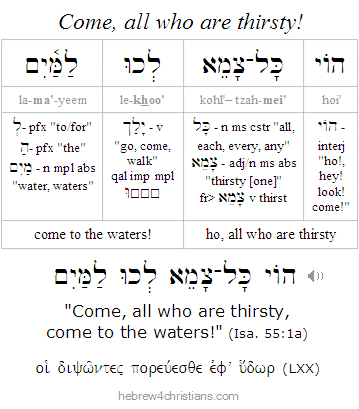 |
Revival of Heart...

10.17.19 (Tishri 18, 5780) "O Lord, all my desire is before you; my groaning is not hidden from you" (Psalm 38:9). Until the Master of the Universe helps, the Master of the Universe will help... Amen. God will help us, and he will help us before we even know that he helps us! Therefore do not be anxious, and do not fear, for "your heavenly Father knows what you need before you ask Him" (Matt. 6:8). God will make everything new, in the name and for the sake of his great love...
אֲדנָי נֶגְדְּךָ כָל־תַּאֲוָתִי
וְאַנְחָתִי מִמְּךָ לא־נִסְתָּרָה
Adonai · neg·de·kha · khol-ta·a·va·tee
ve·an·cha·tee · mee·me·kha · lo-nees·tah'·rah

"O Lord, all my desire is before you;
my groaning is not hidden from you."
Hebrew Study Card

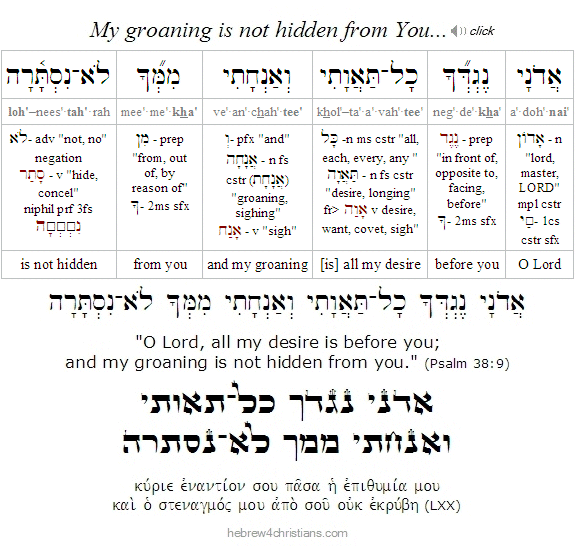
It is written, "The world is built in chesed," olam chesed yibaneh (עוֹלָם חֶסֶד יִבָּנֶה), which means that our inner life is being built by God's love... "So do not lose heart. Though our outer self is wasting away, our inner self is being renewed day by day. For this light momentary affliction is preparing for us an eternal weight of glory (αἰώνιον βάρος δόξης) beyond all comparison, as we look not to the things that are seen but to the things that are unseen. For the things that are seen are transient, but the things that are unseen are eternal" (2 Cor. 4:16-19). We must trust in God's unseen hand for our good.
Therefore "let the one who walks in darkness and has no light trust in the Name of the LORD (יִבְטַח בְּשֵׁם יְהוָה) and rely on his God" (Isa. 50:10). Trusting in God (i.e., bittachon - בִּטָּחוֹן) does not mean that we are obligated to affirm that this is "the best of all possible worlds," though it does mean we believe that eventually God will wipe away every tear and make all things right.. Trust receives the promise of a future good and the unseen miracle. O Lord, make everything new, revive the hurting, in the name and for the sake of thy love, Amen...
Sukkah of the Heart...

[ The following is related to the holiday of Sukkot, the "Feast of Tabernacles." Chag Sameach. ]
10.16.19 (Tishri 17, 5780) The word sukkot (סֻכּוֹת) is the plural of the Hebrew word sukkah (סֻכָּה), meaning a "booth" or "hut." In traditional Judaism, a sukkah is a temporary structure used for "living in" (i.e., primarily eating meals or entertaining guests) throughout the week-long holiday. The purpose of the sukkah is to remind us of how God tenderly cared for the Israelites as they made their trek through the dangers of the desert. God spoke endearingly to Israel: "Follow me into the wilderness, into an unsown land" (Jer. 2:2).
The Scriptures state, "The LORD upholds all who are falling and raises up all who are bowed down" (Psalm 145:14). It has been said that the word sukkah can be understood as an acronym formed from the words someikh Adonai (סוֹמֵךְ יְהוָה), "the LORD upholds," kol (כָּל), "all," and ha'nofe'leem (הַנּפְלִים), "the ones who fall." This suggests that those who make a sanctuary within their hearts, trusting in God's indwelling Presence, will be upheld and kept from falling (Jude 1:24). God knows many need this truth to be made real in this hour...
סוֹמֵךְ יְהוָה לְכָל־הַנּפְלִים
וְזוֹקֵף לְכָל־הַכְּפוּפִים
so·mekh · Adonai · le·khol-ha·no·fe·leem
ve·zo·keif · le·khol · ha·ke·foo·feem

"The LORD upholds all who are falling
and raises up all who are bowed down."
(Psalm 145:14)

Hebrew Study Card
The Kotzer Rebbe said that the verse, "this is my God, and I will praise him, my father's God, and I will exalt him" (Exod. 15:2), may be understood as, "this is my God, and I will make a dwelling for Him within me." Though the LORD is forever enthroned in heaven as our Creator, King, and Deliverer, we still must make a dwelling within us. He stands at the door and knocks. "Where does God dwell," it is asked, "but where He is given a dwelling place, a sanctuary, a throne within the heart?"
A Prophetic Rejoicing...
 |
10.15.19 (Tishri 16, 5780) Regarding the holiday of Sukkot ("Tabernacles") the Torah states, ve'samach'ta be'chagekha - "you shall rejoice in your holiday" and ve'hayee'ta akh same'ach - "you shall be altogether joyful" (Deut. 16:14-15). But how can Torah command us to rejoice? Can we be forced to dance, sing, and make merry? Holocaust survivor Elie Wiesel wrote, "Ve'samach'ta be'chagekha (וְשָׂמַחְתָּ בְּחַגֶּךָ) is said to be the most difficult commandment of Torah, but I could never understand why. Only during the war did I understand. Those Jews who, in the course their journey to the end of hope, managed to dance on Simchat Torah ... taught us how Jews should behave in the face of adversity. For them, ve'samach'ta be'chagekha was one commandment impossible to observe -- yet they observed it anyway...." Amen. "Rejoice in the LORD always" - even when it hurts...
In this connection, let me add that these words are ultimately prophetic: "you shall rejoice; you shall be altogether joyful...." That day is coming, when our tears are wiped away and our wounds are forever healed. Amen. Chag Sukkot Sameach, friends.
Wholeness and Faith..
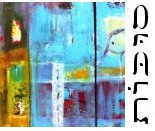
[ Chag Sukkot Sameach, friends! Happy holidays. I hope to post some pictures of our Sukkot celebrations with you sometime later today. ]
10.15.19 (Tishri 16, 5780) Though Sukkot is called the "Season of Our Joy" (i.e., Z'man Simchateinu) the somber Book of Ecclesiastes (קהֶלֶת) is always recited on the Sabbath of the festival. "Vanity of vanities, says Kohelet, vanity of vanities! All is vanity" (Eccl. 1:2). We read this book to remind us that lasting meaning and purpose is not found in life lived "under the sun" but rather in knowing and serving God. Indeed the Book concludes, "Let us hear the conclusion of the whole matter: Fear God and keep his commandments: for this is the whole [duty of] man" (Eccl. 12:13), though note that the Hebrew text actually reads, ki zeh kol-ha'adam (כִּי־זֶה כָּל־הָאָדָם), "for this is the whole man," which suggests that those who revere the LORD our God and obey His Word are made "whole," that is, healed of their ambivalence and inner vanity...
סוֹף דָּבָר הַכּל נִשְׁמָע אֶת־הָאֱלהִים יְרָא
וְאֶת־מִצְוֹתָיו שְׁמוֹר כִּי־זֶה כָּל־הָאָדָם
sohf · da·vahr · ha·kohl · neesh·ma · et · ha-e·loh·heem · yeer·ah
ve·et · meetz·voh·tahv · she·mohr · kee · zeh · kohl · ha·ah·dahm

"Let us hear the conclusion of the whole matter: Fear God
and keep his commandments: for this is the whole man."
(Eccl. 12:13)

Download Study Card
"The grass withers, the flower fades, but the word of our God will stand forever" (Isa. 40:8). Note the great contrast between olam ha-zeh and olam haba – between this present world and the heavenly realm.... Unlike the grass of the field that dries up or flowers that soon fade, the word of God stands forever. And despite the frailty of man and the inevitability of physical death, God's truth endures, which is a foundation upon which we can rest.
But how are the metaphors that man is "like dried up grass" or a "withered flower" intended to comfort us? Do they not, on the contrary, lead us to regard our lives as vain and perhaps meaningless? Yes indeed. Our lives are empty and vain apart from God and His truth. If we find ourselves wincing over such images, it is perhaps time to reexamine the state of our faith: To the extent that we regard this world as our "home" we will find the transience of life to be tragic... For those who are seeking a heavenly habitation, the "City of God" and the fulfillment of the promise of Zion, the fleeting nature of this evil world is ultimately a form of consolation...
For more on this subject, see "Sukkot and Vanity" and "Everlasting Consolation."
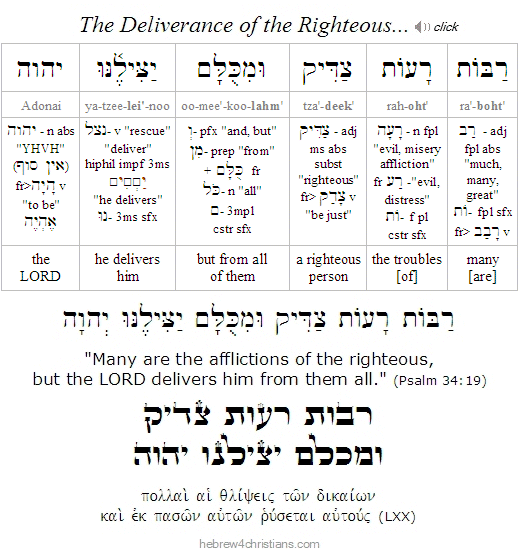 |
Surrounded by His Sukkah...

[ The following is related to the holiday of Sukkot, or the "Feast of Tabernacles"... ]
10.13.19 (Tishri 14, 5780) The root idea of the word "sukkah" (סוכה) means to cover or surround, as in hedge or cloud of protection. The Hebrew root is used when Moses asked to behold God's glory and the meaning of the name YHVH (יהוה), and God said, "Behold there is a place by me where you shall stand on the rock, and while my glory overtakes you I will cover you with my hand (וְשַׂכּתִי כַפִּי עָלֶיךָ) until I have passed by (Exod. 33:21-21). The hand of God (יַד־יְהוָה) is ultimately our sukkah, and indeed the LORD writes our names upon his palms and sets us as a seal upon his heart (Isa. 49:16; Sol. 8:6).
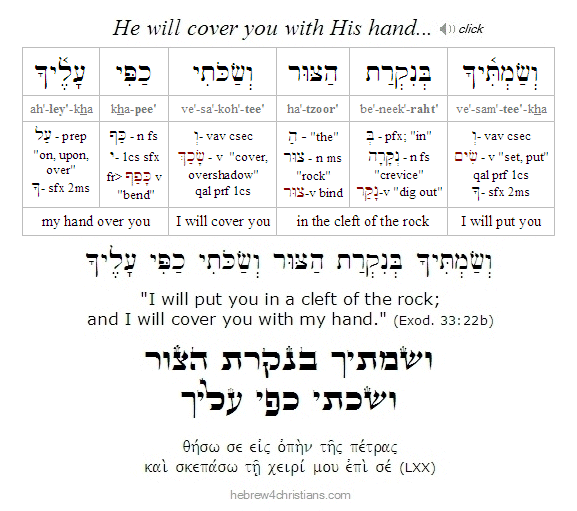 |
Likewise King David affirmed that God would hide him within his sukkah (סוכה) and elevate him upon the Rock that is Messiah: "For he will hide me in his sukkah (i.e., his cloud); in the time of trouble he will conceal me in the secret of his tent (i.e., his Presence): he will raise me up upon a Rock" (Psalm 27:5). Note that the Hebrew translated "he will hide me" (i.e., יצפנני) can also be translated as "he will treasure me," suggesting that God will overshadow and protect you from harm because you are his beloved (1 Cor. 10:4).
Since God's Name (יהוה) means "Presence," "Breath," "Compassion," "Love," "Healing," and so on, we are surrounded by his Sukkah at all times... In other words, you don't have to be in a physical sukkah to be in His sukkah! May God open our eyes to see his glory! Sukkot Sameach be'Yeshua (סוכות שמחה בישוע) - Happy Sukkot in Yeshua!
Torah Readings for Sukkot...
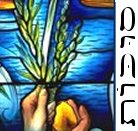
[ The great holiday of Sukkot ("Tabernacles") begins today at sundown... ]
10.13.19 (Tishri 14, 5780) The Torah Reading cycle is suspended for the holiday week of Sukkot (referred to as "Tabernacles" in the Christian tradition). Instead of a studying an assigned Torah portion that we will study throughout the week, we will read short passages from the Torah for each day of Sukkot, and then on the Sabbath of Sukkot we will the entire Book of Ecclesiastes (Kohelet). On the night before "Hoshana Rabba" (which marks the last day of the festival) we read various passages from Deuteronomy and Psalms. Then, after a day of special rest (called Shemini Atzeret) we celebrate Simchat Torah, when we will read both the very last portion of the entire Torah (i.e., V'zot HaBerakhah: Deut. 33:1-34:12) and then "rewind the scroll" to read the very first chapter of the Torah (i.e., Gen. 1:1-2:3). For a complete list of these readings see the Weekly Torah Reading page.
Every year we read the Torah from beginning to end... We do this every year because Talmud Torah - the study of Torah - is an ongoing venture in the life of a Jew. In this connection, it is interesting to note that the very first letter of the Torah is the Bet (בּ) in the word bereshit (בְּרֵאשִׁית), and the very last letter of the Torah is the Lamed (ל) in the word Israel (יִשְׂרָאֵל). Putting these letters together we get the word lev (לֵב), "heart," (note the similarity to the English word "love") suggesting that the entire Torah - from the first letter to the last - reveals the heart and love of God for us... Moreover, the first letter of Scripture is a Bet (בּ), as explained above, and the last letter is a Nun (ן) in the word "Amen" (אָמֵן), so the whole Bible - from beginning to end - reveals the Person of God the Son (בֶּן) for us...
Note: To make things a bit easier to celebrate Sukkot, I thought I would consolidate the various blessings and customary steps into a single (double-sided) page that you can print out for use with your celebrations. I hope you will find this helpful. You can download the "Sukkot Seder Quick Sheet" using the link below. "Give thanks to the LORD, for he is good, for his steadfast love endures forever" (Psalm 136:1).
Choosing to Believe...

[ The holiday of Sukkot ("Tabernacles") begins Sunday evening at sundown... ]
10.11.19 (Tishri 12, 5780) The Torah describes Sukkot ("Tabernacles") as a holiday of joy and gladness: "You are to rejoice in your festival.... for seven days you shall keep the festival... so that you will be altogether joyful" (Deut. 16:14-15). Nevertheless we may wonder how we can celebrate in a world filled with suffering, death, and misery? Since God commands us to be joyful, however, we must therefore understand joy to be something more than temporal elation or fleeting pleasure, but rather as the result of the decision to believe in healing and life despite the appearances of this realm. "The world to come, the perfect world, we at least believe in; but this material world, this one here and now, how can anyone believe in it? The only thing to do is to run to the refuge of God" (Nachman). The joy of Sukkot, then, is the joy of hope, the conviction that "all shall be well, and all manner of thing shall be well." Darkness will be overcome by the light; evil will become undone; all that is untrue shall be made true; and every tear shall be wiped away... The sukkah symbolizes the "Clouds of Glory" that surround our way in the desert – the "Divine Presence" beheld in faith. We find joy as we choose to believe in the deeper reality of God's sheltering love...
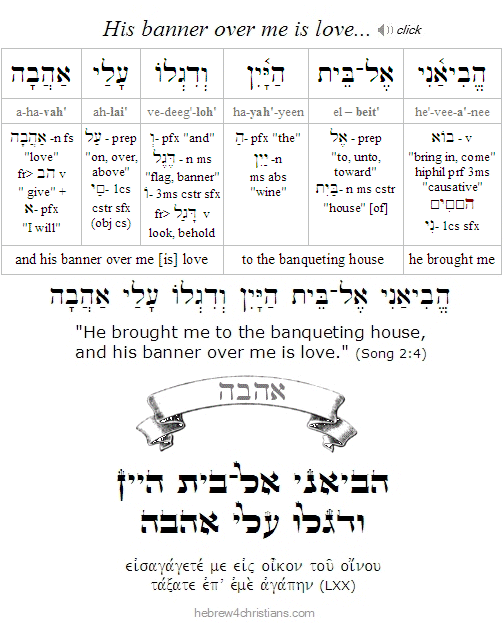 |
"You shall dwell in sukkot (booths) for seven days. All native Israelites shall dwell in booths, that your generations may know that I made the people of Israel dwell in booths when I brought them out of the land of Egypt: I am the LORD your God" (Lev. 23:42-43). The sages say that the booths commemorate the Clouds of Glory (עַנְנֵי תְּהִילָה), seven clouds that encompassed and protected the people during their sojourn in the desert (Sukka 11b). We recall the Clouds of God's glory as the sacred gift of his sustaining love and care during our journey to freedom. Indeed the clouds represent the holy Shekhinah (שְׁכִינָה), the ruach Hakodesh and indwelling presence of God that protects us and gives us comfort. Just as the ruach fell on the generation of Moses' advent, so with the generation of Messiah: the Spirit brings strength to heart, protection from evil, and guidance for our way (John 14:26).
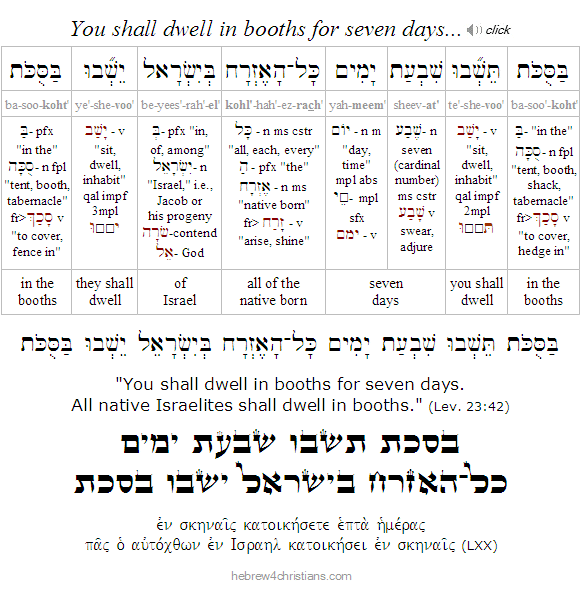 |
All of Torah is grounded in emunah (faith), as the very First Commandment of Torah is to trust that the LORD is God for you (אָנכִי יְהוָה אֱלהֶיךָ). Moreover Scripture also says: "All your commandments are emunah" (כָּל־מִצְוֹתֶיךָ אֱמוּנָה); and, "you are near, O LORD, and all your commandments are faithul" (Psalm 119:86; 151). Indeed faith is the "substance" (i.e., ὑπόστασις, reality, essence) of hope, the conviction of the unseen good (Heb. 11:1); without emunah it is impossible to please God (Heb. 11:6). We celebrate Sukkot because God calls us to know our heritage and to believe in the light of His surrounding Presence.
Enshrining the Name...

10.11.19 (Tishri 12, 5780) According to Rashi, Moses gathered the people to assemble the Tabernacle the day following Yom Kippur, that is, the day after he came down from the mountain upon learning the meaning of the name YHVH (Exod. 34:6-7; 35:1-35). For this reason it is traditional to begin building your sukkah on the day following Yom Kippur, recalling the revelation of the covenant of God's mercy: "The LORD is my strength and my song, and he has become my salvation (my Yeshua); this is my God and I will enshrine Him."
עָזִּי וְזִמְרָת יָהּ וַיְהִי־לִי לִישׁוּעָה
זֶה אֵלִי וְאַנְוֵהוּ אֱלהֵי אָבִי וַאֲרמְמֶנְהוּ
o·zi · ve·zim·rat · Yah · vai·hi · li · li·shu·ah
zeh · E·li · ve·an·ve·hu · E·lo·hei · a·vi · va·a·ro·me·men·hu

"The LORD is my strength and my song, and he has become my salvation;
this is my God and I will enshrine Him, God my Father, and I will exalt Him"
(Exod. 15:2)

"The Word became flesh" (καὶ ὁ λόγος σὰρξ ἐγένετο) "and dwelt with us" (καὶ ἐσκήνωσεν ἐν ἡμῖν, note that the verb σκηνόω here comes from σκῆνος, "tabernacle" or "tent")..." (John 1:14). A midrash dating from the 2nd century BC says that we are to be joyful during Sukkot because it was at this time that Isaac was born: "And we returned in the seventh month, and found Sarah with child before us, and we blessed him, and we announced to him all the things which had been decreed concerning him (Jubilees 16:16). Moved by gratitude to God, Abraham established a festival of joy to celebrate the birth of his long-awaited son by decorating booths (sukkot) and thanking HaShem for the miracle of his heir. "And Abraham took branches of palm trees, and the fruit of goodly trees, and every day going round the altar with the branches seven times [a day] in the morning, he praised and gave thanks for all things in joy" (Jubilees 16:31). In other words, Sukkot originally celebrates the birth of Isaac - and by extension, the advent of Yeshua our Messiah, the Akedah of God.
Note: There are various arguments and discussions regarding the date of our Lord's birth. One is that if Mary received the visitation around the time of Chanukah, then Yeshua would have a Sukkot birth... There are other arguments for other dates as well. For some (non-dogmatic, and hopefully helpful) discussion about the time of Yeshua's birth, see: "Christmas Day: Was Jesus really born on December 25th?"
The Special Role of Israel...
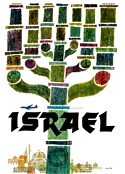
10.11.19 (Tishri 12, 5780) Our Torah portion this week (Ha'azinu) celebrates the unique role given to the Jewish people and the nation of Israel among the nations of the world: "When the Most High (עֶלְיוֹן) divided to the nations their inheritance, when he separated the children of mankind, he set the boundaries of the nations according to the number of the children of Israel. For the LORD'S portion is his people; Ya'akov is the rope of his inheritance" (Deut. 32:8-9). The nation of Israel has a unique place in God's providential plans: Indeed, "the LORD has chosen Jacob for himself, Israel as his special possession" (Psalm 135:4; Exod. 19:5, Deut. 7:6; 2 Sam. 7:23). To Israel it was said: "You will be my people; and I will be your God," and וִהְיִיתֶם לִי סְגֻלָּה מִכָּל־הָעַמִּים - "you are my beloved treasure among the nations" (Jer. 11:4; Exod. 19:5). Of course God chose Israel to be the physical conduit for the advent of Messiah Yeshua, the Redeemer and light of the world (Isa. 42:6; Luke 2:32; John 8:12, Gal. 4:4). Yeshua was born the "King of the Jews" (מֶלֶךְ הַיְּהוּדִים), the "splendor of Israel" (תִּפְאֶרֶת יִשְׂרָאֵל), and the One who is the "rope of inheritance" (חֶבֶל נַחֲלָתוֹ) to heaven. The culmination of God's redemptive activity centers on the Jewish people: Yeshua will come again, not to Rome (or to Geneva) or anywhere else but to Jerusalem, the "City of the Great King" (Matt. 5:35), to fulfill the promises God gave to the Jewish people. Then Zion will be established and all the nations will submit to the reign of the LORD. The sages say, "If you want to live, hold the rope and don't let go, lest you drown." Yeshua is the Rope our our inheritance by which we connect with God's salvation. Those who trust in Him are given all spiritual blessings and are made partakers of the covenantal promises given to the Jewish people (Eph. 1:13, 2:19; 3:1-6; Gal. 3:29; Rom. 15:12; Col. 1:12).
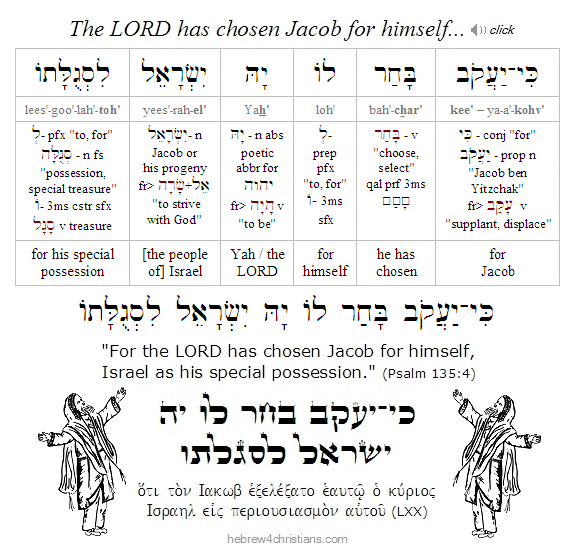 |
Personal Prayer Request: Shalom chaverim. I have been suffering with some health issues for the last couple weeks. Your prayers for this ministry are appreciated. Thank you!
Getting Ready for Sukkot...

[ The week-long holiday of Sukkot begins Sunday, Oct. 13th at sundown this year... ]
10.10.19 (Tishri 11, 5780) On the Torah's calendar, there is a quick transition from the somber time of the Jewish High Holidays (Rosh Hashanah through Yom Kippur) to the week-long celebration of Sukkot (called "Tabernacles" in the Christian tradition). If the High Holidays focus on the LORD as our Creator, our Judge, and the One who atones for our sins, then Sukkot is the time when we joyously celebrate all that He has done for us. Prophetically understood, the seven days of Sukkot picture olam haba, the world to come, and the Millennial Kingdom reign of Mashiach ben David. If Yeshua was born during Sukkot (i.e., conceived during Chanukah, the festival of lights), then another meaning of the "word became flesh and 'tabernacled with us" (John 1:14) extends to the coming kingdom age, when He will again "sukkah" with his people during the time of his reign from Zion.
Since it represents the time of ingathering of the harvest, Sukkot prophetically prefigures the joyous redemption and gathering of the Jewish people during the days of the Messiah's reign on earth (Isa. 27:12-13; Jer. 23:7-8). Indeed all of the nations that survived the Great Tribulation will come together to worship the LORD in Jerusalem during the Feast of Sukkot (Zech. 14:16-17). The holiday season therefore provides a vision of the coming Kingdom of God upon the earth, when the Word will again "tabernacle with us."
 |
This year Sukkot begins just after sundown on Sunday, Oct. 13th (i.e., Tishri 15 on the Jewish calendar). The festival is celebrated for seven days (i.e., from Tishri 15-21) during which we "dwell" in a sukkah -- a tent or "booth" of temporary construction, with a roof covering (schach) of raw vegetable matter (i.e., branches, bamboo, etc.). The sukkah represents our dependence upon God's shelter for our protection and divine providence. We eat our meals in the sukkah and recite a special blessing (leshev Ba-Sukkah) at this time.
The Lulav Bouquet...
In addition to the Sukkah (tent), the most prominent symbol of Sukkot is the Arba'at Ha-minim (אַרְבַּעַת הַמִּינִים) - "the Four Species," or four kinds of plants explicitly mentioned in the Torah regarding the festival of Sukkot: "On the first day you shall take: 1) the product of goodly trees (etrog), 2) branches of palm trees (lulav), 3) boughs of leafy trees (hadas), and 4) willows of the brook (aravot), and you shall rejoice before the LORD your God for seven days" (Lev. 23:40). We wave the "four species" (held together as a bouquet with the etrog) and recite a blessing (netilat lulav) to ask God for a fruitful and blessed year.
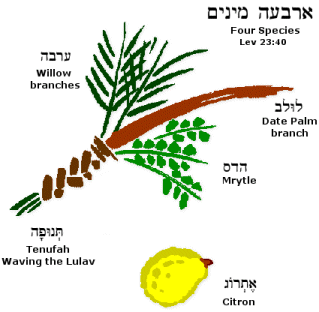 |
Sukkot marks the conclusion of the Jewish Fall Holidays and is the last of the three Shelosh Regalim (שלוש רגלים, i.e., the three annual pilgrimage festivals: Pesach (Passover), Shavuot (Pentecost), and Sukkot (Tabernacles) (Deut. 16:16). It can be argued that Sukkot is the climax of all the festivals in Scripture: Everything leads to it as a culmination in God's prophetic plan. It is interesting to compare the use of words relating to simchah [joy] in the description of these three festivals. Regarding Pesach, the word simchah does not appear at all (Deut. 17:1-8); regarding Shavuot, it appears only once (Deut. 17:11); but, regarding Sukkot, simchah appears several times. For instance:
You shall keep the Feast of Sukkot seven days, when you have gathered in the produce... You shall rejoice in your feast (וְשָׂמַחְתָּ בְּחַגֶּךָ אַתָּה)... because the LORD your God will bless you in all your produce and in all the work of your hands, so that you will be altogether joyful. (Deut. 16:13-15)
Sukkot is called "z'man simchateinu," the "season of our joy." Indeed, in ancient Israel, the joy of Sukkot was so renowned that it came to be called simply "the Feast" (1 Kings 12:32). Sukkot was a time when sacrifices were offered for the healing of the nations (Num. 29:12-40), and it was also a time when (on Sabbatical years) the Torah would be read publicly to all the people (Deut. 31:10-13).
From a spiritual perspective, Sukkot corresponds to the joy of knowing your sins were forgiven (during Yom Kippur) and also recalls God's miraculous provision and care after the deliverance from bondage in Egypt (Lev. 23:43). Prophetically, Sukkot anticipates the coming kingdom of the Messiah Yeshua wherein all the nations shall come up to Jerusalem to worship the LORD during the festival (see Zech. 14:16). Today Sukkot is a time to remember God's Sheltering Presence and Provision for us for the start of the New Year.
Teshuvah and Remedy...

[ "There is now no condemnation for those who are in Yeshua the Messiah." (Rom 8:1) ]
10.10.19 (Tishri 11, 5780) The teshuvah (repentance) called for by Yeshua is not like that of the traditional rabbis... The rabbis want you to be sorry for your sins, to confess "every sin in the book," and to find "atonement" in religious rituals, but this is not "good news," but rather "stale news." The teshuvah of Yeshua is the miracle of new life; Messiah sets you free from the power of sin and death itself. The repentance of Yeshua is to trust in God's remedy for your sinful condition: "This is the work of God, to believe in the One whom God sent" (John 6:29). "He saw that there was no man, and wondered that there was no one to intercede; then His own arm brought him salvation, and his righteousness upheld him" (Isa. 59:16). We must turn away from the idea that God demands anything from us other than trust in his healing love. "Truly, I say to you, unless you turn and become like children, you will never enter the kingdom of heaven" (Matt. 18:3). Stop trying to measure up to his standards. You simply cannot give more than you have the love to give, so you must begin by getting your heart needs met by accepting God's unconditional love. It's not about what you do for God, after all, but about what he does for you. That's the message of the "gospel." Trust that you are rightly related to God because of the atonement of Yeshua, not because of your own efforts at self-improvement. The blood of atonement has been presented; the veil has been torn from top to bottom, and access to God's heart is given through the sacrifice of Yeshua (Heb. 10:19-20). "I tell you the solemn truth, the one who hears my message and believes the One who sent me has eternal life (חַיֵּי עוֹלָם) and will not be condemned, but has passed over (i.e., μετά + βαίνω, lit., "crossed over" [עָבַר]) from death to life" (John 5:24).
Surrendering your Destiny...

10.10.19 (Tishri 11, 5780) I once received an email from someone who questioned whether they were beyond the hope of redemption because they wrestled with depression and despair... If the life of a follower of the Messiah is to be marked by unspeakable joy, a heart overflowing with "living waters," and inner peace, doesn't inner pain, a sense of emptiness, and numbness of heart indicate the absence of genuine regeneration? My response to this honest question was that the struggle itself indicates the presence of real faith, and it is therefore likely that this person was going through a "dark night of the soul," that is, a time of testing and refinement... I counseled him that we are to trust God in the darkness and abandon everything to Him -- even our eternal destiny -- regardless of the ambiguity and sorrows of the present moment. We must offer up our heart to God and let whatever happens to us happen. χάριτι δὲ θεοῦ εἰμι ὅ εἰμι. As Job in his great anguish of soul said: "Behold, though he slay me I will hope in him; I argue my ways before Him" (Job 13:15). In effect Job laid down his life to be slain and made appeal to God's justice and love, despite the mystery and agony of his suffering...
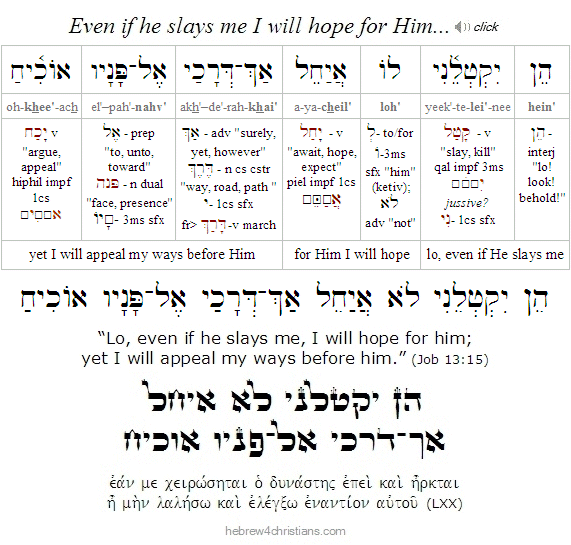 |
I once read a story about a Chassid who left his cold and hungry wife and child at home one snowy winter evening as he went off to the synagogue to pray. When he arrived back home he opened the door and heard an inner voice say, "you have lost your share in the world to come." Upon hearing this the Chassid bowed his head and said, "now that this is settled, may I finally begin to serve the Lord without any thought of future reward."
Rejoice with Trembling...
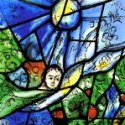
10.10.19 (Tishri 11, 5780) Does God care that we do teshuvah? If we gaze upward toward the starry depths of heaven we may feel that our lives are insignificant and useless; however if we look within we intuitively sense that everything we say, do, and think has eternal weight. This paradox was well expressed by Immanuel Kant: "Two things fill the mind with ever new and increasing admiration and awe, the more often and steadily we reflect upon them: the starry heavens above me and the moral law within me. I do not seek or conjecture either of them as if they were veiled obscurities or extravagances beyond the horizon of my vision; I see them before me and connect them immediately with the consciousness of my existence" (Critique of Practical Reason). Genuine humility doesn't mean regarding your life as vain or meaningless but instead "locates" the self in spiritually realistic terms. Both the grand whorl of the cosmos and the inner mystery of the self reveal God's Presence; the LORD fills all in all, and this includes both our inner world as well as the depths of creation, yea, even heaven itself. And since God in Messiah regards your life as worthy of an infinite redemption, true humility means respecting yourself, honoring the miracle of God's presence within you and valuing your identity as a beloved child of God... You are both a "bit of nothing" (i.e., klume: כְּלוּם) and yet you are segulah, a treasure before heaven. An old Chassidic tale says that every person should walk through life with two notes, one in each pocket. On one note should be the words anokhi afar ve'efer (אָנכִי עָפָר וָאֵפֶר) - "I am but dust and ashes," and on the other note should be the words, bishvili nivra ha'olam (בִּשְׁבִילִי נִבְרָא הָעוֹלָם) - "For my sake was this world created." We are dust, yes indeed, but we are glorious dust because of God's love: "Just as we have borne the image of the man of dust, we shall also bear the image of the man of heaven" (1 Cor. 15:49).
Those who do not tremble before the cross do not understand God's holiness and anger against sin; those who do not rejoice before the cross do not understand God's great compassion and love....
We are to fear God and yet love God with all our hearts... It is a balance - the reverential "trembling of love." We fear God because our sins reveal divine justice and invoke the curse, and yet we trust what Yeshua does for us is perfect and evidences God's great compassion and mercy for our lives. So we do both - we fear God yet we rejoice that we are reconciled to him by means of the sacrificial life and death of the Messiah. We cannot choose one at the expense of the other: fear without love leads to legalism and hypocrisy; love without fear leads to presumption and profanity... Therefore we must guard against falling into despair over ourselves by affirming God's acceptance and blessing; on the other hand we must guard against smugness and pride by affirming God's holiness, justice, and the terrible cost he paid to redeem us from the verdict of the law. Those who do not tremble before the cross do not understand God's holiness and anger against sin; those who do not rejoice before the cross do not understand God's great compassion and love. The cross of Messiah is the place where God's truth (justice) and God's mercy (chesed) are perfectly mediated (Psalm 85:10).
Atonement and the New Covenant...

[ Understanding atonement is essential to understanding the cross of Messiah... ]
10.10.19 (Tishri 11, 5780) How are we to understand the apparent contradiction that Yom Kippur is to be observed as a "statute forever" (Lev. 16:29) while the New Testament emphatically states that Yeshua puts an end to animal sacrifice and now is our eternal atonement (Heb. 9:12; 24-26)? To begin we must note that this contradiction only arises when we make the (false) assumption that the Sinai covenant could never be abrogated, which would imply that a new covenant is logically impossible. If we can only relate to God through the covenantal terms given at Sinai, in other words, then the Levitical priesthood (alone) serves to mediate us before God, and there would be no need for a covenant based on the better priesthood and promises of the Messiah (Heb. 8:6). Nevertheless, the new covenant was clearly foretold throughout the Torah, the writings, and the prophets, and the assumption that the Sinai covenant is "immutable" is therefore false. We can understand this by an analogy: If an employer makes a contract with an employee with certain provisions and conditional benefits that are subject to annual review, but later rescinds that contact and offers a new one with far better benefits, there is no contradiction involved. In our case a real contradiction would be, "you must observe Yom Kippur forever," and then - in the very same contract - later read, "you no longer need observe Yom Kippur forever."
Since the Torah says of the Yom Kippur ritual, "this shall be a statute forever (חֻקַּת עוֹלָם) for you, that atonement may be made for the people of Israel once in the year because of all their sins" (Lev. 16:34), it is urgent for us to explore what "forever" might mean in this case, especially in light of the atonement given in Yeshua. First, we note that the Hebrew word translated "forever" is olam (עוֹלָם), which is derived from a root verb alam (עָלַם) that means "to conceal" or "to hide." Olam may have its origins using spatial imagery, a distance so vast that it is unseen, beyond the horizon, and therefore it can also mean "world." When it is applied to the terms of the Sinai covenant (and the Tabernacle represents the "ritual expression" of that covenant), the word means perpetual, ongoing, etc., in the horizon of domain or "world." It is interesting to note that the Jewish sages never regarded "olam" as unchangeable, since in the world to come Torah will come from Zion (Isa. 2:3). For more on this important point, see the article "Olam HaTorah: The World of the Torah."
Second, we must remember that Torah (תּוֹרָה) is a "function word" that expresses our responsibility in light of the covenantal acts of God, and if you choose to relate to God by means of the Sinai covenant, you are liable to the terms and provisions of that contract (e.g., niddah laws, blood ritual laws, tithing laws, agricultural laws, etc.), and this includes being liable to the enumerated curses for disobedience (tochachah). The covenant at Sinai is indeed eternal and never can change - it is brit olam, a perpetual covenant - but if you choose to abide by its terms, you are responsible for your side of the contract... The Book of Hebrews states: "When there is a change in the priesthood (הַכְּהוּנָּה), there is necessarily (ἀνάγκη) a change in the Torah as well" (Heb. 7:12). The Levitical priesthood expresses the Torah of the Covenant of Sinai (בְּרִית יְשָׁנָה), just as the greater priesthood of Yeshua expresses the Torah of the New Covenant (בְּרִית חֲדָשָׁה).
Third, Yeshua our Messiah came to deliver us from sin and to establish the new covenant with God, which both transcends the covenant given at Sinai and provides an entirely new way to be in relationship with God by the power of the Holy Spirit. The new covenant sets us free from the terms of Sinai (by the death of the Testator, Heb. 9:15) so that we might serve God in a new and better way (see Jer. 31:33; Rom. 7:1-6; Heb. 8:6; Rom. 9:31-32; Acts 13:39; Gal. 4:21-5:1). We "die" to the terms of the former contract to serve God in a new and powerful way (Rom. 7:1-4), with the inner intent of the law written upon our hearts (Jer. 31:31-33). This is the "deeper Torah" that goes back to the original covenant made in the Garden of Eden (for more on this, see "The Gospel in the Garden").
Fourth, Yeshua is the King, the Lawgiver of Torah, and its Substance: he did not come to destroy the Law and the Prophets, but to fulfill their message and meaning (Matt. 5:17-18; Rom. 10:4). As the King, he has the authority to annul contracts with his subjects, and he has the authority to implement new agreements based on his sovereign will... The Torah of Moses commanded, "Thou shalt not kill..." but the King of Torah (מלך התורה) went to the heart of the matter, explaining that murder was a symptom of the deeper sin of anger...
Finally, those who follow the law of Moses simply cannot keep the Day of Atonement as clearly commanded in the Book of Leviticus, nor have Jews been able to do so since 70 AD, after the destruction of the Second Temple as foretold by Yeshua (Matt. 24:2; Luke 19:41-4). Note that this was by divine design, since the way into the Holy of Holies (i.e., kodesh hakodashim: קדֶשׁ הַקֳּדָשִׁים) was not yet open for all as long as the "outer tent" still stood (i.e., the Levitical priesthood as the ritualistic expression of the covenant made at Sinai), since that was symbolic of "the present age," or the "dispensation that was passing away" (Heb. 8:13, 9:8-9; for more, see "The Parochet Rent in Two"). Despite the later invention of "Judaism without the Temple," the life is indeed "in the blood" (Lev. 17:11) and in Messiah we are given fulness of life! Only Yeshua gives us true atonement, and that's the true Torah of the LORD! The redemption obtained by animal sacrifices was merely provisional and symbolic, "for it is impossible for the blood of bulls and goats to take away sins" (Heb. 10:4). For eternal remedy something far greater was needed, namely, the sacrifice of God Himself. Consequently, when Yeshua came into the world, he said, "Sacrifices and offerings you have not desired, but a body have you prepared for me," and "'Behold, I have come to do your will, O God, as it is written of me in the scroll of the book" (Heb. 10:5,7). As the Book of Hebrew states: "We have an altar, whereof they have no right to eat who serve the Tabernacle" (i.e., the Levitical system of worship). We are cleansed from our sins and made eternally right with God because of the cross of Yeshua...
The bottom line is this. We have a greater High Priest who intercedes for us by means of his own shed blood within the true Holy of Holies, "made without hands," in the olam of reality. We do not mix the covenants of God, for this leads to double-mindedness and is regarded as spiritual adultery (Rom. 7:1-4). Remember: The promised "new covenant" (ברית חדשׁה) is "not like the covenant that I made with their fathers on the day when I took them by the hand to bring them out of the land of Egypt (Jer. 31:32), that is, it is not like the covenant made at Sinai with Moses' mediation. It is chillul HaShem - the desecration of the Name above all Names - to turn away from the meaning and message of the cross of Messiah.
Note: We study the Yom Kippur avodah and the various rituals of blood atonement to better understand the meaning of Yeshua's sacrificial death for us as God's High Priest of the New Covenant. Moreover, as I've explained elsewhere on this site, Yom Kippur prophetically pictures the "Day of the LORD" or the Day of Judgment in Acharit Ha-Yamim (the End of Days). The heavenly shofar blasts heard at Mount Sinai will be reissued from Zion for all the world to hear. First will be the gathering together of those who follow the Messiah (i.e., those declared tzaddikim because of the merit of Yeshua's sacrifice), and then God's war against Satan and the world system will begin, culminating in the long-awaited coronation of the King of King of Kings. After the judgment of the nations after the Great Tribulation, ethnic Israel will be fully restored to the LORD and their sins will be completely purged (Matt. 24). "All Israel will be saved" (Rom. 11:26). Yeshua will then physically return to Israel to establish His glorious millennial kingdom in Zion. Then all the promises given to ethnic Israel through the prophets will finally be fulfilled.
Yom Kippur and the Name....

10.10.19 (Tishri 11, 5780) Yom Kippur was the only time when the High Priest could enter the Holy of Holies and call upon the Name of YHVH / YHVH (i.e., יהוה) to offer blood sacrifice for the sins of the people. This "life for a life" principle is the foundation of the sacrificial system and marked the great day of intercession made by the High Priest on behalf of Israel. For this reason it was also called the "Day of God's Mercy," or the "Day of God's Name." This alludes to the revelation of the attributes of God's Compassion after the sin of the Golden Calf (see Exod. 34:6-7) -- a disclosure that foreshadowed the New Covenant. How much more, then, is Yom Kippur the "Day of Yeshua's Name" since He secured for all of humanity everlasting kapparah (atonement)? Yeshua the Messiah is Moshia ha'olam (מוֹשִׁיעַ הָעוֹלָם), the Savior of the world; He alone possesses the "Name above all other Names" (Phil. 2:9-10; Acts 4:12). It is altogether fitting, then, that God's "hidden Name" (i.e., shem ha-meforash: שֵׁם הַמְּפרָשׁ) was proclaimed before the kapporet (the cover of the Ark of the Covenant) in the Holy of Holies while atonement for our sins was made through the sacrificial blood.
This gives us a whole new perspective on Paul's words (Rom. 10:9): "if you confess with your mouth that Yeshua is LORD (יהוה) and believe in your heart that God raised Him from the dead (i.e., that his blood was shed and presented on your behalf upon the heavenly kapporet), then you will be saved (that is, you will be reconciled to God and made a partaker of the atoning work of Yeshua). Surely the Apostle Paul, a zealous rabbi who diligently studied Torah in Jerusalem under Rabbi Gamaliel (who was himself the grandson of the renowned Rabbi Hillel the Elder), understood the theological implications when he stated that the prophecy: "And it shall come to pass that everyone who calls on the Name of the LORD (בְּשֵׁם יְהוָה) shall be saved" (Joel 2:32) applied directly to Yeshua (Rom. 10:10).
Behold the Goat of God!
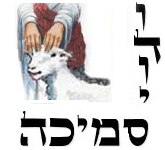
[ The solemn holiday of Yom Kippur begins Friday (Sept. 29th) an hour before sundown... ]
10.09.19 (Tishri 10, 5780) The original Passover sacrifice (korban Pesach) was not given to the Levitical priesthood as a sin offering, since it preceded Sinai and the giving of the laws concerning the sacrificial rites. In the same way, Yeshua's sacrifice was directed from Heaven itself by means of the prophetic office of Malki-Tzedek (מַלְכִּי־צֶדֶק) - a higher order of priesthood (Gen. 14:18; Psalm 110:4; Heb. 7). Yeshua both offered Himself up as the "Lamb of God" that causes the wrath of God to (eternally) pass over those who personally trust in Him, and He also offered himself as the "Goat of God" whose blood was sprinkled in the Holy of Holies to cleanse us from sin and give us (everlasting) atonement. (Other metaphors are also given in Scripture, of course. For example, Yeshua offered Himself as the Snake lifted up (John 3:14-15; cp. Num. 21:4-9), as a Red Cow (parah adumah), and so on).
Yeshua as the "Lamb of God" pictures personal redemption from slavery to Satan and freedom from the wrath of God. This is the greater Passover/Exodus connection. By means of Yeshua's shed blood and broken body, the wrath of God passes over us and we are set free to serve God.... Yeshua as the "Goat of God" pictures both personal cleansing (i.e., "propitiation" or "expiation" for our sins: the Greek word (ἱλαστήριον) is used in the LXX for the kapporet (Mercy Seat) in the Holy of Holies which was sprinkled with the blood of the sacrifice on Yom Kippur) as well as national teshuvah and cleansing for ethnic Israel at the end of the Great Tribulation period. At that time Yeshua will function as Israel's true High Priest whose sacrifice is applied for Israel's Atonement. This is the Yom Kippur connection. Moreover, since Yom Kippur points to the removal of the sin-laden goat (representing Satan), the Millennial reign of Messiah will be one unmolested by the powers of evil.

Just as Rosh Hashanah reveals the coming time of Judgment and the rapture of the kehillat Mashiach (Bride of Messiah), Yom Kippur prophetically pictures the Day of the LORD or the Day of Judgment in Acharit HaYamim [the last days]. After the judgment of the nations during the Great Tribulation, national Israel will be fully restored to the LORD and their sins will be purged (see Matthew 24). Indeed, our beloved Mashiach will one day return to Israel, cleanse her Temple, restore her to Himself, and set up His glorious kingdom. And that coming celebration is the Sukkot or "Tabernacles" connection, friend...
Atonement and Sacrifice...

[ The following is related to Yom Kippur, the "Day of Atonement"... ]
10.09.19 (Tishri 10, 5780) Some "anti-missionary" teachers deny that Yeshua could have died for our sins because the Torah forbade human sacrifice. In response, let me first state first that when such people refer to the "Torah" in this matter, they are actually referring to the subset of the Torah called Sefer Ha-Brit (סֵפֶר הַבְּרִית) that defined the various ethical, social, and ritual obligations given in the Sinai Covenant (Exod. 24:7-8). Indeed, claiming that the whole Torah may be reduced to the Sinai Covenant is an example of the logical "fallacy of composition," that is, inferring that something must be true of the whole from the fact that it is true of some part of the whole.... But we must remember that Torah is something more than the code of laws and ritual obligations prescribed in the Sinai Covenant. Indeed the older covenant expressed in Sefer Ha-Brit was sprinkled with the blood of sacrificial bulls at Sinai -- sacrifices, by the way, that preceded the laws of sacrifice given at Sinai itself (Exod. 24:6-8). Please note that this "Book of the Covenant" is not to be exclusively identified with the Torah itself, since as I've repeatedly mentioned over the years, "Torah" (תּוֹרָה) is a general term meaning "direction," "teaching," "will of God," and so on. Indeed the whole "Torah of Moses" (תּוֹרַת משֶׁה) contains far more than the covenant at Sinai (as important and worthy as that part is). For instance, the Torah reveals that the very first "priest" (i.e., kohen: כּהֵן) was neither a Jew nor a Levite nor a descendant of Aaron, but rather Someone who is said to have "neither beginning of days nor end of life" but is made like (ἀφωμοιωμένος) the Son of God, a priest continually (Heb. 7:3). This priest, of course, was Malki-Tzedek (מַלְכִּי־צֶדֶק), the King of Salem (מֶלֶךְ שָׁלֵם) to whom Abraham offered tithes after his victory over the kings (Gen. 14:18). The New Testament Scriptures make the point that the priesthood of Malki-Tzedek is greater than the Levitical priesthood and is therefore superior to the rites and services of the Tabernacle - including the Yom Kippur avodah (Heb. 7:9-11).
It was to Malki-Tzedek that Abram (and by extension, the Levitical system instituted by his descendant Moses) gave tithes and homage -- and rightly so, since Yeshua is the great High Priest of the better covenant based on better promises (Heb. 8:6). Indeed, Yeshua is Himself the Promised Seed of Abraham who saves the world from the kelalah (curse) caused by Adam's transgression (Gen. 3:15). It is profoundly prophetic how Abraham was met by the Coming One as the Priest of the Most High God in the City of Zion, and how he gave him the tokens of bread and wine - the very commemorative emblems Yeshua gave to His disciples as a witness of His mediation for their sins (1 Cor. 11:23-26). It is also highly prophetic that Abraham himself was commanded by the LORD to offer human sacrifice when he bound his "only begotten son" Isaac upon the altar at Moriah (see The Gospel of Moses). Many midrashim state that Isaac actually was killed but came back to life, and that agrees with the Book of Hebrews description that Abraham expected the resurrection of his son (Heb. 11:17-19). It is fallacious then, to claim that the Torah categorically forbade such a sacrifice. On the contrary, it was proclaimed to Adam and Eve, prefigured in the Akedah, and later spoken about directly by the Hebrew prophets, including David. "Then he [Messiah] said, 'Behold, I have come to do your will, O God, as it is written of me in the scroll of the book'. I delight to do your will, O my God; your law is within my heart" (Heb. 10:7; Psalm 40:8).
For more on this timely topic, see "Rabbis who Deny Blood Atonement."
Torah of Blood Atonement...
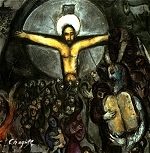
[ Tonight begins Yom Kippur, a special day when we remember our atonement secured by the outstretched arms of Yeshua our Healer... May each of us take a moment to offer thanks to God for what he has done for us, and how he has given us real forgiveness, eternal life, and the undying hope forever and ever. Amen. ]
10.08.19 (Tishri 9, 5780) "The Life is in the blood..." (Lev. 17:11). The "Day of Atonement" is the English translation for Yom Kippurim (יוֹם הַכִּפֻּרִים). The shoresh (root) for the word "kippur" is kafar (כָּפַר), which probably derives from the word kofer, meaning "ransom." This word is parallel to the word "redeem" (Psalm 49:7) and means "to exchange by offering a substitute." The great majority of usages in the Tanakh concern "making an atonement" by the priestly ritual of sprinkling of sacrificial blood to cleanse from sin or defilement (i.e., tahora). The blood of the sacrifice was given in exchange for the life of the worshiper (the "life-for-life" principle). This symbolism is clarified when the worshiper leaned his hands on the head of the sacrifice (semichah) while confessing sin (Lev. 16:21; 1:4; 4:4, etc.). The shoresh also appears in the term kapporet [the "Mercy Seat," but better rendered as simply the place of blood covering]. The kapporet was the golden cover of the sacred three-in-one chest (i.e., ark) in the Holy of Holies of the Tabernacle (or Temple) where the sacrificial blood was presented over the tablets representing the law...
כִּי נֶפֶשׁ הַבָּשָׂר בַּדָּם הִוא
וַאֲנִי נְתַתִּיו לָכֶם עַל־הַמִּזְבֵּחַ
לְכַפֵּר עַל־נַפְשׁתֵיכֶם
כִּי־הַדָּם הוּא בַּנֶּפֶשׁ יְכַפֵּר
kee · ne·fesh · ha·bah·sahr · ba·dahm · hee
va·a·nee · ne·ta·teev · la·khem · al · ha·meez·bei·ach
le·kha·peir · al · naf·shoh·tei·khem
kee · ha·dahm · hoo · ba·ne·fesh · ye·kha·peir

"For the life of the flesh is in the blood,
and I have given it for you on the altar
to atone for your souls,
for it is the blood that makes atonement by the life."
(Lev. 17:11)

Hebrew Study Card
The blood of Messiah ransoms our souls from death, brings us near to the Divine Presence, and cleanses us from all sin (Lev. 17:11; Rom. 3:25; Heb. 9:22; Eph. 1:7; Col. 1:14; 1 John 2:2). The voice of his blood cries out on our behalf (Heb. 12:24), and his life was given in exchange for ours: "For our sake he made him to be sin who knew no sin, so that in him we might become the righteousness of God" (2 Cor. 5:12). We "lean into" Yeshua, confessing our sins, and are cleansed from all unrighteousness (1 John 1:9). In the New Testament Yeshua is called the "atonement" (ἱλασμός) for our sins (1 John 2:2), a Greek word that was used in the Septuagint (i.e., LXX) to translate the Hebrew word kippurim in the Torah (Lev. 25:9). The Septuagint uses the same word (ἱλασμός) to translate the Hebrew word for selichah (forgiveness), for example: "But with you there is forgiveness (הַסְּלִיחָה), that you may be held in awe" (Psalm 130:4). Just as the blood was sprinkled upon the kapporet (cover of the Ark of the Covenant) in the Holy of Holies during the Yom Kippur ritual, so the blood of Messiah was sprinkled the heavenly kapporet, the very altar of Almighty God, to secure for us everlasting redemption and healing...
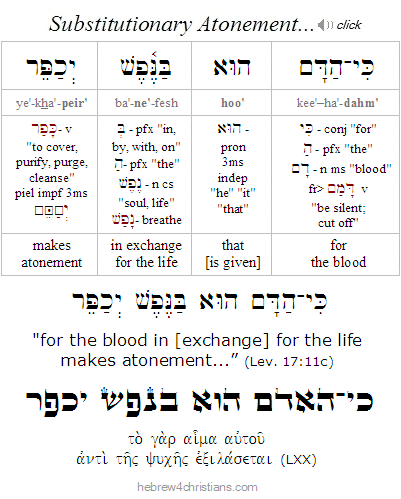 |
"Come now and reason with the LORD. Though your sins are as scarlet, they shall be as white as snow" (Isa. 1:18). The blood of bulls and goats could never fully remove our sins since they did not represent the very life of God poured out on our behalf (Heb. 10:4). God chose the ultimate "cleansing agent" for sin by shedding the precious blood of His own Son for the sake of our atonement (1 Cor. 15:3-4; Rom. 5:11). The blood of Yeshua truly cleanses us from the stain of our sins (Heb. 10:12-14). We make "spiritual contact" with the sacrificial blood of Yeshua through faith -- by being "baptized into His death" and identifying with Him as our Sin-Bearer before God. We then are delivered from the law's verdict against us and accepted into the Kingdom of God (Rom. 4:25; 2 Cor. 5:21; Col. 1:13-14, 2:10-15).
לְכוּ־נָא וְנִוָּכְחָה יאמַר יְהוָה
אִם־יִהְיוּ חֲטָאֵיכֶם כַּשָּׁנִים כַּשֶּׁלֶג יַלְבִּינוּ
אִם־יַאְדִּימוּ כַתּוֹלָע כַּצֶּמֶר יִהְיוּ
le·khoo · nah · ve·nee·vah·khe·chah · yoh·mar · Adonai
eem · yee·he·hoo · cha·tah·ei·khem · ka·shah·neem · ka·sheh·leg · yal·bee·noo
eem · ya·a·dee·moo · kha·toh·lah · ka·tze·mer · yee·he·yoo

"Come now, let us reason together, says the LORD:
though your sins are as scarlet, they shall be as white as snow;
though they are red like crimson, they shall become like wool."
(Isa. 1:18)
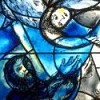
Hebrew Study Card
In light of the full counsel of God given in our Scriptures, it is clear, chaverim, that the idea of atonement (כפרה), though adumbrated in the Torah and Nakh, is perfected, completed, and realized in Yeshua our LORD, who is the Center and Source of all true Torah and the perfect expression of the redemptive love of the Father... If you think you are affecting "a good decree" by your teshuvah and religious rituals, you are in serious error. Rabbinical Judaism is not the way to life, friends. A "a good and final sealing" (גְּמַר חַתִימָה טוֹבָה) in God's Book of Life is found only in Yeshua: ῾Ο ἔχων τὸν υἱὸν ἔχει τὴν ζωήν· ὁ μὴ ἔχων τὸν υἱὸν τοῦ θεοῦ τὴν ζωὴν οὐκ ἔχει (1 John 5:21). Therefore give glory to the LORD God of Israel and honor the sacrificial life of his beloved Son (John 5:24). Yom Kippur is a time of great joy for us because of Yeshua's sacrifice as our great High Priest after the order of Malki-Tzedek, where he presented his own blood "behind the veil," and therefore secured everlasting atonement on our behalf at the cross. Because of our connection with Yeshua, we are forever made a part of God's glorious "story of redemption." ἡμεῖς γάρ ἐσμεν ἡ περιτομή, οἱ πνεύματι θεοῦ λατρεύοντες, καὶ καυχώμενοι ἐν χριστῷ ᾽Ιησοῦ, καὶ οὐκ ἐν σαρκὶ πεποιθότες· - "For we are the circumcision, who worship by the Spirit of God and glory in Yeshua the Messiah and put no confidence in the flesh" (Gal. 3:3). Blessed be the Name of Yeshua forever and ever...
Do I seek to please men? God forbid that I should boast in anything other than the Messiah Yeshua and him crucified for our atonement (Gal. 1:10; Gal. 6:14; 1 Cor. 2:2; Phil. 3:3). Amen, the Cross of Messiah is the holy of holies for the heart of faith...
Sacrifice and Healing...

[ Yom Kippur, or the "Day of Atonement," begins Tuesday Oct. 8th at sundown this year. ]
10.07.19 (Tishri 8, 5780) The Bible has been described as a "book of blood and a bloody book." The recurrent theme of the sacrificed lamb reappears throughout, including the very first sacrifice in the garden to cover the sin of Adam and Eve (Gen. 3:21); the lamb sacrificed in place of Isaac during the ordeal of the Akedah (Gen. 22:13), the sacrifice of the Passover lamb on the eve of the Exodus (Exod. 12:5-8); and the tamid (daily) offering of the lamb at the Temple (Exod. 29:38; Num. 28:3; Ezek. 46:13) -- all of which prefigured the sacrificial death of Messiah as the "Lamb of God" (שֵׂה הָאֱלהִים) who takes away the sins of the world (John 1:29). Yeshua is the Substance of all that the sacrifices foreshadowed; he is the Goel (i.e., גּאֵל, Redeemer) from the alienation and exile caused by our sin (Gal. 3:13). All priase belongs to Him: "Worthy is the Lamb who was slain, to receive power and wealth and wisdom and might and honor and glory and blessing!" (Rev. 5:12).
The Torah makes it clear that blood (דָּם) is used as a means of consecration as well as a means of obtaining atonement (כַּפָּרָה) with God. Blood was used on the doorposts of the houses in Egypt to ward off judgment and was later used to ratify the covenant given at Sinai (Exod. 24:8). All the elements of Mishkan (Tabernacle) were likewise "separated" by its use: The altar, the various furnishings of the Temple, the vestments of the priests, and even the priests themselves were sanctified by blood (Exod. 29:20-21, Heb. 9:21). But ultimately blood was used to "make atonement" for the soul upon the altar. As the Torah (Lev. 17:11) plainly states: "For the life of the flesh is in the blood (כִּי נֶפֶשׁ הַבָּשָׂר בַּדָּם), and I have given it for you on the altar to atone (לְכַפֵּר) for your souls, for it is the blood that makes atonement by the life (כִּי־הַדָּם הוּא בַּנֶּפֶשׁ יְכַפֵּר)." Blood is therefore connected to the holiness of life through sacrificial death....
The first time the word "blood" occurs in the Scriptures concerns the death of Abel (הֶבֶל), the son of Adam and Eve who was murdered by his brother Cain. After Abel's blood was shed, the LORD confronted Cain and said, "What have you done? The voice of your brother's blood (קוֹל דְּמֵי אָחִיךָ) is crying to me from the ground" (Gen. 4:10). Since blood is the carrier of life, it bears the energy and vitality of life: it has its own spiritual "voice." Likewise, the blood of Yeshua (דְּמֵי יֵשׁוּעַ), the true Lamb of God who died upon the cross, speaks on our behalf, and reverses the power of death by creating a barrier that death can no longer cross, since the death of the sacrificial victim "exchanges" the merit and power of life. Unlike the blood of Abel that "cries out" for justice, the blood of Yeshua cries out for mercy (Heb. 12:24).
Note: For more on this important topic, see "Parashat Vayikra: Why the Sacrifices?" and "The Life is in the Blood: Further Thoughts on Parashat Bo."
Yom Kippur and Joy...

10.07.19 (Tishri 8, 5780) Yom Kippur, or the "Day of Atonement," is a time to celebrate our salvation in Messiah; it is a time to honor the wonder of our atonement, namely, that God has "blotted out the handwriting of ordinances that was against us, which was contrary to us, and took it out of the way, nailing it to his cross" (Col. 2:14). Because of the mesirat nefesh (sacrificial mediation) of Yeshua, the record of debt incurred by our sin has been paid in full. Yom Kippur reminds us that Yeshua "redeemed us from the curse of the Law being made a curse for us" (Gal. 3:13). God publicly displayed Yeshua at his death as the "mercy seat" (i.e., kapporet: כַּפּרֶת) made accessible through faith (Rom. 3:25). The LORD gave up His life so that we can be in relationship with Him, that is, so that we can be "at-one" with His heart for us. Whatever else it may mean, then, the word "atonement" (i.e., kapparah, "covering," "protection," "purification," "forgiveness") is about accepting God's heart for you - being unified in his love - and if you miss that, you've missed the entire point of the High Holiday season. Above all, then, Yom Kippur, is a time to celebrate God's great love for us.
בָּרוּך אַתָּה יהוה
הַנּוֹתֵן הַכָּפָּרָה הַגְּדוֹלָה בְּיֵשׁוּעַ
ba-rookh · a-tah · Adonai
ha-no-tein · ha-ka-pa-rah · ha-ge-do-lah - be-ye-shoo'-a


"Blessed are You, LORD,
Giver of the great atonement in Yeshua."
Yom Kippur and Prophecy...

10.07.19 (Tishri 8, 5780) Some people might feel a certain amount of ambivalence about the holiday of Yom Kippur since it focuses on the purification of the sanctuary of the Temple, and this seems to have little to do with Yeshua and His sacrifice for our sins. After all, the Levitical system of worship is described in the New Covenant as "a shadow (σκιά) of the good things to come, instead of the true form (εἰκών) of these matters, and it can never, by the same sacrifices that are continually offered every year, make perfect those who draw near" (Heb. 10:1). Since the blood of bulls and goats cannot truly take away sins (Heb. 10:3), the sacrificial system was intended to foreshadow the coming work of Messiah, who was born to die, in accordance with God's will, and to offer his own body as a sacrifice for sin "once for all" (Heb. 10:5-10). "For by a single offering (μιᾷ γὰρ προσφορᾷ τετελείωκεν) he has perfected for all time those who are being sanctified" (Heb. 10:14).
Now while it is gloriously true that Yeshua functioned as our great High priest after the order of Malki-Tzedek by offering his blood upon the heavenly kapporet in the holy of holies "made without hands," there still is a prophetic component to this holiday that applies to ethnic Israel regarding the prophesied End of Days. After all, the realm of "shadows" still applies in the case of unbelieving Israel, who has yet to behold the unveiled glory that awaits her... Therefore the psalmist prophetically cries out, "Help us, O God of our salvation, for the glory of your Name; deliver us, and atone for our sins, for the sake of your Name" (Psalm 79:9), and this refers to the hour when Israel will call upon the LORD for salvation during the End of Days, otherwise called the great Day of the LORD. This event is prefigured in the blast of the "great shofar" which will be sounded to announce Yeshua as Israel's true Redeemer and King. Indeed, our the Messiah will one day return to Israel, cleanse her Temple, restore her to Himself, and set up His glorious kingdom.
 |
Since prophetically speaking Yom Kippur signifies ethic Israel's atonement secured through Yeshua's sacrificial avodah as Israel's true High Priest and King, there is still a sense of longing and affliction connected to this holiday that will not be removed until finally "all Israel is saved" (Rom. 11:26). So, on the one hand we celebrate Yom Kippur because it acknowledges Yeshua as our High Priest of the New Covenant, but on the other hand, we "have great sorrow and unceasing anguish in our hearts" for the redemption of the Jewish people and the atonement of their sins (Rom. 9:1-5; 10:1-4; 11:1-2, 11-15, 25-27). In the meantime, we are in a period of "mysterious grace" wherein we have opportunity to offer the terms of the New Covenant to people of every nation, tribe and tongue. After the "fullness of the Gentiles" is come in, however, God will turn His full attention to fulfilling His promises given to ethnic Israel. May that great Day of the LORD come soon, chaverim...
Ha'azinu - Prophetic Song of Moses...
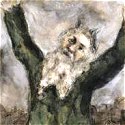
10.06.19 (Tishri 7, 5780) In last week's Torah portion (i.e., Vayeleich), Moses finished his long address to the people of Israel and commissioned Joshua to be his successor. The LORD then foretold that after Moses' death the Israelites would "whore after foreign gods" and break covenant with Him. In light of this, Moses was instructed to teach the Israelites a great prophetic song called the "Ha'azinu." This week's portion provides the words of this song, which foretells of Israel's history (past, present, and the future redemption) and that warns the people not to stray from the path that God had commanded. Structured in the form of an "oracle," the Ha'azinu contains Moses' final words of prophecy given to the Israelites before he ascended Mount Nebo to die.
The oracle begins by declaring the righteousness of God. Moses reminded the people of all that God had done for them and then foresaw all the great gifts they would enjoy as God's chosen nation in the promised land. However, instead of thanking God for all these gifts, Moses foresaw that the people would "grow fat" and forsake the LORD for various "no-gods." This would cause God's anger to burn, and Israel's apostasy would eventually lead to defeat at the hand of their enemies and to eventual exile. All the various curses listed earlier in the covenant would then come upon the people: "I will heap disasters upon them; I will spend my arrows on them; they shall be wasted with hunger, and devoured by plague and poisonous pestilence." Indeed, God would have entirely destroyed the Jewish people were it not for His reputation among the nations, lest they should say, "Our hand is triumphant, it was not the LORD who did all this."
Ultimately, however, God will vindicate his justice and mercy before heaven and earth by saving Israel from her enemies and atoning for all her sins. The song ends, "Cry out, O nations, with his people, for he will avenge his servants' blood; he will take vengeance against his enemies, and will atone for his land and his people."
After Moses recited the words of this song, he encouraged the people to take the words of his prophecy to heart and to teach them diligently to their children. "For it is no empty word for you, but your very life, and by this word you shall live long in the land." The portion ends with Moses ascending Mount Nebo so that he could see the Promised Land before he died.
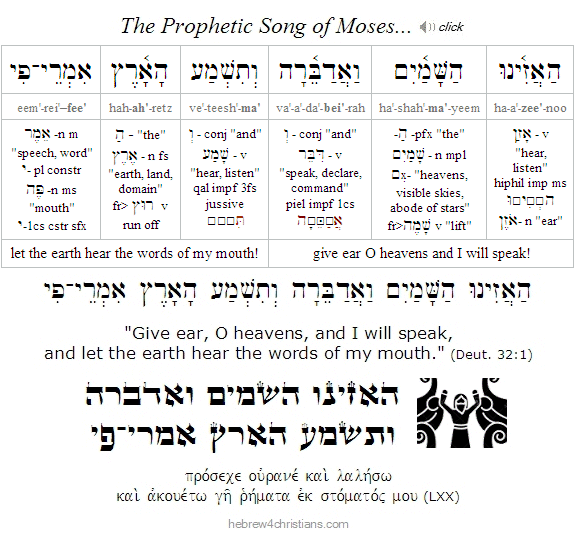 |
We read the Ha'azinu every year near the High Holidays, either just before or just after Yom Kippur. In the Sefer Torah (Torah Scroll), the prophetic song is written in a stylized two-column format with extra spaces. Each line of the shirah (song) is matched by a second, parallel unit (Talmud: Shabbat 103b).
The Ha'azinu reminds us that who we listen to ultimately decides our fate. It begins, "Give ear, O heavens (הַאֲזִינוּ הַשָּׁמַיִם), and I will speak, and let the earth hear (וְתִשְׁמַע הָאָרֶץ) the words of my mouth" (Deut. 32:1). The word ha'azinu (הַאֲזִינוּ) comes from verb azan (אָזַנ), as does the Hebrew word for "ear" (i.e., ozen: אזֶן). The Midrash Rabbah says that the ear (אזֶן) gives life to all the organs of the body. How so? By listening (שׁמע, shema) to the Torah. This idea is repeated in the New Testament: "Faith comes from listening to the Word of God" (Rom. 10:17). The Word of God (דְּבַר־אֱלהִים) is our very life, friends...
Personal Note: Thank you for remembering me in your prayers, friends, as they are especially needed at this time due to some health concerns. Shalom.
Trust from the Heart...

10.04.19 (Tishri 5, 5780) "Trust in the LORD with all your heart, and do not rely on your own understanding" (Prov. 3:5). Note the contrast between trusting and understanding in this familiar verse. Trust is a matter of heart, the decision to let go, whereas understanding is analytical, "objective," a matter of physical seeing. Human reason may help you discern the "what" of faith, but it is powerless to waken the soul, to breath life into heart, and to impart passion to seek God's Presence as your greatest need and your utmost good. That only comes through the painful awareness of your own sinful condition, the inner conviction that you are utterly undone and without hope apart from the intervention of God in your life, and the will to believe in the miracle...
בְּטַח אֶל־יְהוָה בְּכָל־לִבֶּךָ
וְאֶל־בִּינָתְךָ אַל־תִּשָּׁעֵן
be·tach · el · Adonai · be·khol · lee·be·kha
ve·el · bee·na·te·kha · al · teesh·shah·ein

"Trust in the LORD with all your heart
and do not rely on your own understanding"
(Prov. 3:5)
Hebrew Study Card

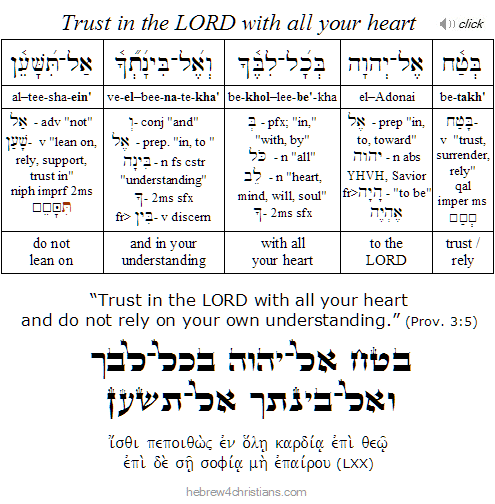
Most commandments do not test how we comprehend our faith as much as they test the surrender of our heart. The test of faith requires bittachon (בִּטָּחוֹן) - that is, abandoning our need to understand so that we can hold fast to God's promise and blessing... "Fear not, for I am with you..." אַל־תִּירָא כִּי עִמְּךָ־אָנִי. That's what we need most, to trust that we are safe in God's love, and that's the ultimate message of our atonement in Messiah.
Shabbat Shuvah Shalom, friend...
Essence of Yom Kippur...

10.04.19 (Tishri 5, 5780) The earthy Tabernacle (i.e., Mishkan) and its furnishings were "copies" of the heavenly Temple and the Throne of God Himself. Moses was commanded to make the Sanctuary according to the "pattern" revealed at Sinai (Exod. 25:9). As it is written in our Scriptures, "For Messiah has entered, not into holy places made with hands, which are representations (ἀντίτυπος) of the true things, but into heaven itself, now to appear in the presence of God on our behalf" (Heb. 9:24). The centermost point of the earthly Tabernacle was the Ark of the Covenant (אֲרוֹן־הַקּדֶשׁ), a "three-in-one" box that contained God's Holy Word (i.e., the tablets of the Torah). As such, the Ark served as a symbol of kisei ha-kavod (כִּסֵּא הַכָּבוֹד), the Throne of Glory. The Ark stood entirely apart as the only furnishing placed in the "three-in-one" space called the Holy of Holies (קדֶשׁ הַקֳּדָשִׁים). Upon the cover of the Ark (i.e., the kapporet) were fashioned two cherubim (i.e., angel-like figures) that faced one another (Exod. 25:17-18). According to the Talmud (Succah 5b), each cherub had the face of a child - one boy and one girl - and their wings spread heavenward as their eyes gazed upon the cover (Exod. 25:20). This was the sacred place where the blood of purification was sprinkled during Yom Kippur, the Day of Atonement, and this is the Place (הַמָּקוֹם) that prefigured the offering of the blood of the Messiah, our eternal Mediator of the New Covenant. "For I will appear in the cloud over the kapporet" (Lev. 16:2; Exod. 25:22). As it is written, "I have blotted out as a dark cloud your transgressions, and as a cloud your sins; return to me (שׁוּבָה אֵלַי), for I have redeemed you (Isa. 44:22).
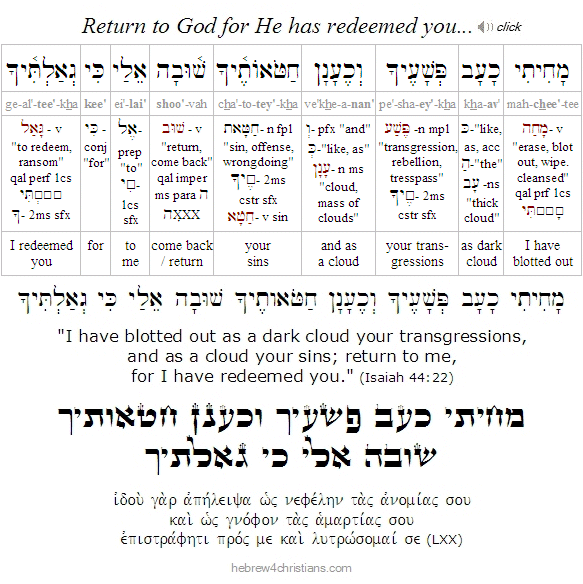 |
The central ritual of atonement given in the Torah is that of the anointed High Priest sprinkling sacrificial blood over the tablets of the law upon the kapporet (the "mercy seat") of the Ark of the Covenant - the Place where "Love and truth meet, where righteousness and peace kiss" (Psalm 85:10). It was from the midst of the surrounding cloud in the Holy of Holies that the Voice of the LORD was heard, just as it was in the midst of the surrounding cloud of darkness upon the cross that Yeshua cried out in intercession for our sins...
Note further that the High Priest was required to perform the Yom Kippur avodah (service) alone, while wearing humble attire, divested of his glory, and in complete solitude: "No one may be in the tent of meeting from the time he enters to make atonement in the Holy Place until he comes out" (Lev. 16:17). The Hebrew text literally says, "no adam (אָדָם) shall be in the tent," which suggests that something more than the natural man is needed for divine intercession. And just as Moses alone approached God in the thick clouds at Sinai to receive the revelation of the Altar as mediator of the older covenant (Exod. 24:15), so Yeshua, the Mediator of the New Covenant, went through his severest agony on the cross as the darkness covered the earth (Luke 23:44; Matt. 27:45).
"But when the Messiah appeared as Kohen Gadol (High Priest) of the good things that were to come, then, through the greater and more perfect tabernacle which is not man-made (that is, it is not of this created world), he entered the Most Holy Place (קדֶשׁ קָדָשִׁים) once and for all. And he entered not by means of the blood of goats and calves, but by means of his own blood, thus securing eternal redemption (גְּאוּלַּת עוֹלָם) for us.... Therefore he is the Mediator of a new covenant (המתווך של הברית החדשה), so that those who are called may receive the promised eternal inheritance (נַחֲלַת עוֹלָם), since a death has occurred that redeems them from the transgressions committed under the first covenant" (Hebrews 9:11-12,15).
Yom Kippur Mercies...
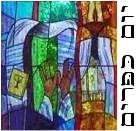
10.04.19 (Tishri 5, 5780) Rosh Hashanah is called Yom Ha-Din (יוֹם הַדִּין), the Day of Judgment, whereas Yom Kippur is called Yom Ha-Rachamim (יוֹם הָרַחֲמִים), or the Day of Mercies, which suggests that God is first revealed as our Creator and Judge before He is known as our merciful Savior. This is hinted in the two accounts of creation, where God is first revealed as Elohim (Gen. 1:1), but later is revealed as YHVH (יהוה) when He breathed life into man nishmat chayim, the breath of life (Gen. 2:4). It is somewhat odd, however, that during Rosh Hashanah we do not approach God as our Judge, beating our breast in sorrow during confession of sin, as we do on Yom Kippur. Some say the reason we celebrate, eating special foods, rejoicing, listening to the shofar, is because we rejoice in the kingship of God as His royal children, and only later do we appeal to Him as merciful Judge in light of His revelation as YHVH, our Savior, Redeemer, and Lord. As believers in Yeshua, we have all the more reason to rejoice on Rosh Hashanah, since at the cross Yeshua took upon Himself our judgment to give us everlasting mercy from God. !הַלְלוּ־יָהּ
חֶסֶד־וֶאֱמֶת נִפְגָּשׁוּ
צֶדֶק וְשָׁלוֹם נָשָׁקוּ
che'·sed ve·e·met neef·ga'·shoo
tze'·dek ve·sha·lom na·sha'·koo

"Love and truth have met,
justice and peace have kissed."
(Psalm 85:10)

Teshuvah and Sanity...

10.04.19 (Tishri 5, 5780) It is written in our Scriptures (2 Tim. 1:7) that "God has not given us the spirit of fear (πνεῦμα δειλίας), but of power, and love, and a sound mind" (note that the term "sound mind" comes from the word saos (σάος) "safe," or under the protective restraining influence of the Spirit of God). Understand the connection between fear and confusion, then, and note further the connection between having a sound mind and a heart of peace and courage (Isa. 32:17)... A fearful or shameful attitude, then, enervates your resolve, quells your love, and introduces pain to your thinking. It is the old ruse of the enemy of our souls to lead us to despair, the exile of shame, and cruel bondage to untruth. As always the answer is the same: namely, teshuvah, turning to God and embracing the grace and love given in Yeshua as our deepest reality, our power, our heart, and our mind.
אֵלֶיךָ יְהוָה נַפְשִׁי אֶשָּׂא
אֱלהַי בְּךָ בָטַחְתִּי אַל־אֵבוֹשָׁה
אַל־יַעַלְצוּ איְבַי לִי
e·ley·kha · Adonai · naf·shee · es·sah
E·loh·hai · be·khah · va·tach·tee · al · ei·voh·shah
al · ya·a·le·tzoo · oy·ye·vai · lee

"Unto thee, O LORD, do I lift up my soul.
O my God, I trust in thee: let me not be ashamed,
let not mine enemies triumph over me."
(Psalm 25:1-2)
Yom Kippur - Day of Atonement

[ This year the Yom Kippur fast begins an hour before sundown on Tuesday, October 8th and lasts until an hour past sundown the following day.... ]
10.04.19 (Tishri 5, 5780) Yom Kippur (יוֹם הַכִּפּוּרִים), or the "Day of Atonement(s)," is regarded as the holiest day of the Jewish year, and provides prophetic insight regarding the Second Coming of the Messiah, the restoration of national Israel, and the final judgment of the world. It is also a day that reveals the High-Priestly work of Yeshua as our Kohen Gadol (High Priest) after the order of Malki-Tzedek (Heb. 5:10, 6:20). The term Yom Kippur is written in the plural in the Torah, Yom Ha-Kippurim (יוֹם הַכִּפֻּרִים), which alludes to the two great atonements given by the LORD - the first for those among all the nations who turn to Yeshua for cleansing and forgiveness, and the second for the purification of ethnic Israel during Yom Adonai, the great Day of the LORD (יוֹם־יְהוָה הַגָּדוֹל) at the End of Days.
For more information, see the Yom Kippur pages.
Teshuvah of Brokenness...
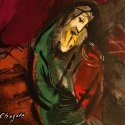
10.04.19 (Tishri 5, 5780) Regarding the call to do teshuvah the LORD appeals: "Come back to me with all your heart (בְּכָל־לְבַבְכֶם) - with fasting, with weeping, and with mourning - and rend your hearts and not your garments, and return to the LORD your God (וְשׁוּבוּ אֶל־יְהוָה אֱלהֵיכֶם), for he is gracious and merciful, slow to anger, and abounding in love..." (Joel 2:13). Genuine teshuvah (repentance) is not about the "outer layers" of life, but engages the deepest depths of heart; it is not expressed in religious practices or rituals but in personal brokenness and utter desperation... As King David said, "the sacrifices of God are a broken spirit (רוּחַ נִשְׁבָּרָה); a broken and contrite heart (לֵב־נִשְׁבָּר וְנִדְכֶּה), O God, you will not despise" (Psalm 51:17). As is written in our Haftarah portion for Shabbat Shuvah: "Return O Israel (שׁוּבָה יִשְׂרָאֵל), to the LORD your God, for you have stumbled because of your iniquity; take with you words and return to the LORD (וְשׁוּבוּ אֶל־יְהוָה) and say to him, 'Take away all iniquity; accept what is good, and we will pay with bulls the vows of our lips'" (Hos. 14:1-2).
Note that the appeal to the LORD as "gracious and merciful, slow to anger, and abounding in steadfast love" (חַנּוּן וְרַחוּם הוּא אֶרֶךְ אַפַּיִם וְרַב־חֶסֶד) recalls the meaning of YHVH (יהוה) revealed to Moses in his state of brokenness over the sin of the Golden Calf (Exod. 34:6-7).
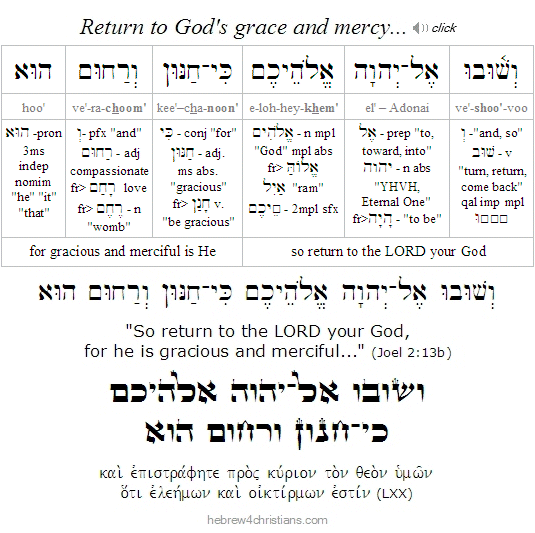 |
Yom Kippur and Chesed...

10.03.19 (Tishri 4, 5780) The ten days from Rosh Hashanah through Yom Kippur are known as Aseret Yemei Teshuvah (עֲשֶׂרֶת יְמֵי תְּשׁוּבָה), "the Ten Days of repentance," otherwise called the "Days of Awe" (yamim nora'im) in Jewish tradition. Since man was created for the sake of teshuvah, Yom Kippur, or the Day of "at-one-ment," is considered the holiest day of the year, called "Yom ha-kadosh" (יוֹם הַקָּדוֹשׁ). It is the climax of the 40 day "Season of Teshuvah."
As I've mentioned before, the "Day of Atonement," or Yom Kippur, is actually described in the plural: Yom Ha-Kippurim (יוֹם הַכִּפֻּרִים), perhaps because the purification process cleansed from a multitude of transgressions, iniquities, and sins. However, the name also alludes to the two great atonements given by the LORD God of Israel - the first for those among all of the nations who turn to Yeshua for cleansing and forgiveness, and the second for the purification of ethnic Israel during Yom Adonai, the great Day of the LORD (יוֹם־יְהוָה הַגָּדוֹל) at the end of days. There is a connection with the holiday of Purim, too, since Kippurim can be read as Yom Ke-Purim, a "day like Purim." Thus the day on which Yeshua sacrificed Himself on the cross is the greatest Purim of all, since through His loving intervention we are eternally delivered from the hands of our enemies...
The "Sabbath of Sabbaths" (שבת של שבת)
The Torah refers to Yom Kippur as "shabbat shabbaton" (שַׁבַּת שַׁבָּתוֹן), a time when all profane work is set aside so the soul could focus on the holiness of the LORD. The first occurrence of this phrase is found in Exodus 16:23, regarding the restriction of collecting manna in the desert during the seventh day. This restriction was later incorporated into the law code for the Sabbath day (Exod. 31:15; 35:2). The phrase also occurs regarding Rosh Hashanah (Lev. 23:24), Yom Kippur (Lev. 16:31; 23:32), two days of Sukkot (Lev. 23:39; Num. 25:35), two days of Passover (Lev. 23:7-8), and the day of Shavuot (Num. 28:26).
If you add up these days, you will find there are seven prescribed days of "complete rest" before the LORD, and the sages identified Yom Kippur as the Sabbath of these other special Sabbath days, that is, "Yom ha-kadosh" (יוֹם הַקָּדוֹשׁ), which occurs on the tenth day of the seventh month of the Torah's holiday calendar. Indeed, the Talmud notes that "seven days before Yom Kippur, we separate the High Priest," corresponding to the seven-day seclusion of Aaron and his sons before the inauguration of the Tabernacle (Lev. 8:33).
All of the Jewish holidays find their origin in the events of the Exodus, which were later commemorated as rituals at the Tabernacle. On the first of Nisan, two weeks before the Exodus, the LORD showed Moses the new moon and commenced the divine lunar calendar. This is called Rosh Chodashim. Two weeks later, God was ready to deliver the Israelites from their bondage in Egypt. Earlier that evening the Israelites kept the Passover Seder and sprinkled the blood of the lamb on their doorposts. At the stroke of midnight of Nisan 15 the LORD sent the last of the ten plagues on the Egyptians, killing all their firstborn. On the 6th of Sivan, exactly seven weeks after the Exodus (49 days), Moses first ascended Sinai to receive the Torah (Shavuot). Just forty days later, on the 17th of Tammuz, the tablets were broken. Moses then interceded for Israel for another forty days until he was called back up to Sinai on Elul 1 and received the revelation of Name YHVH (Exod. 34:4-8). After this, he was given the Second Tablets and returned to the camp on Tishri 10, which later was called Yom Kippur. Moses' face was shining with radiance in wonder of the coming New Covenant which was prefigured in the rituals of the Day of Atonement (Exod. 34:10).

Recall that there were two revelations of the Name YHVH, first as "I AM WHO I AM" (a play on the Hebrew verb hayah [הָיָה] given to Moses in Exodus 3:14-15 which was later "incarnated" during the intervention of the Exodus (Exod. 6:1-8)), and the later revelation of YHVH's mercy disclosed after the sin of the Golden Calf (Exod. 34:6-7). It is the later revelation that foretold God's Name of the new covenant, just as the second tablets took the place of the former tablets that were shattered. Ultimately Yeshua is the "wonder" of the covenant of the LORD (Exod. 34:10), the manifestation of the attributes of God's mercy (middot rachamim). For more on this topic see the article, "Yom Kippur and Chesed."
Atonement and Healing...

[ The holiday of Yom Kippur (Day of Atonement) begins Tuesday, October 8th at sundown... ]
10.03.19 (Tishri 4, 5780) Atonement is about righting the wrong that separates us from God, repairing the breach caused by our sin, and being healed from the curse of death. We all desperately need this healing, yet our own hearts are the source of the trouble (Matt. 15:19-20). The holiness and justice of God (אלהִים) requires that sin be punished by death, but God is also merciful and gracious (יהוה), and therefore He instituted a system of animal sacrifices and blood rituals to provisionally "atone" for sin (i.e., restore the broken relationship with God). Since the life of the flesh is in the blood (Lev. 17:11), and the penalty for sin is death, the shedding of blood represents atonement (i.e., kapparah: כַּפָּרָה) for sin. With regard to the chatat ("sin offering") or asham ("guilt offering"), a person would bring a kosher animal (korban) to the entrance of the Tabernacle and place both hands on the animal's head to identify with it (Lev. 4:29). This act of "semikhah" (סְמִיכָה) symbolically (i.e., ritually) transferred the penalty of sin and guilt to the sacrificial animal. Then, the person would slay the animal and confess that his sin caused the innocent to be slain in his place (Menachot 110a). The elaborate sacrificial system was intended to depict this "life-for-life" principle: God accepted the blood of a sacrifice in exchange for the life of the sinner...

The sacrificial system of the Tabernacle (and later the Temple) was a temporary arrangement until the coming of Messiah, the Promised Deliverer (Gal. 3:24-25; Rom. 10:4; Heb. 9:1-12). The redemption obtained by animal sacrifices was merely provisional and symbolic, "for it is impossible for the blood of bulls and goats to take away sins" (Heb. 10:4). For eternal remedy, for the spiritual life of the soul, something far greater was needed, namely, the sacrifice of God Himself. Consequently, when Yeshua came into the world, he said, "Sacrifices and offerings you have not desired, but a body have you prepared for me," and "'Behold, I have come to do your will, O God, as it is written of me in the scroll of the book" (Heb. 10:5,7). All this is profoundly mysterious, of course. After all, if the Kohen Gadol (High Priest) could enter the Holy of Holies only once a year to present sacrificial blood upon the kapporet, invoking the Divine Name YHVH, and interceding for God's mercy on behalf of the people, how much more mysterious is Messiah's intercession for us as he willingly shed his own blood and died in exchange for the curse of our sins (Gal. 3:13)? It was there - in the true Holy of Holies, the "greater and more perfect tabernacle not made with hands" (Heb. 9:11), where the blood of Yeshua was poured out to pay the penalty for our sins, and it was there that we are given eternal life and healing (2 Cor. 5:21). Yeshua is the true Temple of God and the Central Sacrifice of God given on our behalf. In ways we simply cannot fathom, the sacrificial death of Yeshua redeems us from the curse of death and makes us alive together with God. We draw near to God through Him alone; he alone is the true High Priest of God, the One who finishes the work of redemption on our behalf in the Temple of his body...
Beware those who would entice you to return to the terms of the covenant at Sinai (Gal. 3:1). The New Testament teaches that Yeshua came to die "for our sins," to heal us from the plague of spiritual death (Heb. 7:27, 9:26; 1 John 3:5). Our sin separates us from God, but Messiah's sacrifice draws us near (Heb. 7:19). The message of the gospel is that the Voice of the LORD - the very Word spoken from between the cherubim above the kapporet (mercy seat) - "became flesh" (ὁ λόγος σὰρξ ἐγένετο) and "tabernacled among us" (ἐσκήνωσεν ἐν ἡμῖν) for the purpose of becoming our substitutionary sacrifice for the guilt and defilement caused by our sins (John 1:1,14). Yeshua was "born to die" (Heb. 10:5-7), and his life was lived in relation to His sacrificial death (Mark 8:27-33). As the Apostle Paul put it: This is of "first importance": Yeshua was born to die for our sins, to make us right with God, and was raised from the dead to vindicate the righteousness of God (1 Cor. 15:3-4). His sacrificial death eternally draws us near to God, and we can come boldly before God's Presence on the basis of His shed blood for our sins...
 |
The sacrificial system of Torah functions as a parable for us, or a metaphor of God's great redemptive plan revealed in the life and death of Yeshua. The Mercy Seat (kapporet) represents both the Throne of God (Heb. 4:16; 2 Kings 19:15) as well as the cross of Yeshua, where propitiation for our sins was made (Rom. 3:25). The glory of the Torah of Moses was destined to fade away (2 Cor. 3:3-11), just as its ritual center (i.e., the Tabernacle/Temple) was a shadow (σκιά) to be replaced by the greater priesthood of Malki-Tzedek (Heb. 10:1; 13:10). Yeshua is the Goal and the "Goel" (i.e., גּאֵל, Redeemer) from the curse of the law (Gal. 3:13). "For the law made nothing perfect, but on the other hand, a better hope is introduced, and that is how we draw near (karov) to God" (Heb. 7:19). The sacrificial death of Yeshua caused the parochet of the Temple to be torn asunder, revealing that access to the Presence of God is now available for all who come to God trusting in the finished work of God's Son.
For more on this, see "Why the Sacrifices?" and "Yom Kippur and the Gospel."
Yeshua and Rosh Hashanah...
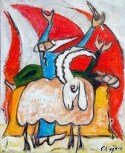
10.03.19 (Tishri 4, 5780) As I've mentioned over the years, the word "love" (i.e., ahavah) first appears in the Torah regarding Abraham's passion for his son: "Take your son, your only son Isaac, whom you love (אֲשֶׁר־אָהַבְתָּ), and go to the land of Moriah, and offer him there as a burnt offering on one of the mountains of which I shall tell you" (Gen. 22:2). After journeying three days to the designated place, Abraham told his son that God himself would provide a lamb (אֱלהִים יִרְאֶה־לּוֹ הַשֶּׂה), and then bound Isaac, laid him upon an altar, and raised his knife to slay him (Gen. 22:8-10). At the very last moment, the Angel of the Lord called out: "Abraham! Abraham! Do not lay your hand on the lad or do anything to him, for now I know that you fear God, seeing you have not withheld your son, your "only son" (בֵּן יָחִיד), from me" (Gen. 22:11-12). Abraham then "lifted up his eyes" and saw a ram "caught in a thicket" which he offered in place of his son. Abraham then named the place Adonai-Yireh (יהוה יִרְאֶה), "the LORD who provides" (Gen. 22:14). The sacrifice of the lamb for Isaac portrayed the coming sacrifice of Yeshua, the great "Lamb of God" (שֵׂה הָאֱלהִים) who would be offered in exchange for the trusting sinner (John 1:29). Indeed the story of how God provided the lamb at Moriah (and later during the Passover in Egypt) foreshadowed the greater redemption given in Messiah at the "Passover cross," and may be understood as the "Gospel according to Moses" (Luke 24:27; John 5:46). Therefore, during Rosh Hashanah, the Day of Judgment (יוֹם הַדִּין), we listen to the sound of the shofar (ram's horn) to remind us of the provision of Lamb of God given in place of Isaac... In other words, Rosh Hashanah is decidedly a holiday that commemorates and celebrates Yeshua our Messiah...
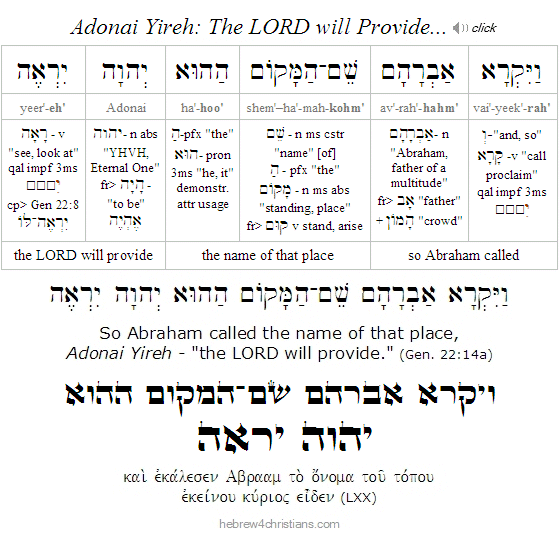 |
L'Shanah Tovah, friends!
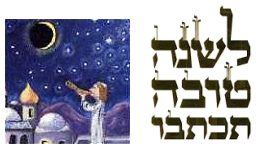
10.02.19 (Tishri 3, 5780) Happy New Year - Shanah Tovah - friends! May this coming year be "good and sweet" for you. Here are a few pictures taken during our celebration for Rosh Hashanah 5780. As you can see, our three sons are growing: Josiah is now 14, Judah is 10, and Emanuel David is now 3 and a half years old! Thank you for praying for our children.
Left-to-right (top): 1. Shanah Tovah bowl; 2. honey dish; 3. pomegranates; 4. apples and honey;
(bottom): 1) Emanuel David; 2) simanim plate; 3) Yom Tov plate; 4) scene from the table
Left-to-right (top): 1. seder table; 2. Olga lights candles; 3. kiddush cup; 4. John during kiddush;
(bottom): 1) round challah; 2) Rosh Hashanah simanim plate; 3) rimonim; 4) some "new" fruits
Left-to-right (top): 1. tapuach udvash; 2. simanim service; 3. Vadim and Manny; 4. yom teruah!
(bottom): 1) John with shofar; 2) Manny; 3) Judah; 4) Josiah sounds the shofar
Left-to-right (top): 1. Judah with tallit; 2. Vadim and Sasha; 3. Irina and Judah; 4. Josiah shouts!
(bottom): 1) Peter shouts! 2) Irina and Vadim; 3) Yasha, Veronica, Evnika; 4) Shanah Tovah!
בַּחֲצצְרוֹת וְקוֹל שׁוֹפָר
הָרִיעוּ לִפְנֵי הַמֶּלֶךְ יְהוָה
ba·cha·tzohtz·roht · ve·kohl · sho·far
ha·ree'·oo · leef·nei · ha·me'·lekh · Adonai

"With trumpets and the sound of the shofar
shout for joy before the King, the LORD!"
(Psalm 98:6)

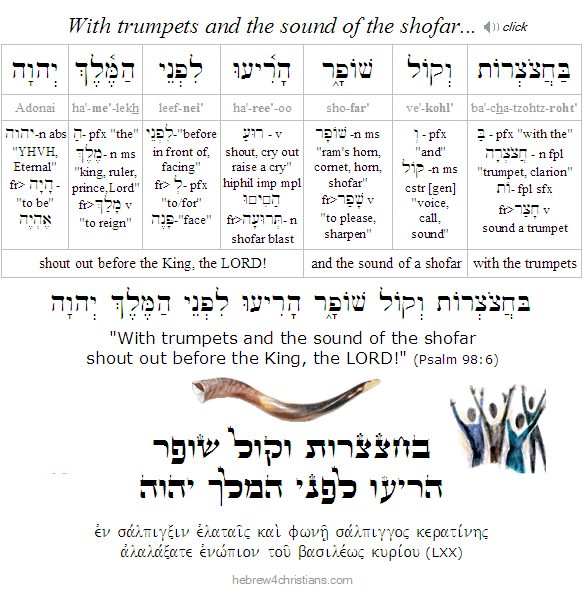
From our family to yours: L'shanah tovah u'metukah ba'Adoneinu Yeshua ha-Mashiach - "to a good and sweet year in our Lord Yeshua the Messiah." May the LORD God heal you, body and soul; may He ease your pain, increase your strength, and release you from all your fears. May the divine blessing, love, joy, and true shalom surround you and fill you with ongoing wonder and thanks. In the Name above all Names we pray: Amen.
Shanah Tovah 5780!
Parashat Vayeilech (פרשת וילך)

[ Our Torah reading for Shabbat Shuvah (שבת שובה) is parashat Vayeilech... ]
10.02.19 (Tishri 3, 5780) In last week's Torah reading (i.e., parashat Nitzavim), Moses formally gathered the people of Israel together to ratify their covenant with the LORD. Moses then pled with the people bacharta ba'chayim - to "choose life" by pursuing the path of obedience to the Torah and its commandments. If the Israelites would do so, they would be blessed and prosper as God's chosen nation; but if not, they would be subjected to hard exile, persecution, and the threat of utter destruction.
In this week's portion (i.e., parashat Vayeilech), Moses announced his impending death and transferred the leadership of the Jewish nation to Joshua (יְהוֹשֻׁעַ), a type of Messiah who would bring Israel into the promised land. Moses continued his speech and foresaw that despite his appeals, the people would turn away from the covenant, which would cause God's face to turn away: "And hiding I will hide My face (הַסְתֵּר אַסְתִּיר פָּנַי) on that day, because of all the evil they have committed" (Deut. 31:18). The sages note this verse is grammatically unusual because of the double use of the word "hide." If you do not know that God is "hiding," you will not seek for Him; but if you sense within your heart that God is hiding, you are invited to return to Him, as King David said, "When you said to my heart, 'Seek my face;' my heart said to You, 'Your face, LORD, will I seek' (Psalm 27:8).
לְךָ אָמַר לִבִּי בַּקְּשׁוּ פָנָי
אֶת־פָּנֶיךָ יְהוָה אֲבַקֵּשׁ
le·kha · ah·mar · lee·bee · ba·ke·shoo · fah·nai
et · pa·ney·kha · Adonai · a·va·keish

[When] you said to my heart, 'Seek my face;'
[my heart said to You], 'Your face, LORD, will I seek.'
(Psalm 27:8)
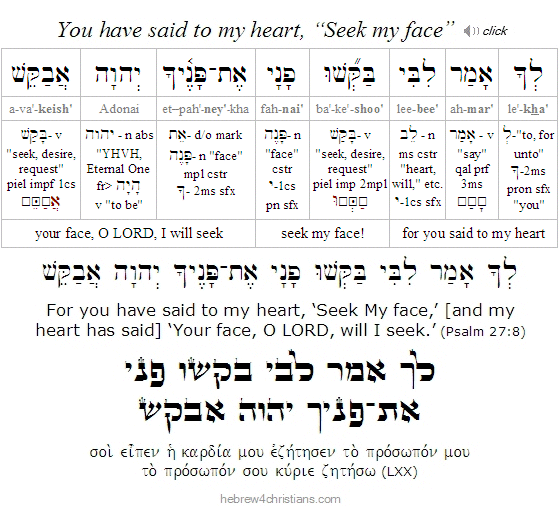
In this connection we note that Yeshua often spoke in the form of a parable (παραβολή) to "code" his meaning, to make it accessible only to those who were genuinely willing to make comparisons, to reason analogically, and so on (Isa. 1:18; 1 Cor. 2:13). He used "indirection," allusion, allegory, and "figures of speech" (παροιμία, lit. "[speech] beyond the usual way"), in order to provoke people to explore and ask the hard questions about life... "Truly, you are a God who hides himself, O God of Israel, the Savior" (Isa. 45:15).
"For God so loved the world" that He disguised himself as a bondservant to die in shame upon a cross; "God so loved the world" that he became entirely unesteemed -- "despised and rejected of men, a man of sorrows, acquainted with grief" (Isa. 53:3). Yet even Moses foresaw the stupor of the people in relation to the truth of God (Deut. 29:4). Regarding the "hiding of face," in His sovereign judgment God decreed: "They know not, nor do they discern, for he has smeared their eyes so that they cannot see, and their hearts, so that they cannot understand" (Isa. 44:18). God "gave them over to their stubborn hearts, to follow their own devices" (Psalm 81:12; Rom. 1:24); they went "backward and not forward" (Jer. 7:24). This was not a blindness induced by the "god of this world" as much as it was a darkness induced by the flesh and its apathy toward God. The mind became dull and sleepy because it ceased to believe in the miracle - and to realize that God's truth is always something extraordinary, spectacular, and wonderful...
Audio Podcast for Vayeilech...
In the "Shavuah Tov" audio broadcast for parashat Vayeilech I discuss both the Jewish High Holidays -- and how they relate to us as followers of Yeshua the Messiah -- as well as the weekly Torah portion for Shabbat Shuvah. I hope you will find it helpful. To a good and sweet year in our Messiah Yeshua!
Tradition and Rosh Hashanah...
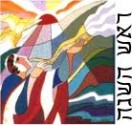
[ The holiday of Rosh Hashanah begins this evening at sundown... ]
10.01.19 (Tishri 2, 5780) Though the term "Rosh Hashanah" does not explicitly occur in the Torah, the start of the 7th month (i.e., Tishri 1) is clearly to be set apart as "Yom Teruah," a day of shofar blowing (see Lev. 23:24-25, Num. 29:1-2). When we consult Jewish tradition for some additional insight about this question, we discover that the sages and great commentators of the Torah universally regarded the number seven as the number of completeness. Just as the seventh day of the week was considered sacred, so too is the seventh month of the year. Therefore the sages reasoned that since each new moon (rosh chodesh) is regarded as a sacred time (see Num. 10:10), it's logical that the seventh new moon (counting from Nisan in the spring) should acquire special sanctity. This conclusion seems especially justified in this case because God directly commanded Israel to sanctify the seventh month as a solemn day of "remembrance and shofar blowing" (זִכְרוֹן תְּרוּעָה). Therefore while it is clear that the new moon of the seventh month is to be observed as "Yom Teruah," it nevertheless has a somewhat "concealed" significance, suggestive of the absence of the moon on that date itself...
Note, however, that the Torah calls the end of the harvest year (in the fall) the "end of the year" (i.e., חַג הָאָסִף בְּצֵאת הַשָּׁנָה, see Exod. 23:16), which implies both the start of a new year and the symmetry of the calendar: the fall festivals "mirror" the spring festivals and correspond to one another. Just as there is a "new year" in the spring, on the new moon of Nisan, so there is in the fall, on the new moon of Tishri, the seventh month... The Psalmist likewise regarded the new moon of the seventh month as especially significant (Psalm 81:3-4). And after the return of the exiles, Ezra the Scribe gathered the people at the Water Gate in Jerusalem on the first of Tishri to read the Torah before the people (see Neh. 8:1-9). Ezra's action may have been the precedent among the later sages for investing Tishri 1 with its distinctive status. That is why we make a "teruah" shout of thanks to God in anticipation of the fulfillment of God's promises and redemptive purposes during the End of Days.
The question about Rosh Hashanah has to do with the authority of Jewish tradition itself. Does the Jewish community have sanction to establish the date of Hebrew calendar? To establish the start of the month? To determine if a year was shemittah (a sabbatical year)? To sound the shofar and declare a Jubilee? According to Moses, the answer is a qualified "yes." After all, it's clear that Moses established judges and courts to determine such matters and to develop case law based on the precepts of the Torah (e.g., see Deut. 16:18). This "chain of authority" was later codified by the sages of the Mishnah, who said it was given by God first to Moses, then Joshua, then to the 70 elders, then to the prophets, and then to Ezra and the men of the Great Assembly (Pirke Avot 1:1). And according to "mainstream" Jewish tradition, Tishri 1 has been established as a "rosh hashanah" from at least the time of the return of the exiles (4th century BC). This is further attested by Flavius Josephus (first century AD) who wrote: "Moses ... appointed Nisan ... as the first month for the festivals ... the commencement of the year for everything relating to divine worship, but for selling and buying and other civil affairs he preserved the ancient order [i. e. the year beginning with Tishri]" (Antiquities 1.81). Even Yeshua Himself endorsed Ezra's division of the Scriptures into the "Law, Writings, and the Prophets" and said that not a "jot or a tittle" (kotzo shel Yod) would pass from the Torah until all was fulfilled (Luke 24:44; Matt. 5:18).
That said, there are undoubtedly a lot of Rabbinical "additions" that have accrued to the holiday over the centuries, especially since the destruction of the Second Temple. Despite this, hovever, let me suggest that many of the traditions of Rosh Hashanah can be genuinely helpful for us. For instance, undergoing self-examination and doing teshuvah are commanded by God and inherently valuable exercises for followers of Yeshua (see Lam. 3:40; Haggai 1:5; Psalm 119:59; Matt. 7:3-5, Gal. 6:3-4, 1 Cor. 11:28, 2 Cor. 13:5, James 5:16, 1 John 1:8-9, etc.). Setting aside 40 days each year to help us turn away from sin is a healing custom, especially if it's done in light of truth of the gospel message. After all, Christians will stand before the Throne of Judgment (kisei ha-din) to give account for their lives to God (see 2 Cor. 5:10). As it is written: "Every man's work shall be made manifest: for the day shall declare it, because it shall be revealed by fire; and the fire shall try every man's work of what sort it is" (1 Cor. 3:13). The foundation of every true work of God comes from trusting in the finished work of Yeshua the Messiah, and the work of our faith will be tested and judged. We have great consolation in our testings, friends: if we are honest with the Lord and appeal to Him for help, He promises to be there for us (Heb. 4:15-16).
For more on this subject, see Is Rosh Hashanah Biblical?
Come just as you are...
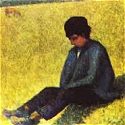
10.01.19 (Tishri 2, 5780) Some people seem to think that we first must repent and then we will encounter the Lord, but it's actually the other way around: we first encounter the Savior and then we learn the meaning of repentance. Thus Paul's eyes were opened after he was first blinded by the light (Acts 9:3-6). Likewise, it is only after we have met the Lord that we begin to understand our own blindness of heart, but as learn to see more clearly, we encounter more and more of his love (Rom. 5:20). As Yeshua said, "My yoke is pleasant (χρηστὸς) and my burden is light (Matt. 11:30). Teshuvah, then, is a progressive and ongoing process of awakening, as we learn to love God and to accept ourselves, despite our struggle with sin. As St. Anselm once prayed: "O Lord, grant us grace to desire thee with all our hearts, that so desiring, we may seek and find thee, and so finding thee, may love thee, and loving thee may hate those things from which you have redeemed us." Amen.
We encounter the Lord "just as we are," by means of his gracious intervention in our lives, and so we continue to live by faith in God's grace (indeed, what we call "sanctification" is often just "catching up" with the miracle of his revelation to us). And we always come to God "just as we are," since we are never more than what we are in the truth: "by the grace of God I am what I am," as Paul said. "For all things come from You, and from your hand we give back to you" (1 Chron. 29:14). Therefore the Spirit says, "Come just as you are, or you may never come at all...."
 |
A prayer to the One calling you to come: "I come to you just as I am - needy, sick within, weary, and broken... I come seeking your love; I come because you invited me to come: I open my heart, such as it is, to you; please join me here, in this place of my need, in this place of pain, and wrap me your comfort. I can only love you as I know your love, Lord Yeshua, so please help me to know your love in the truth. Amen."
|




